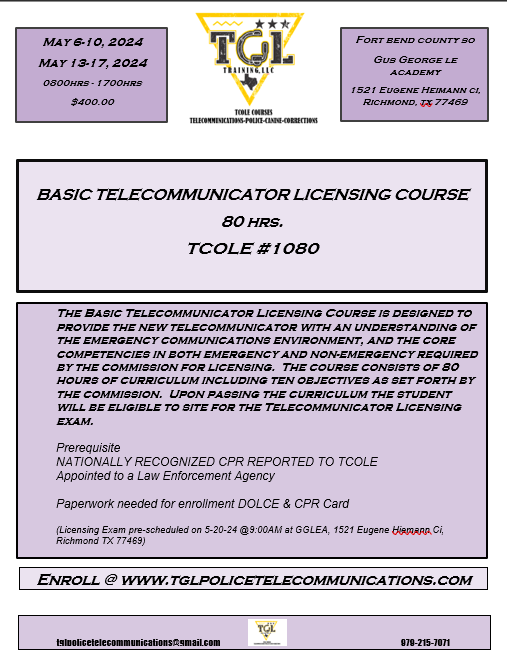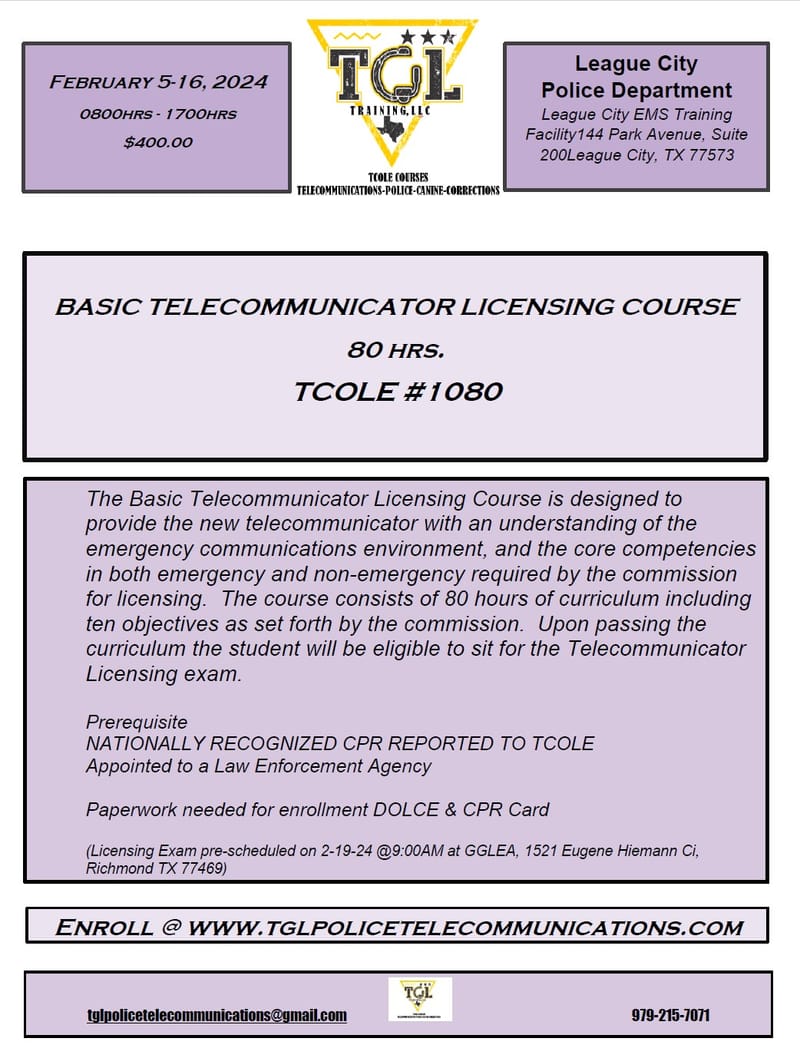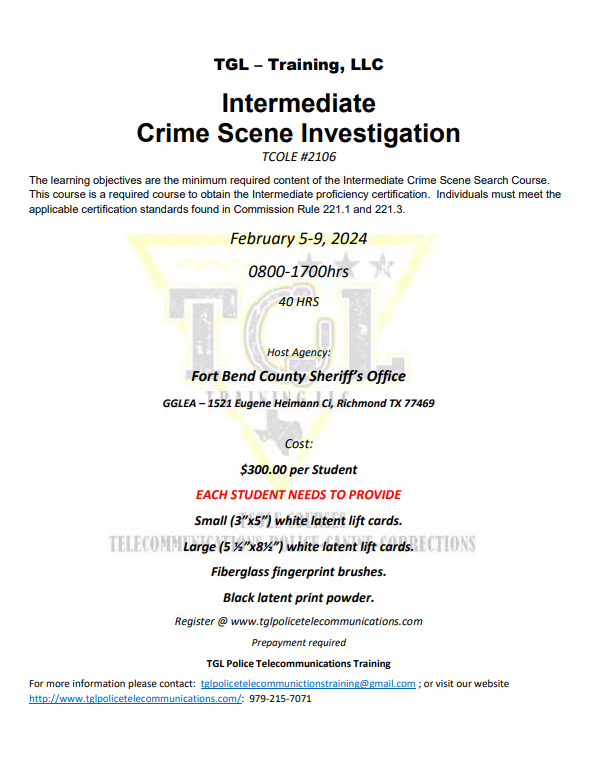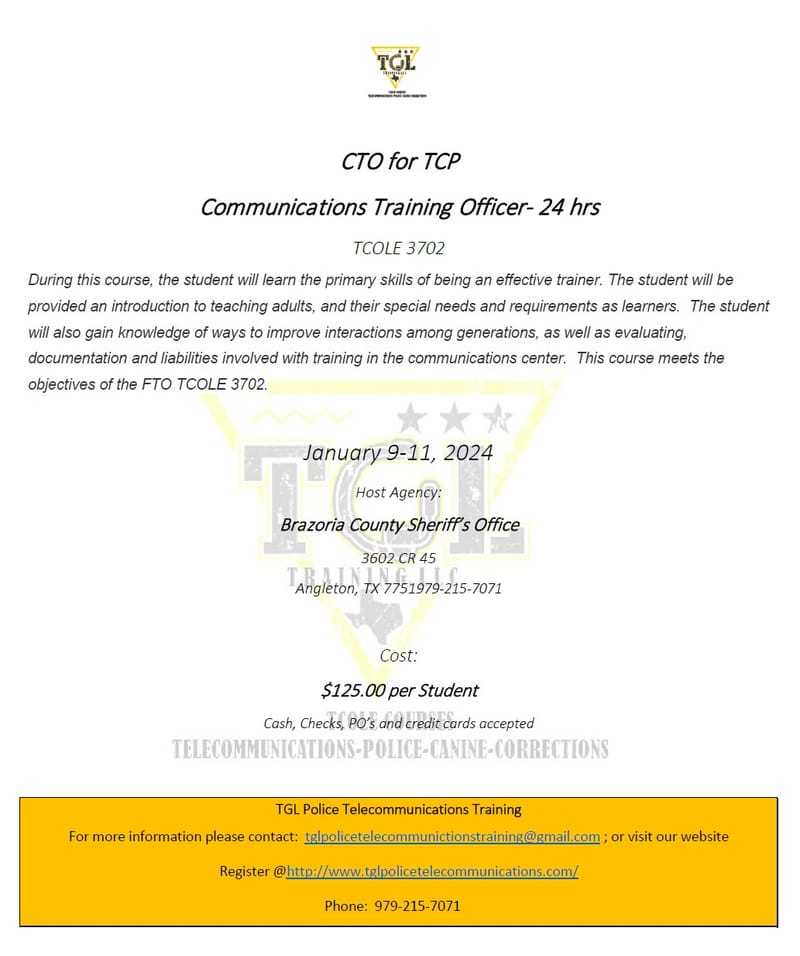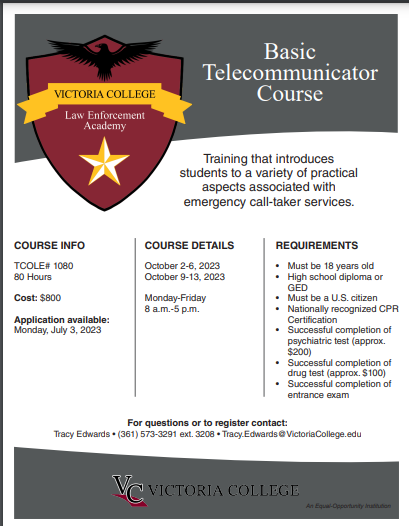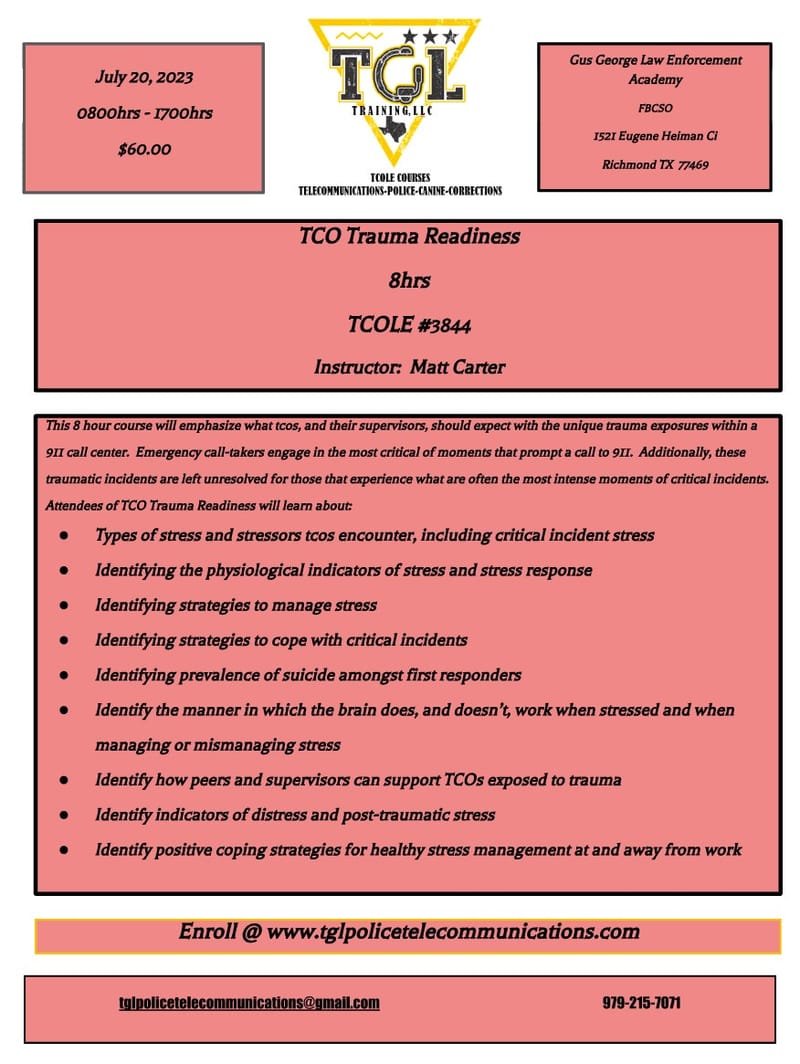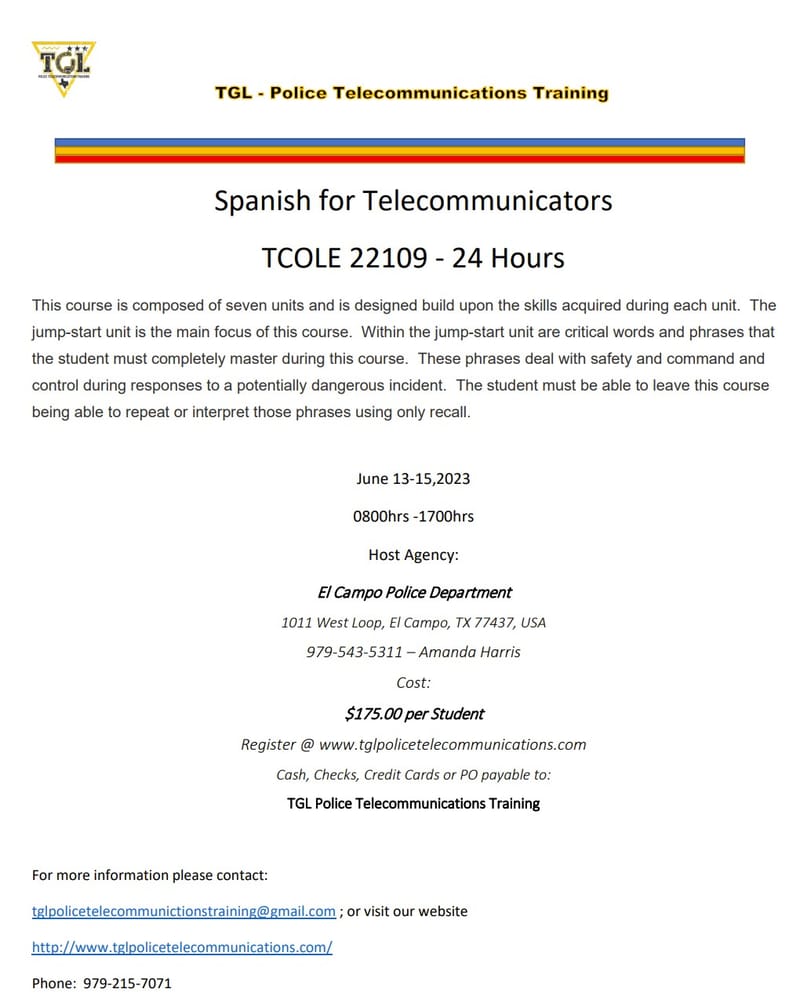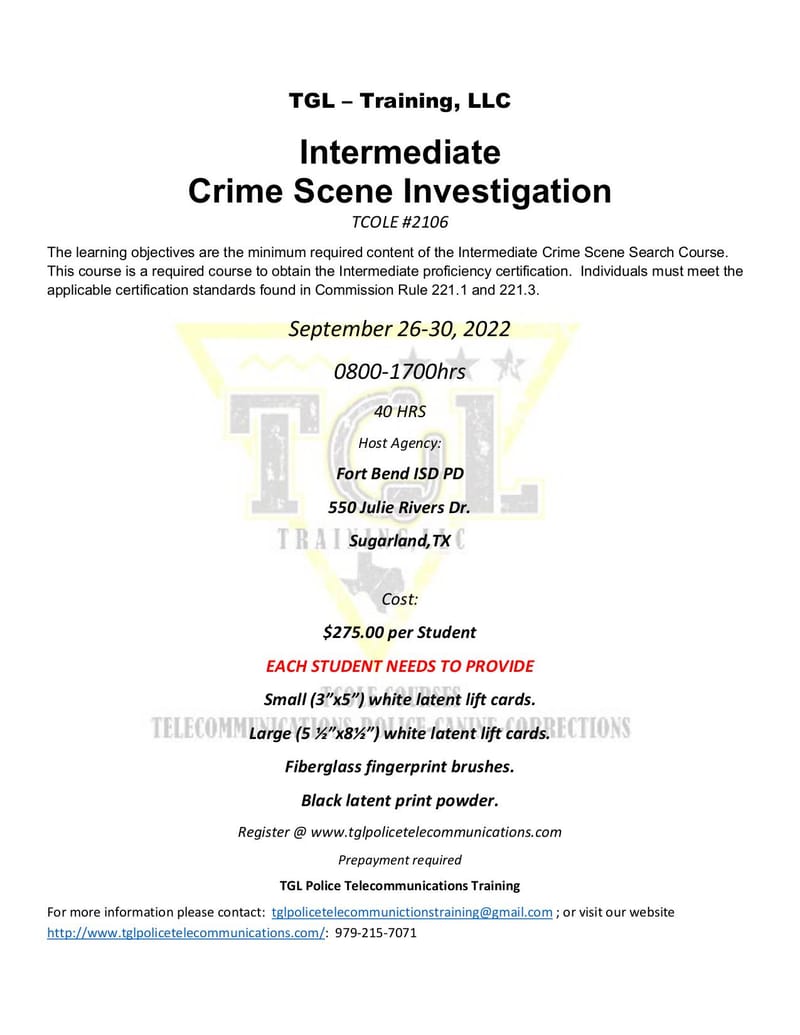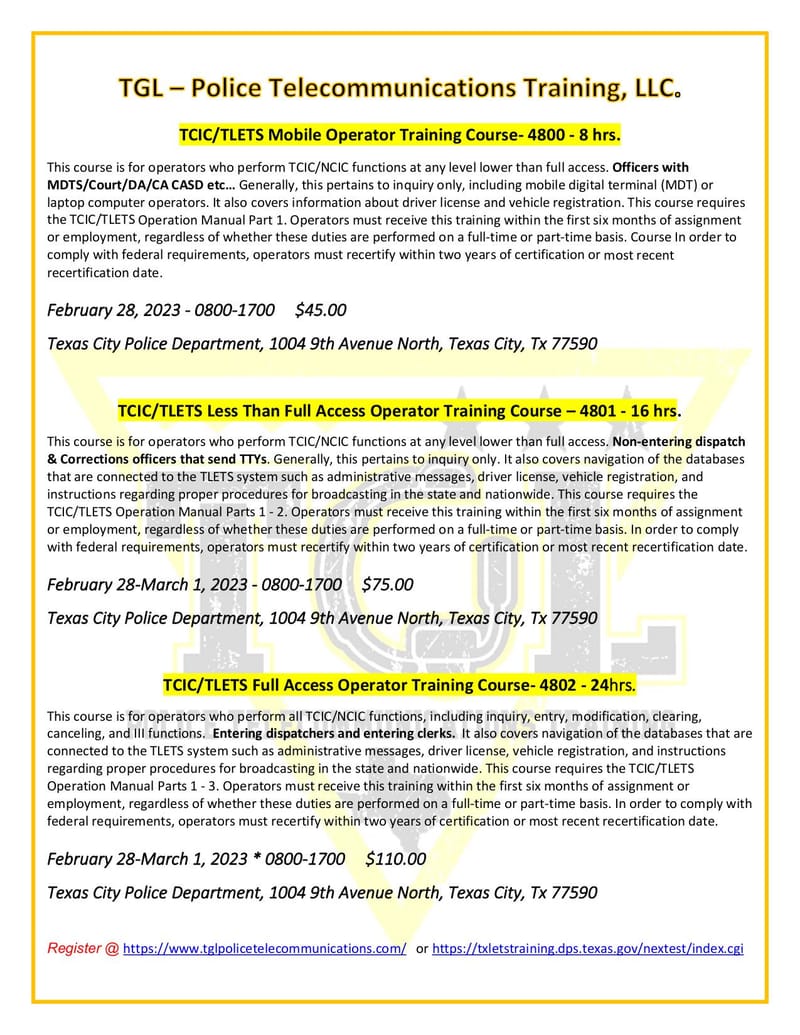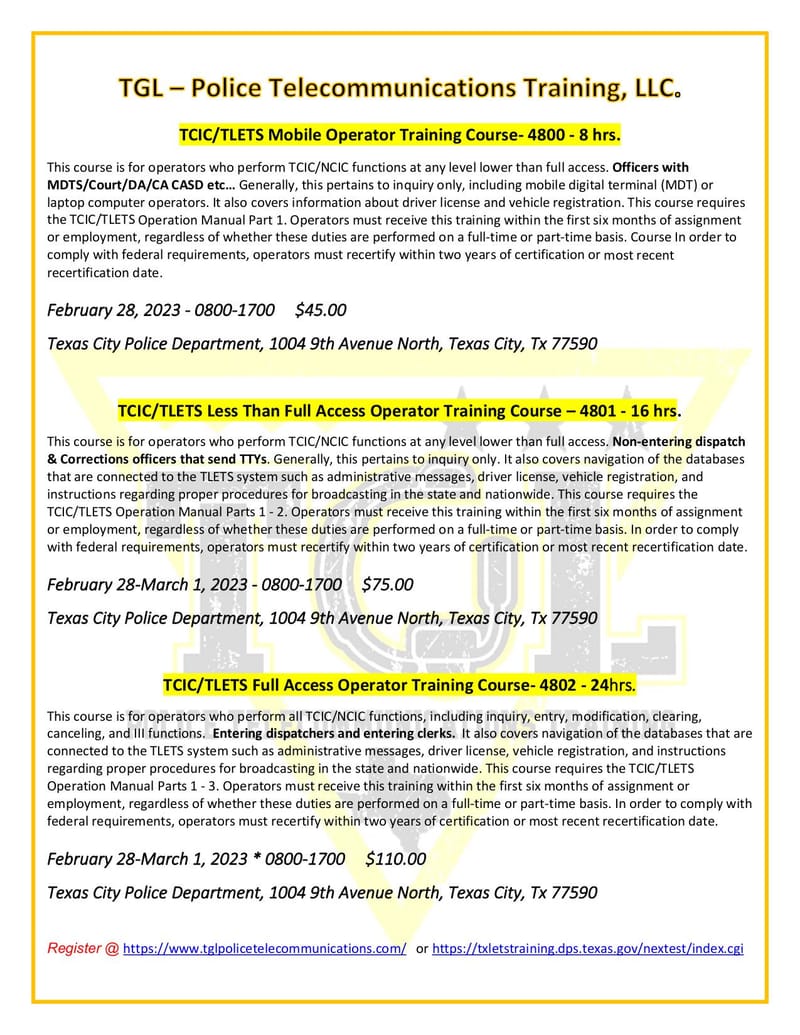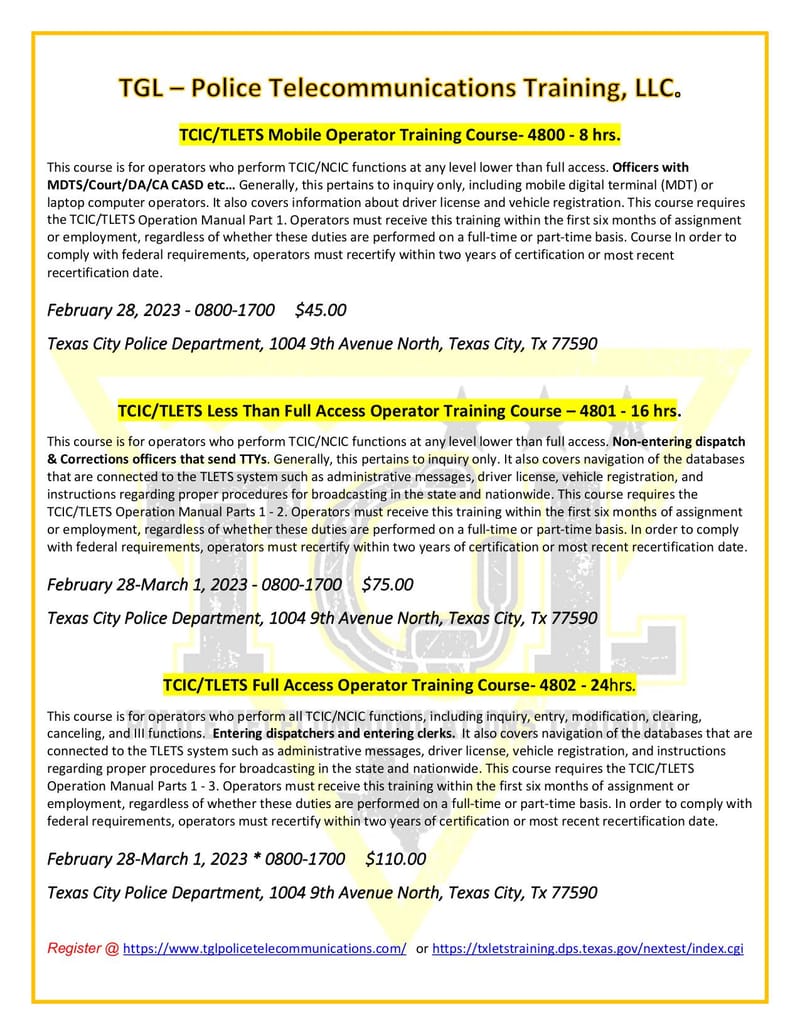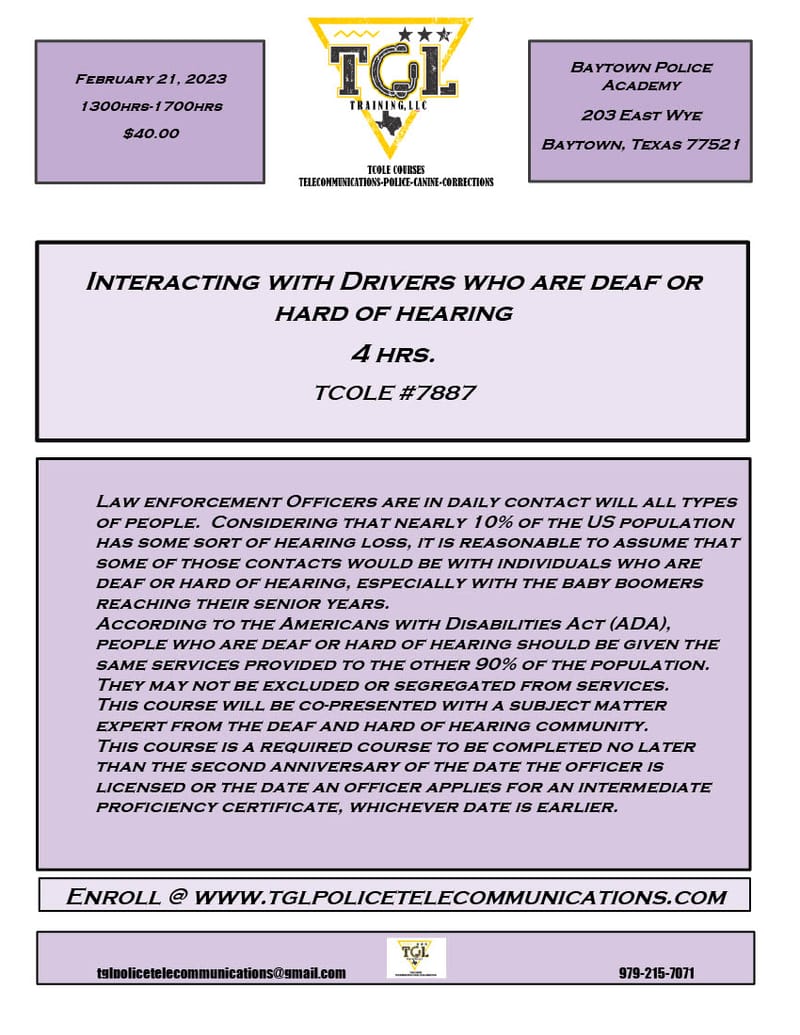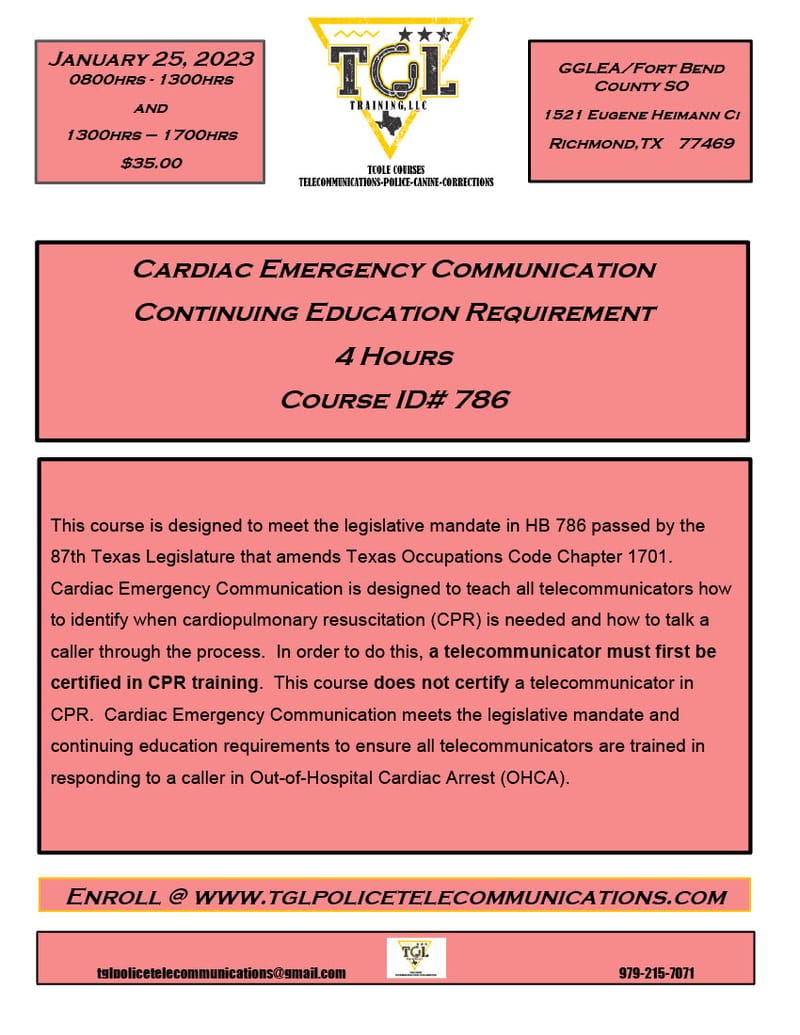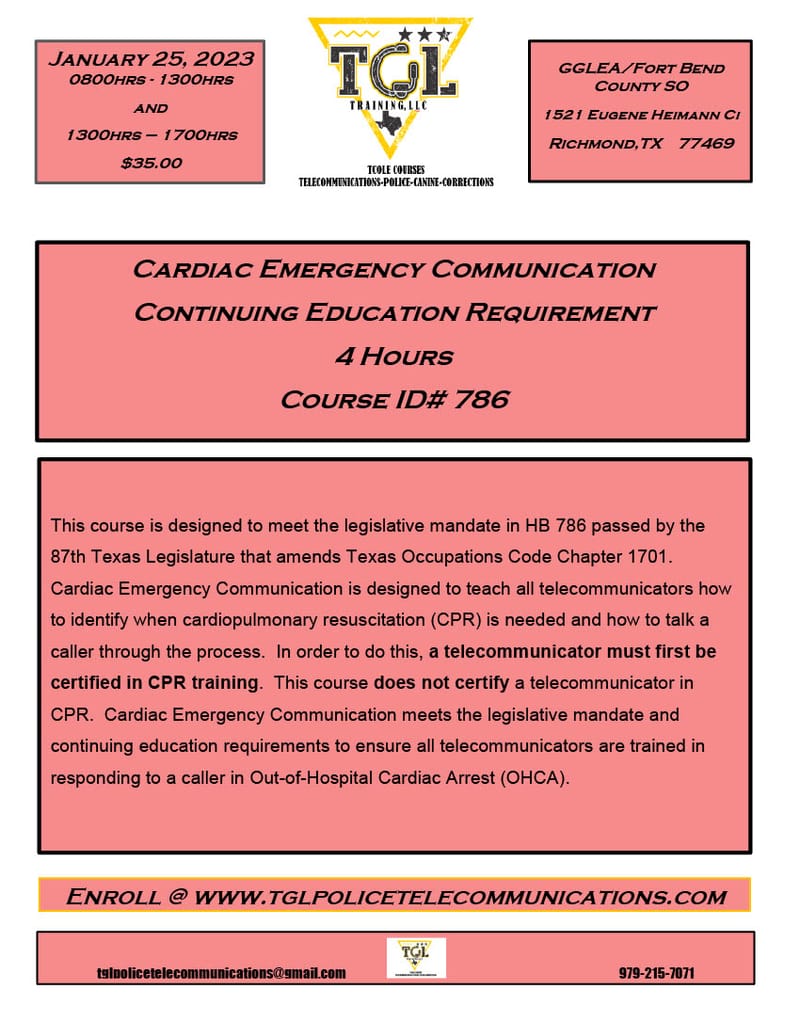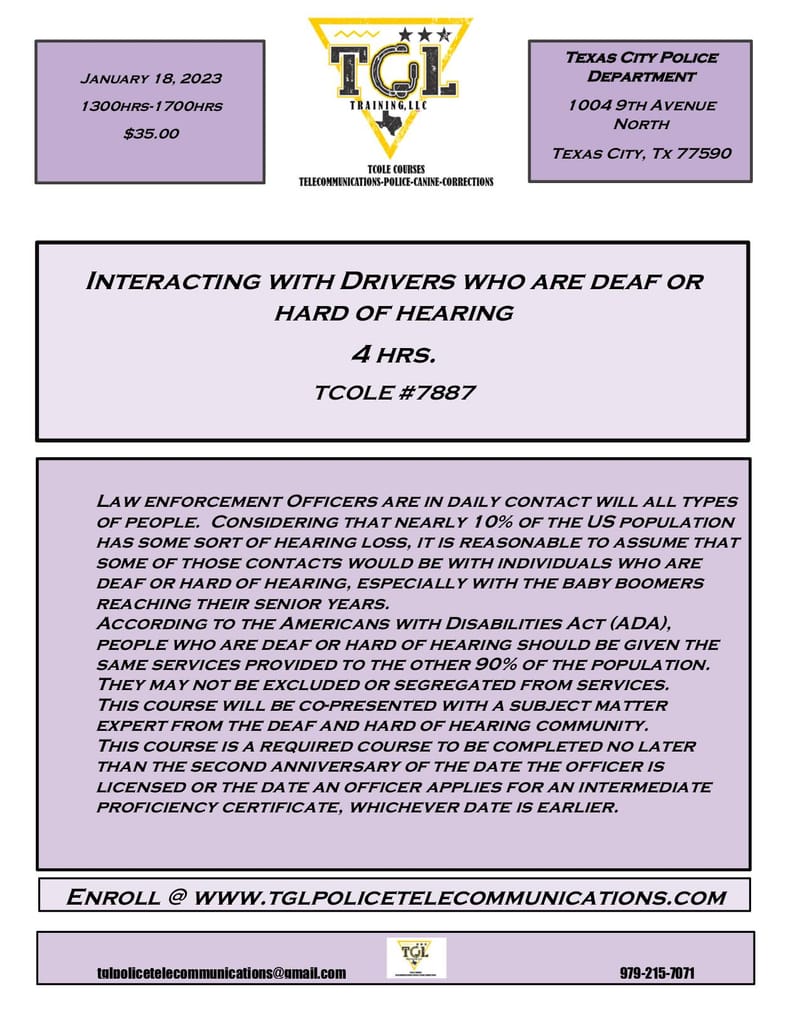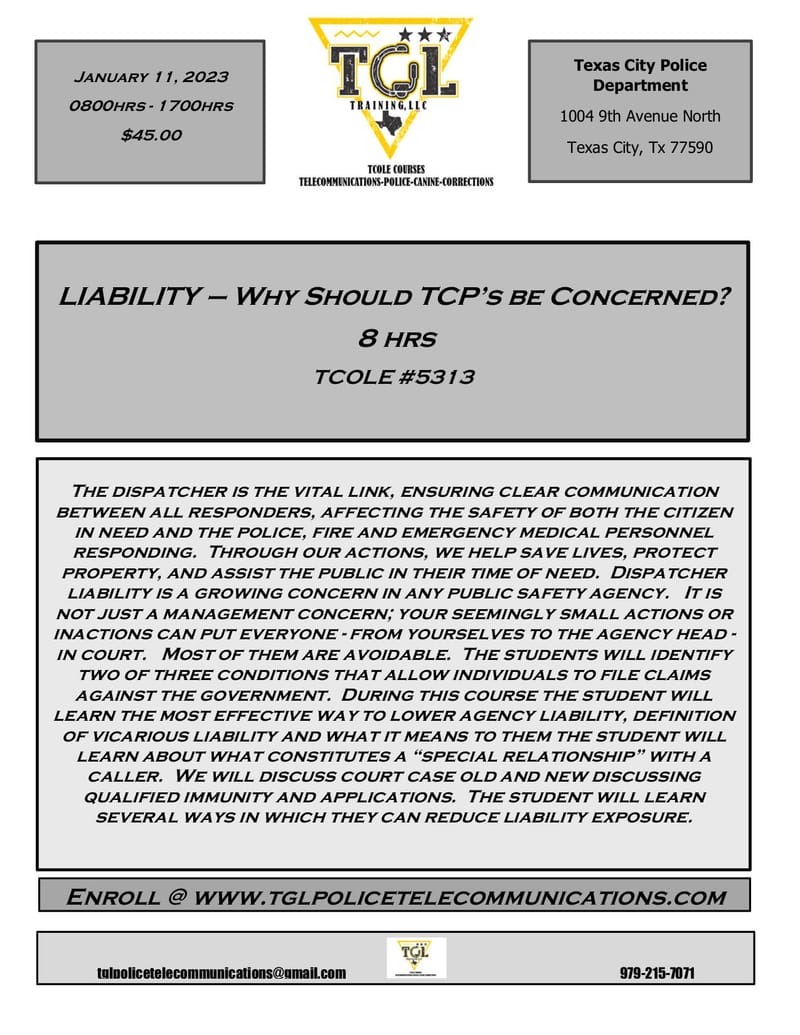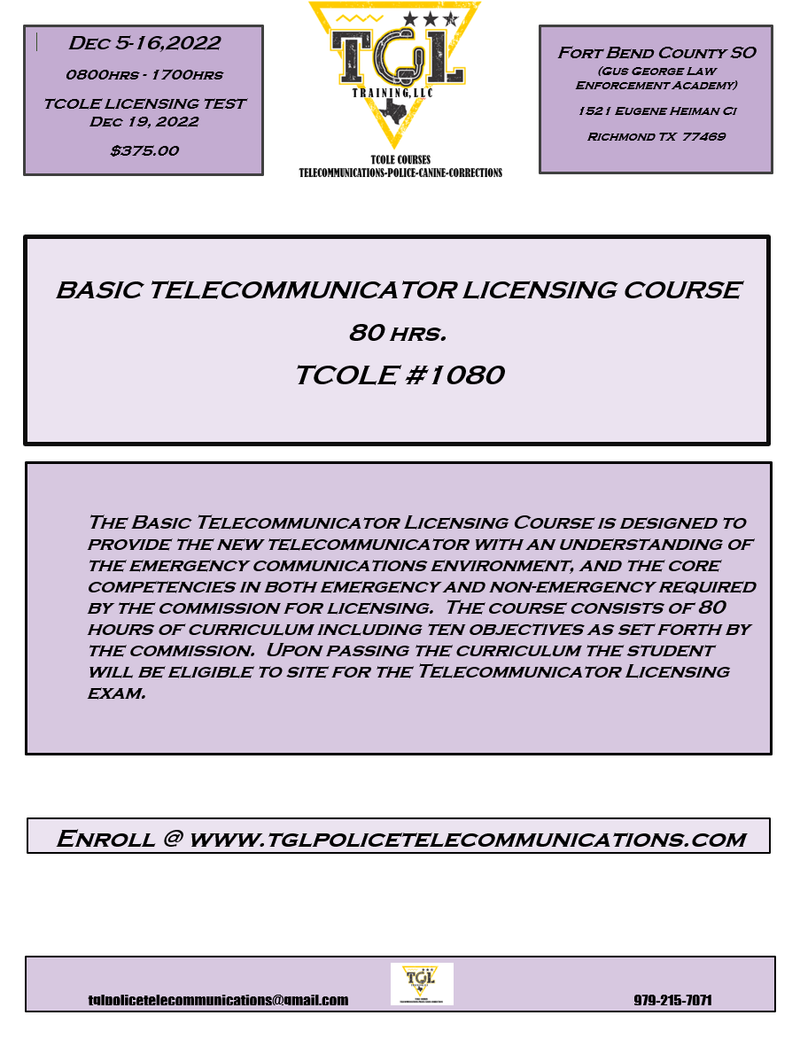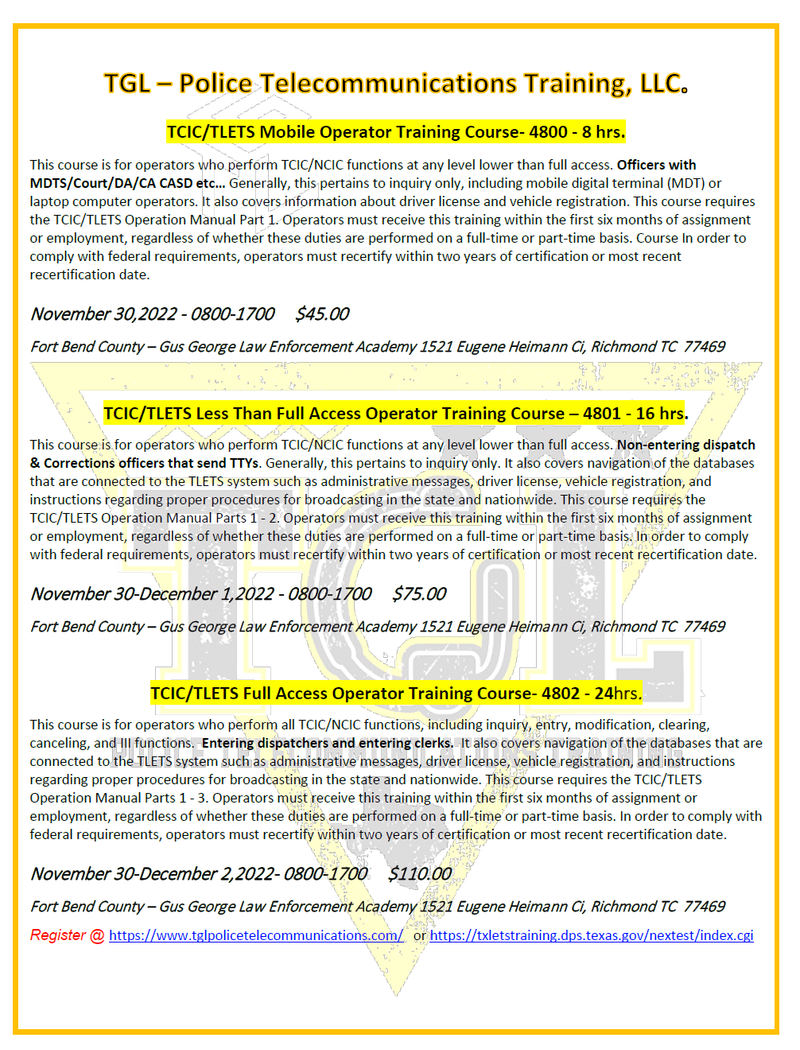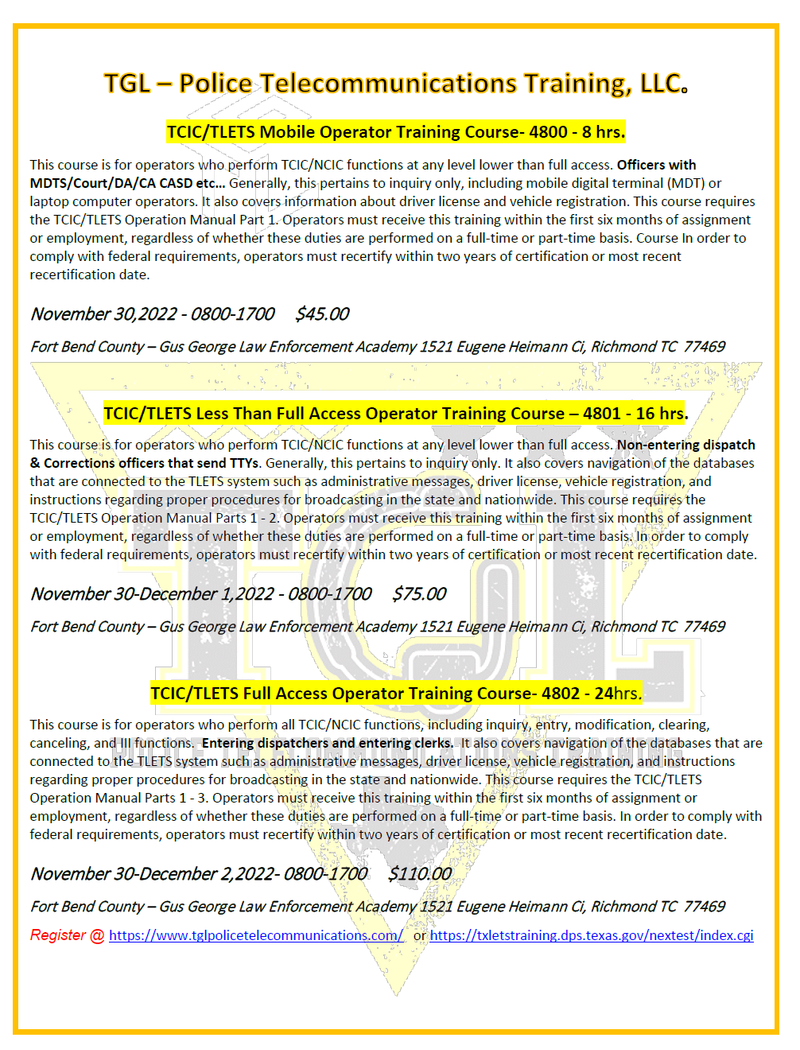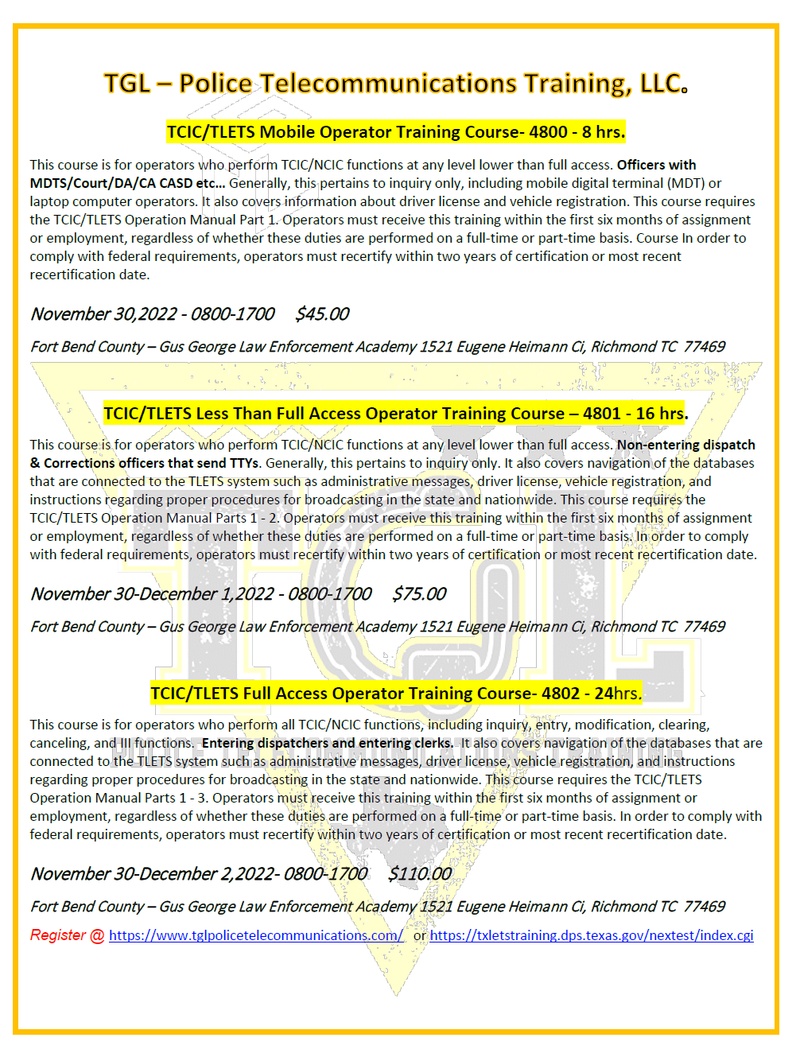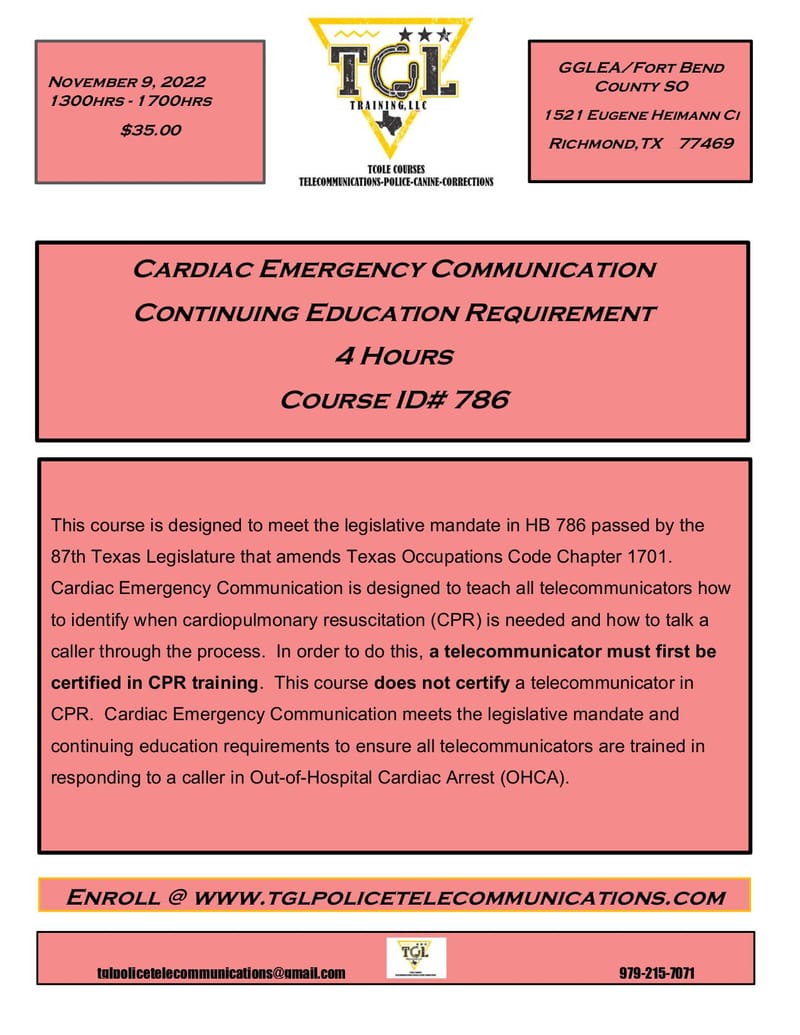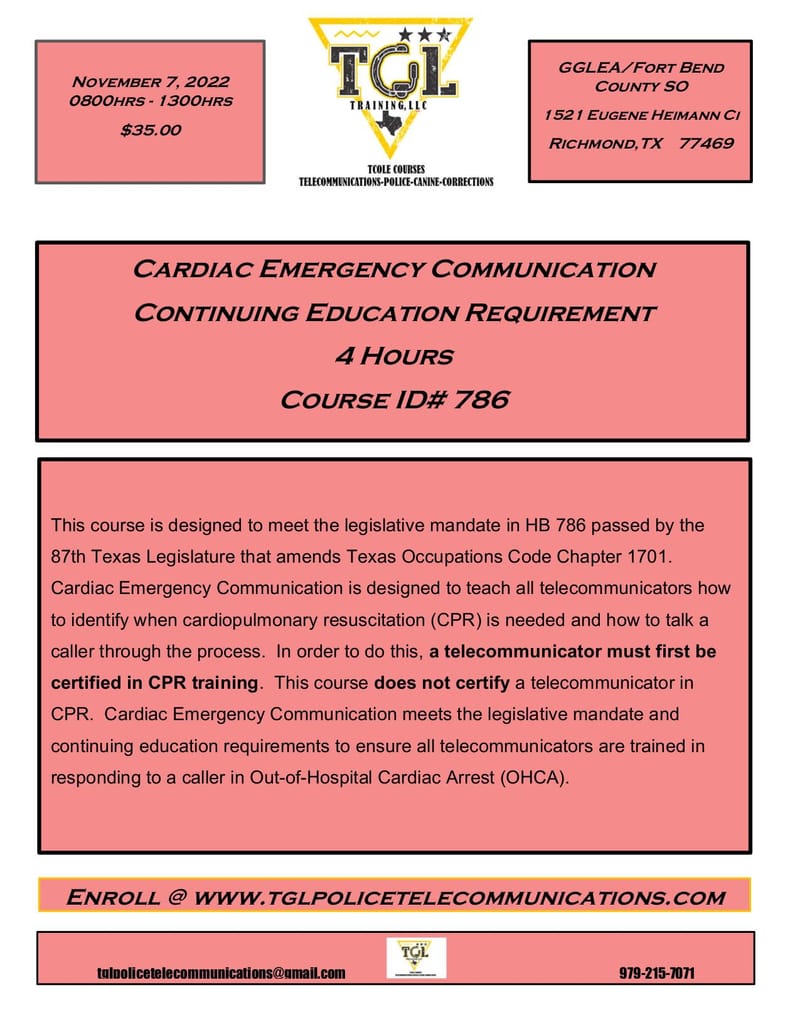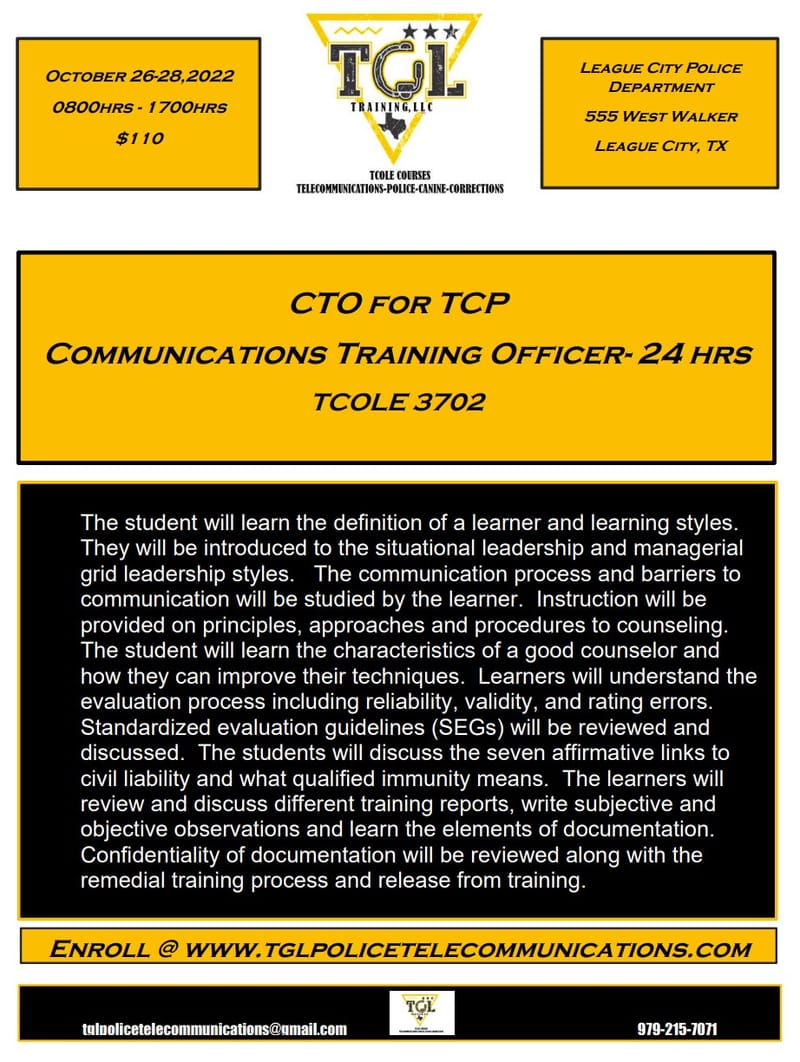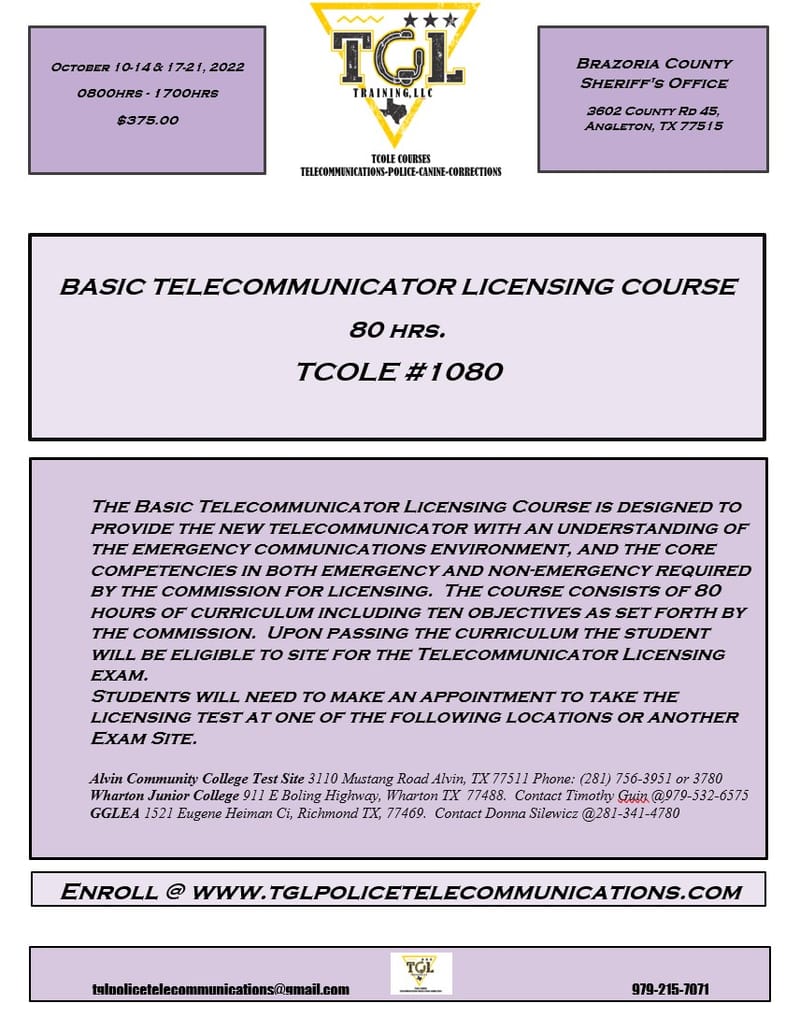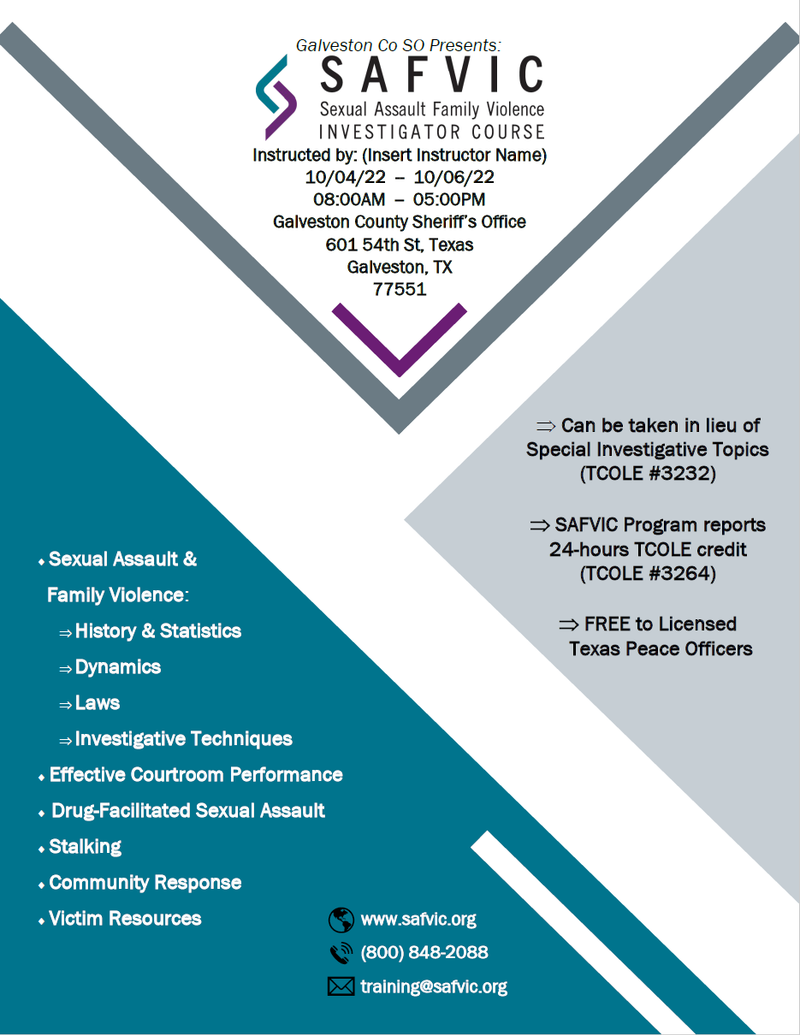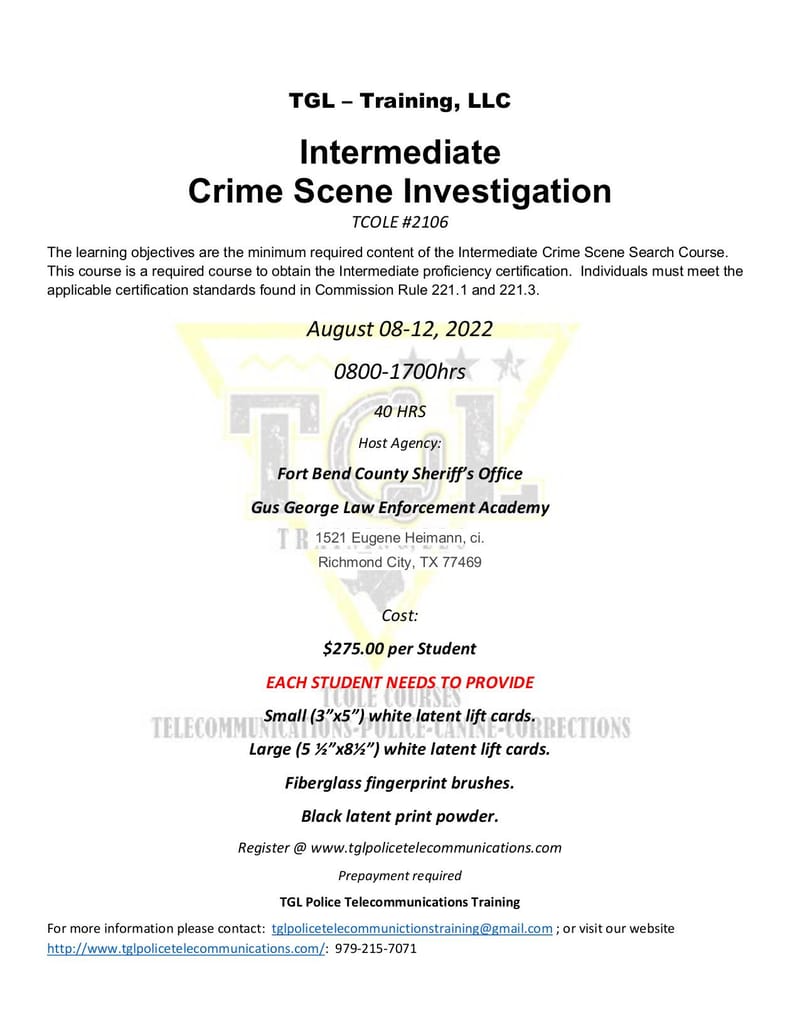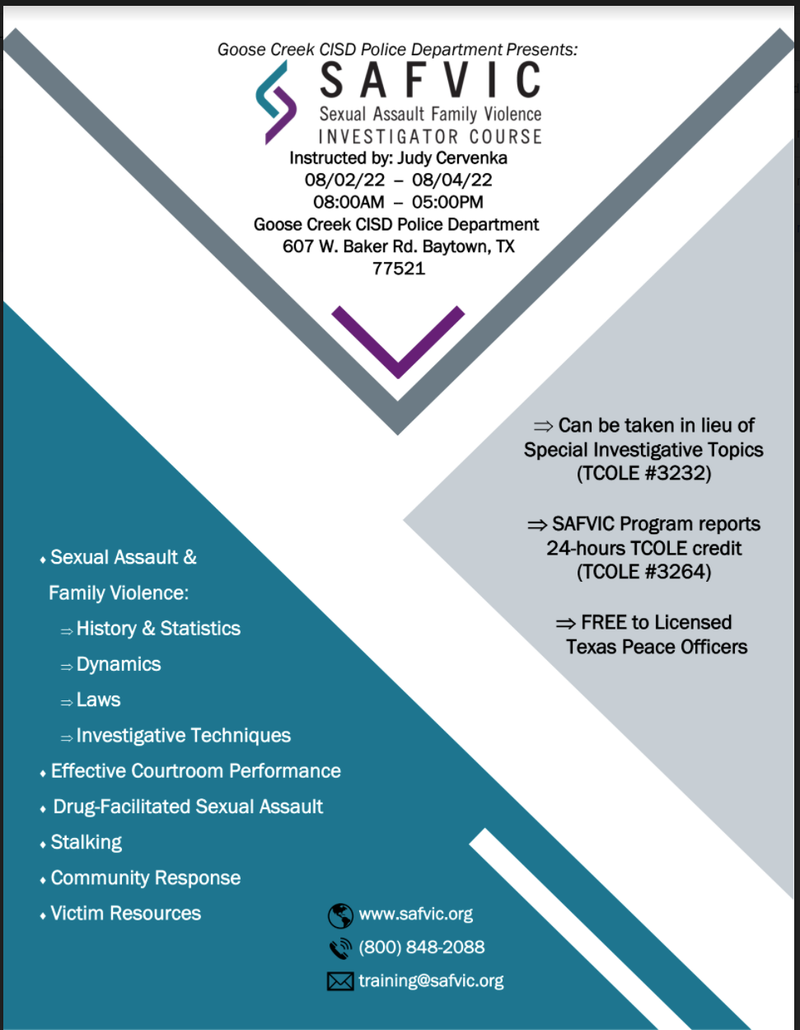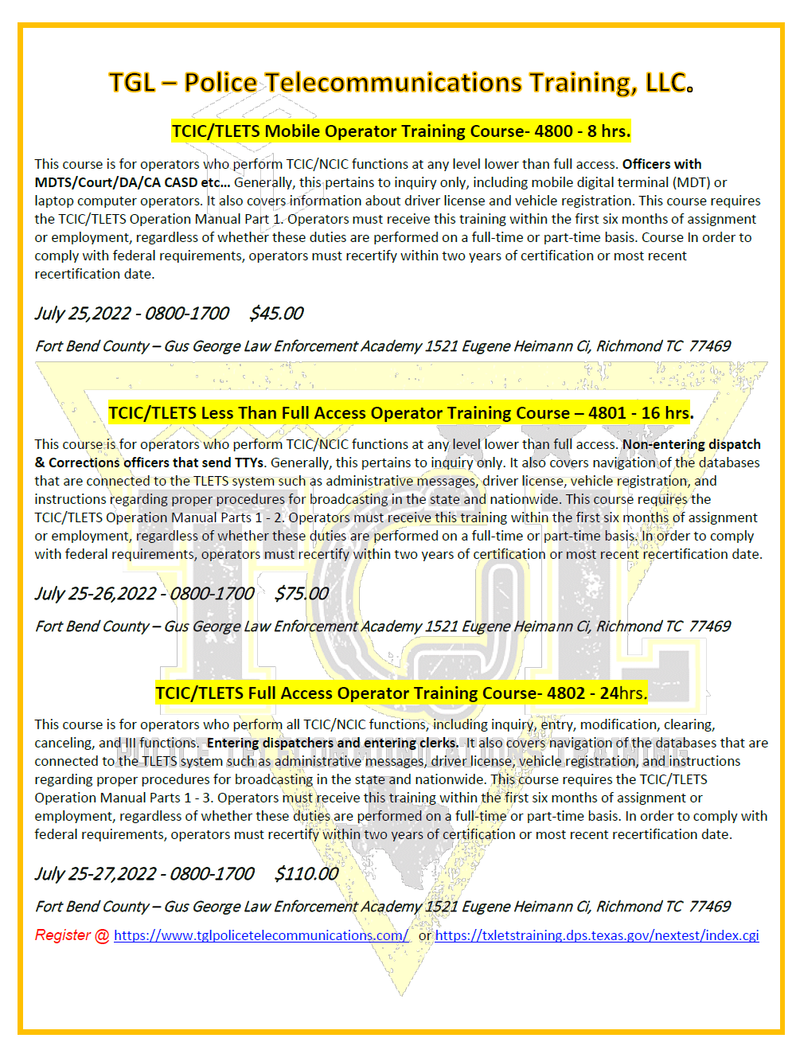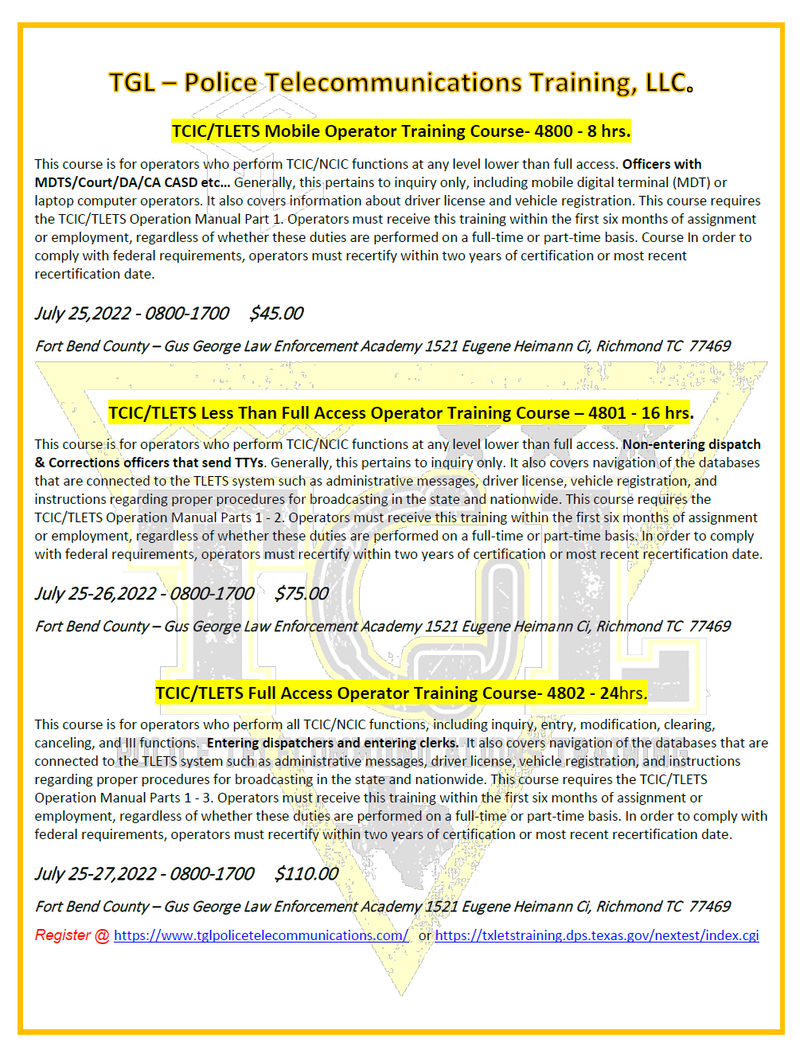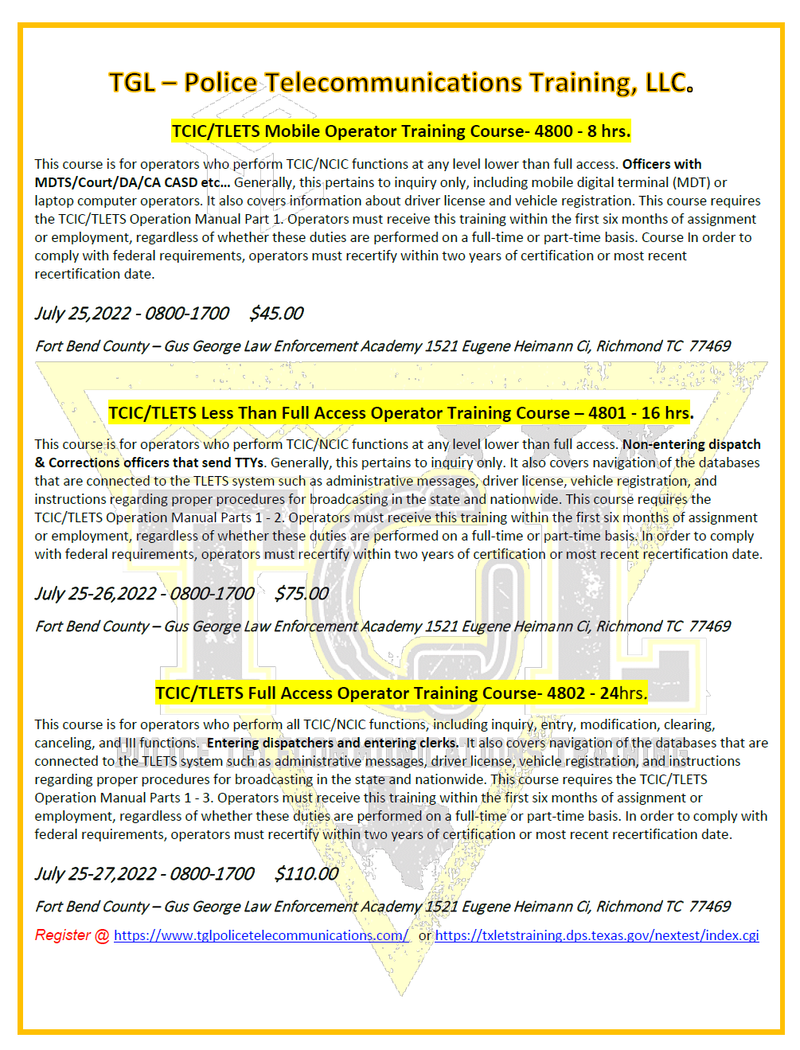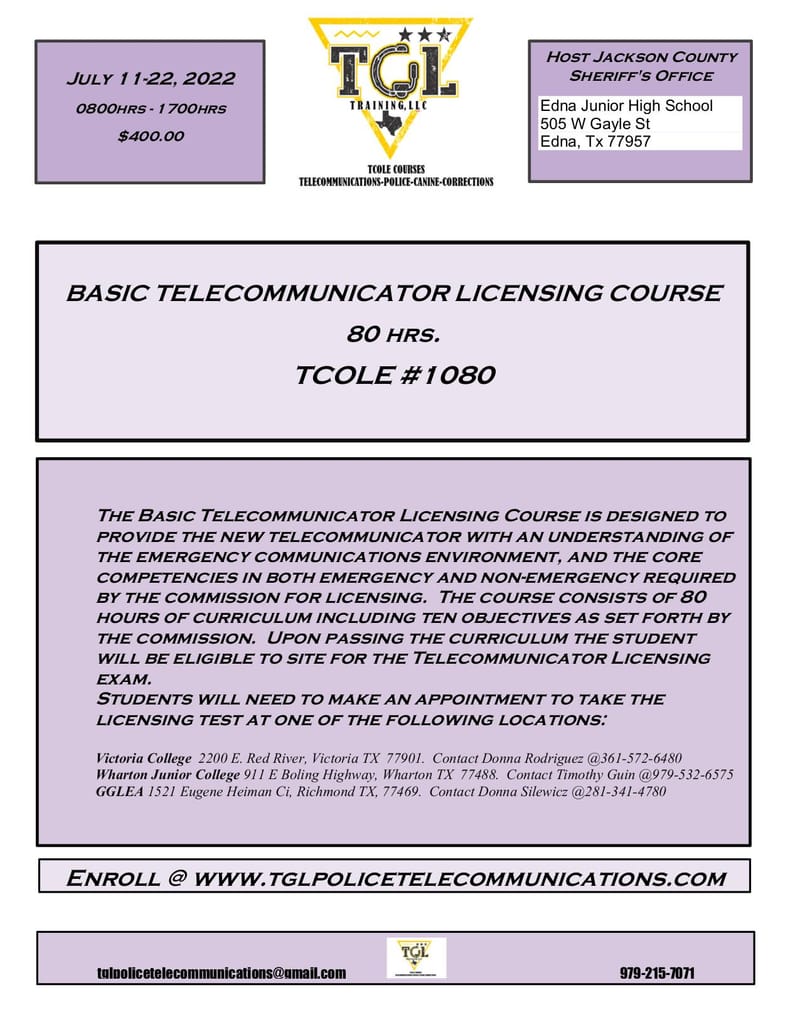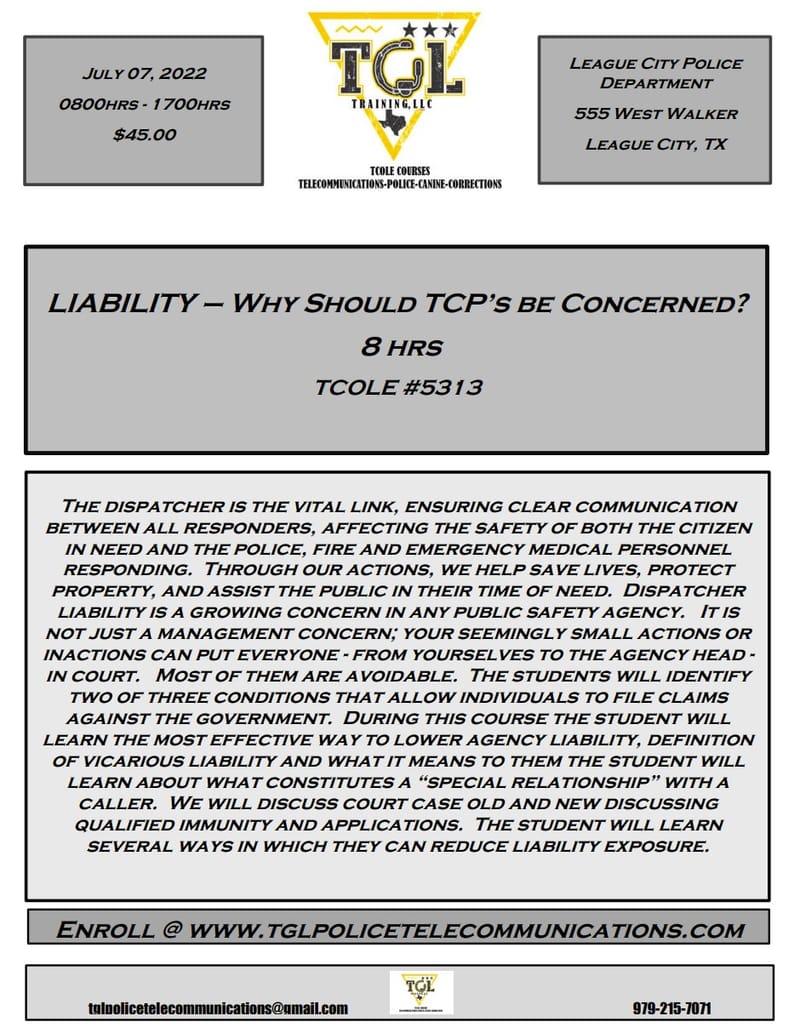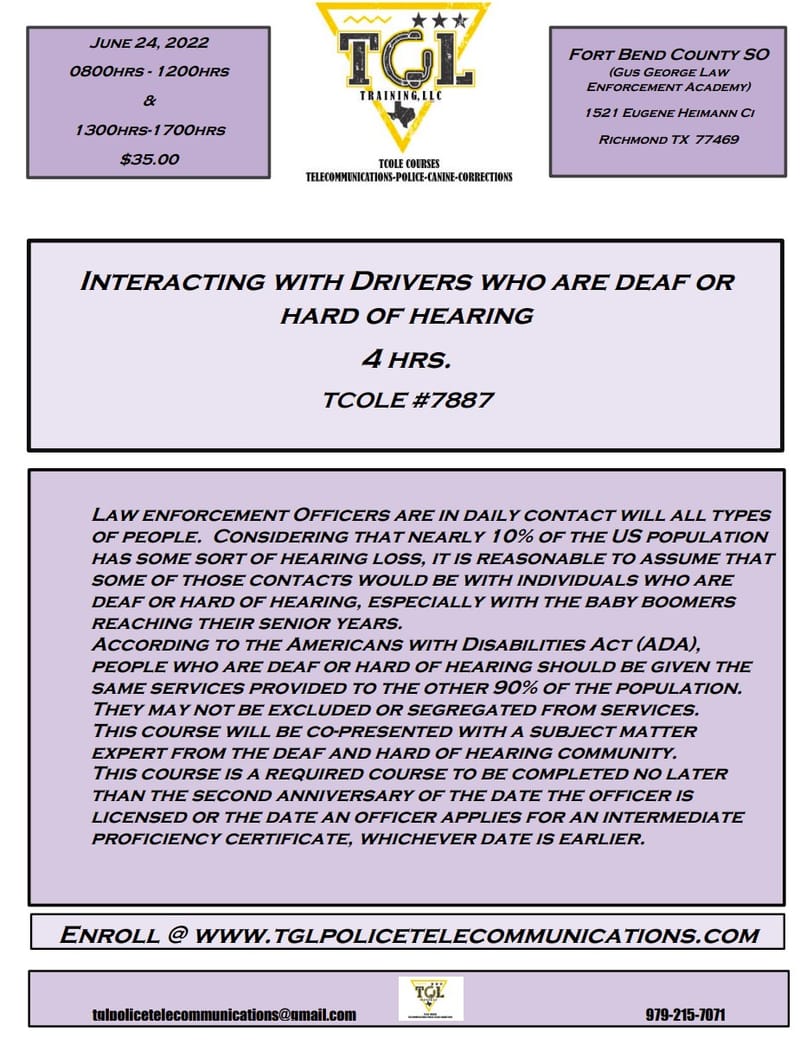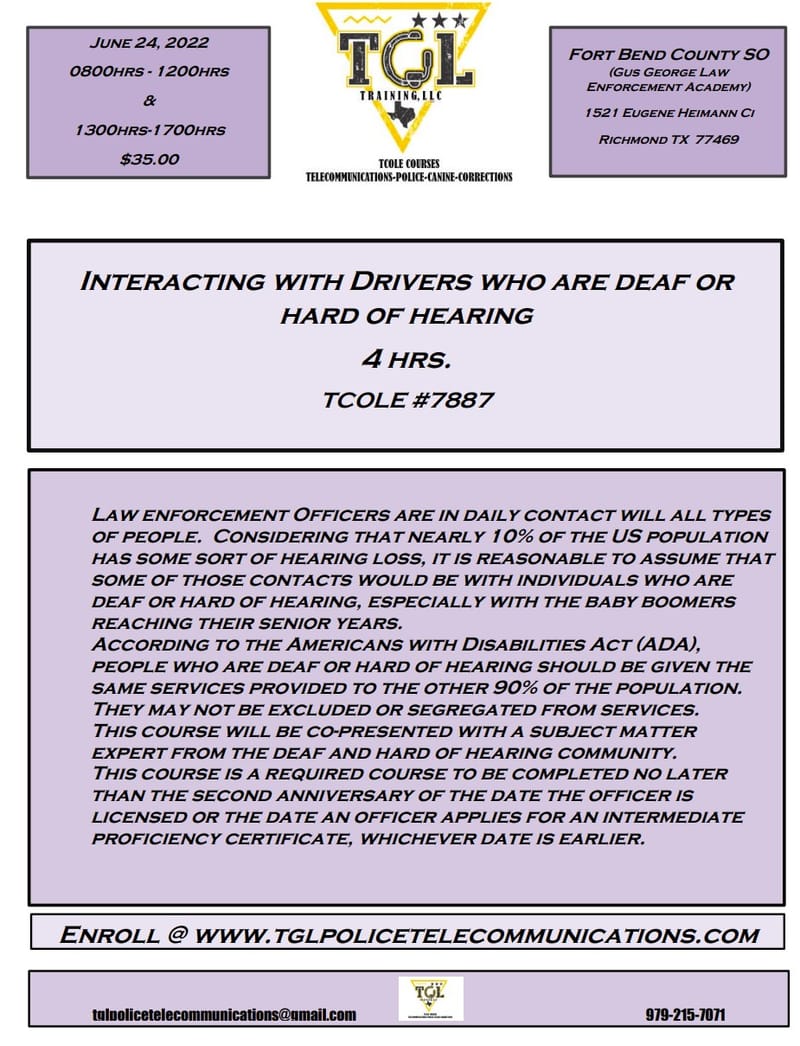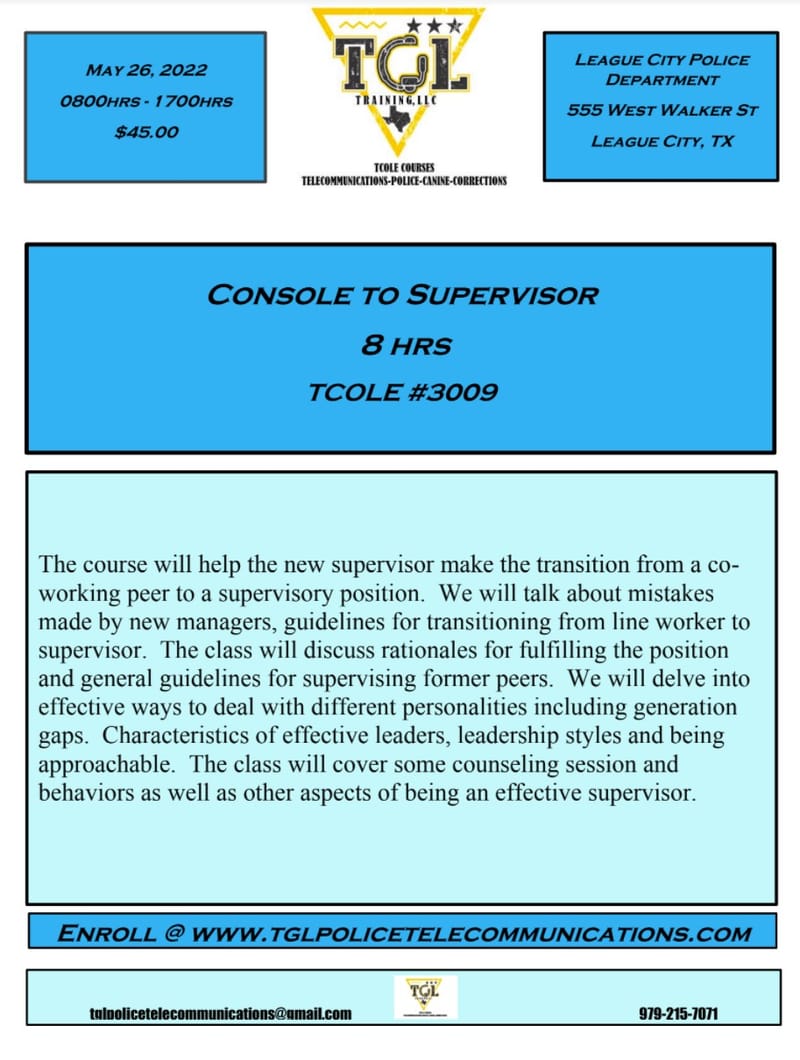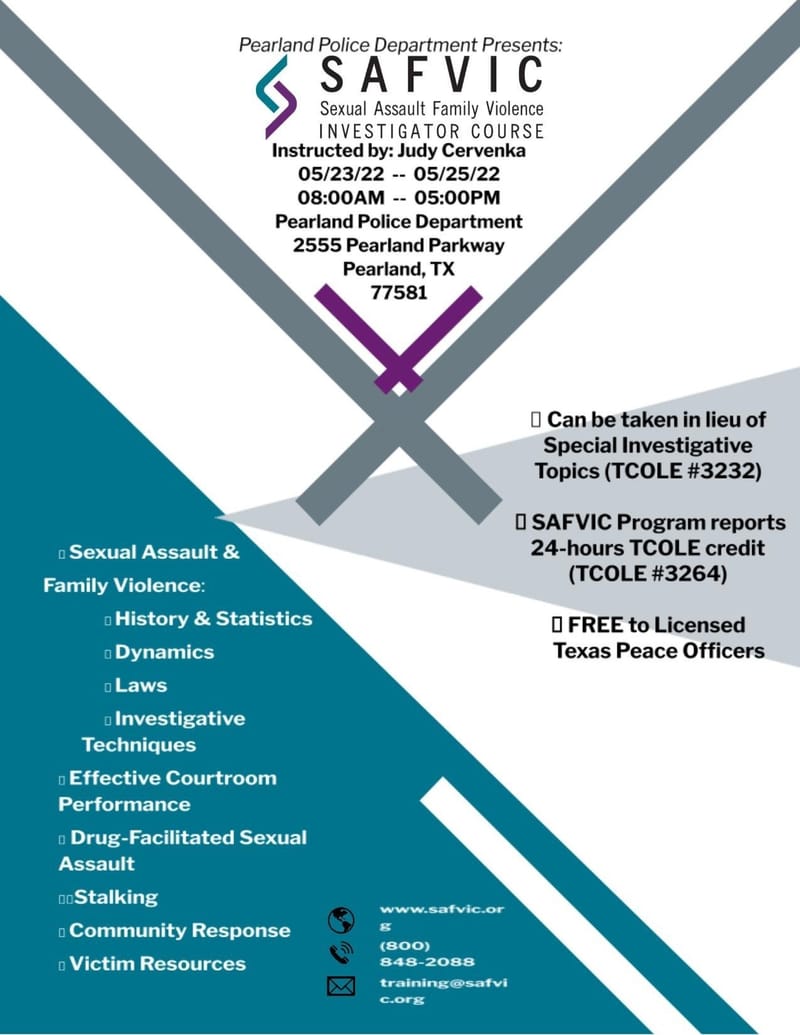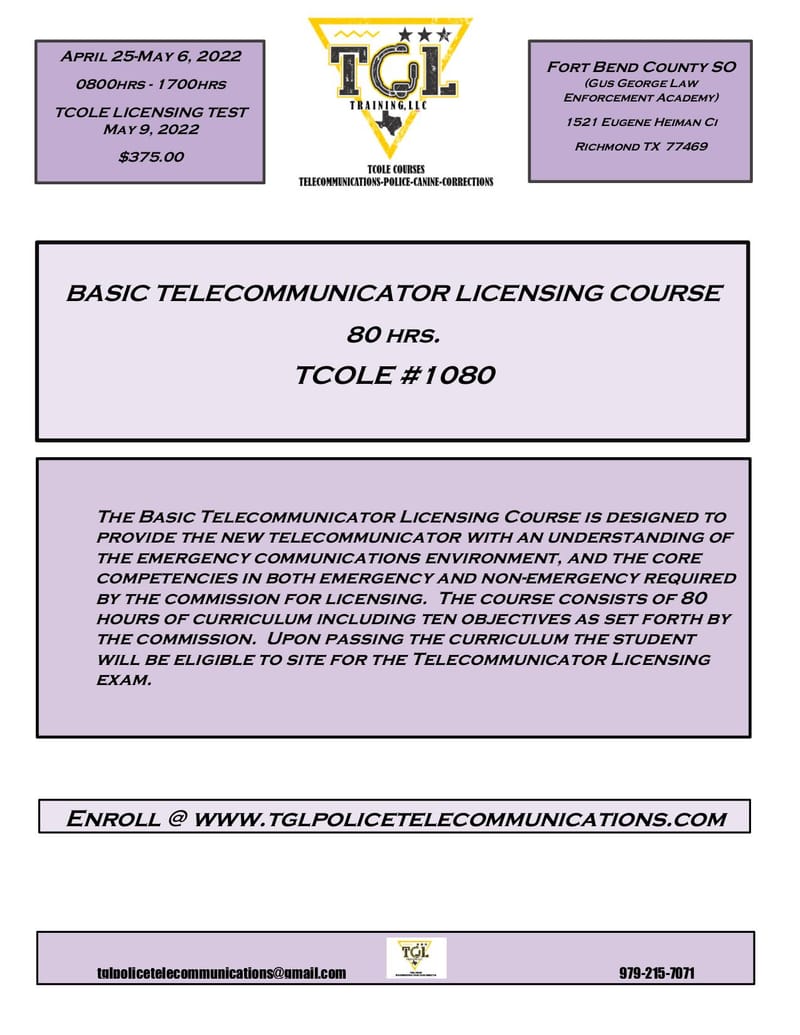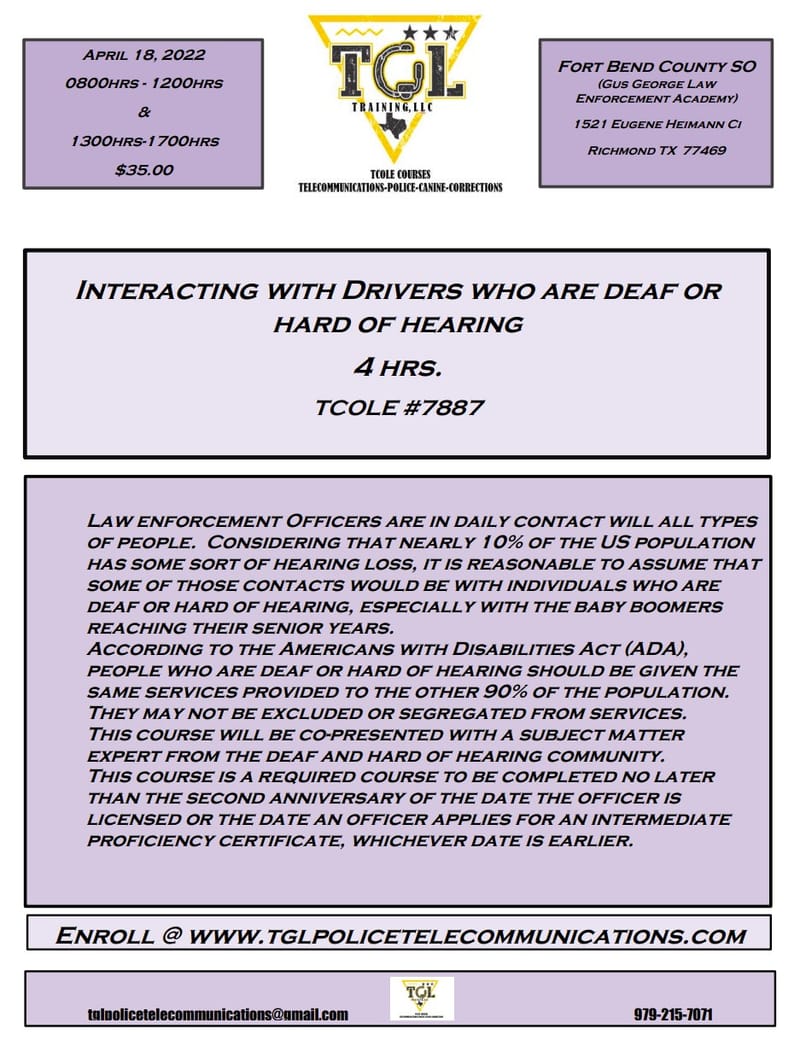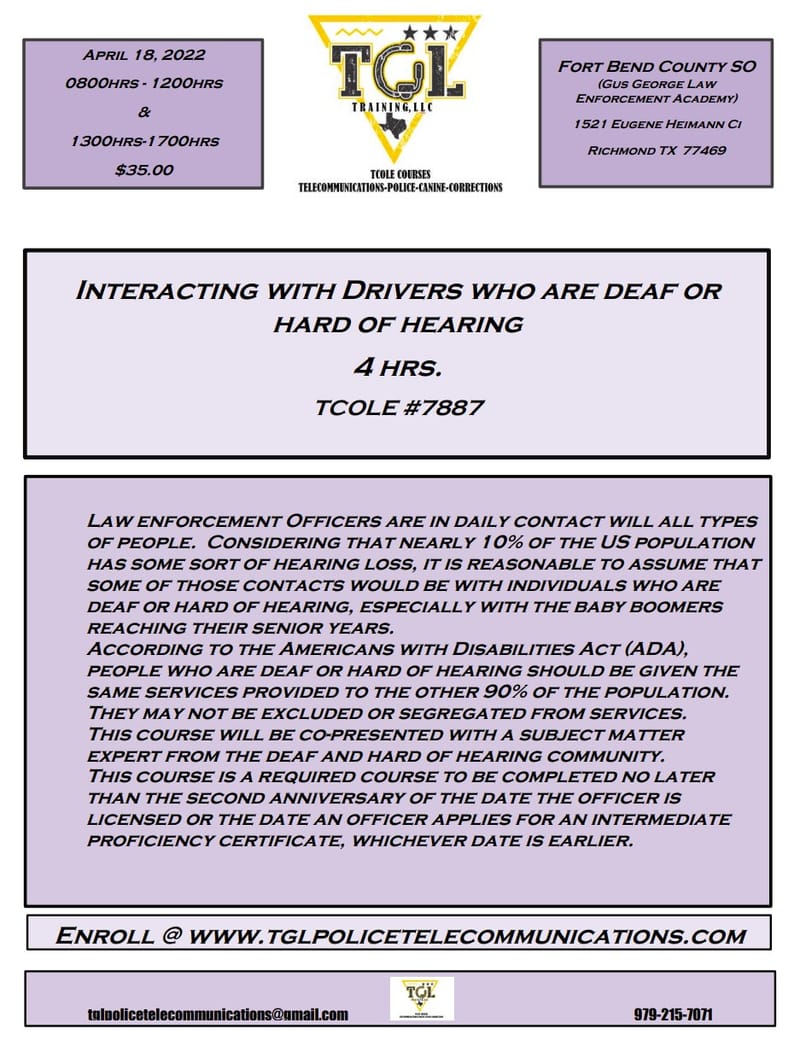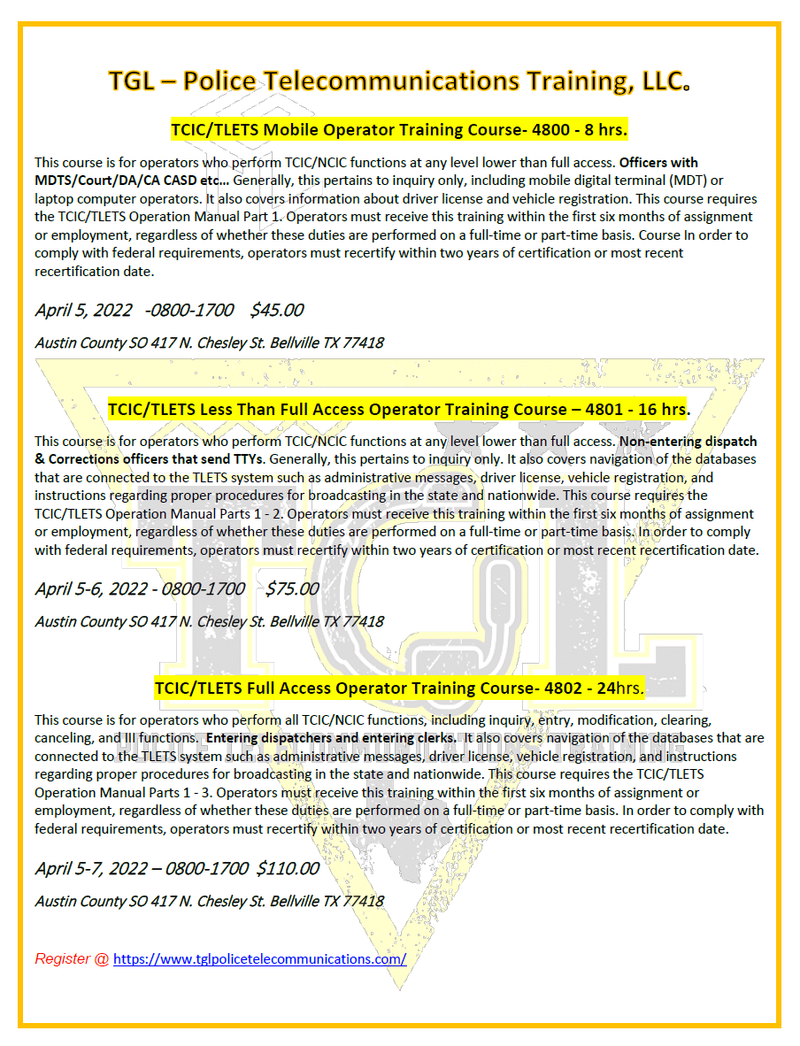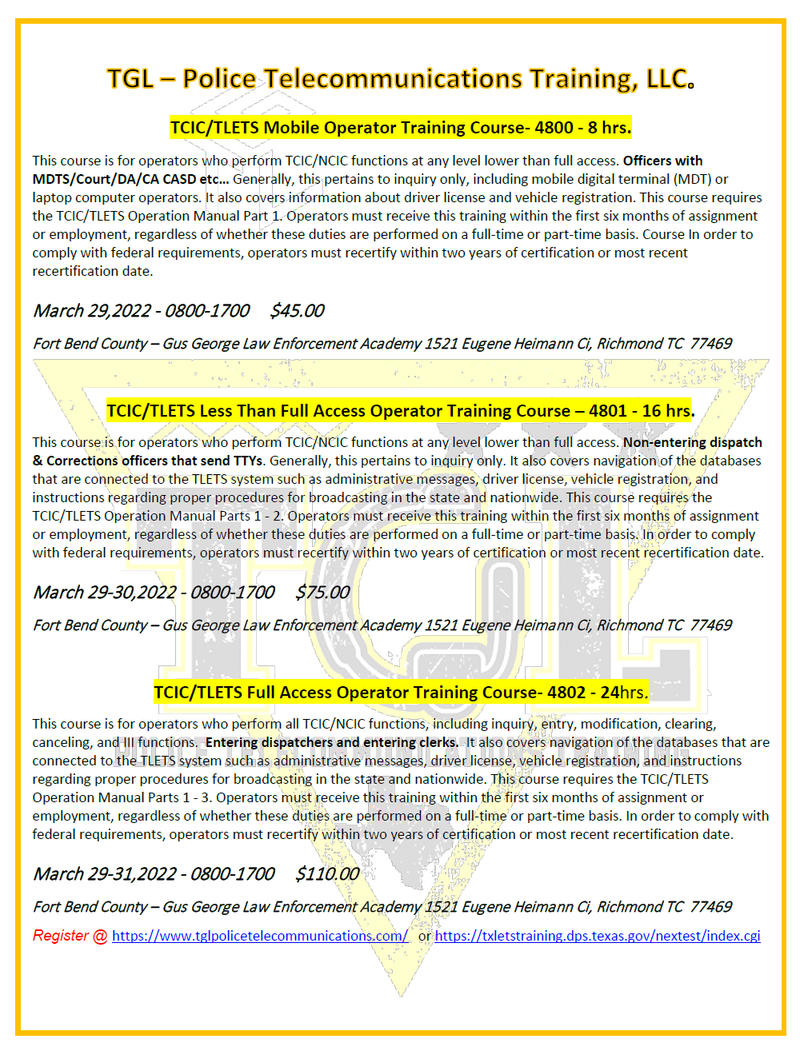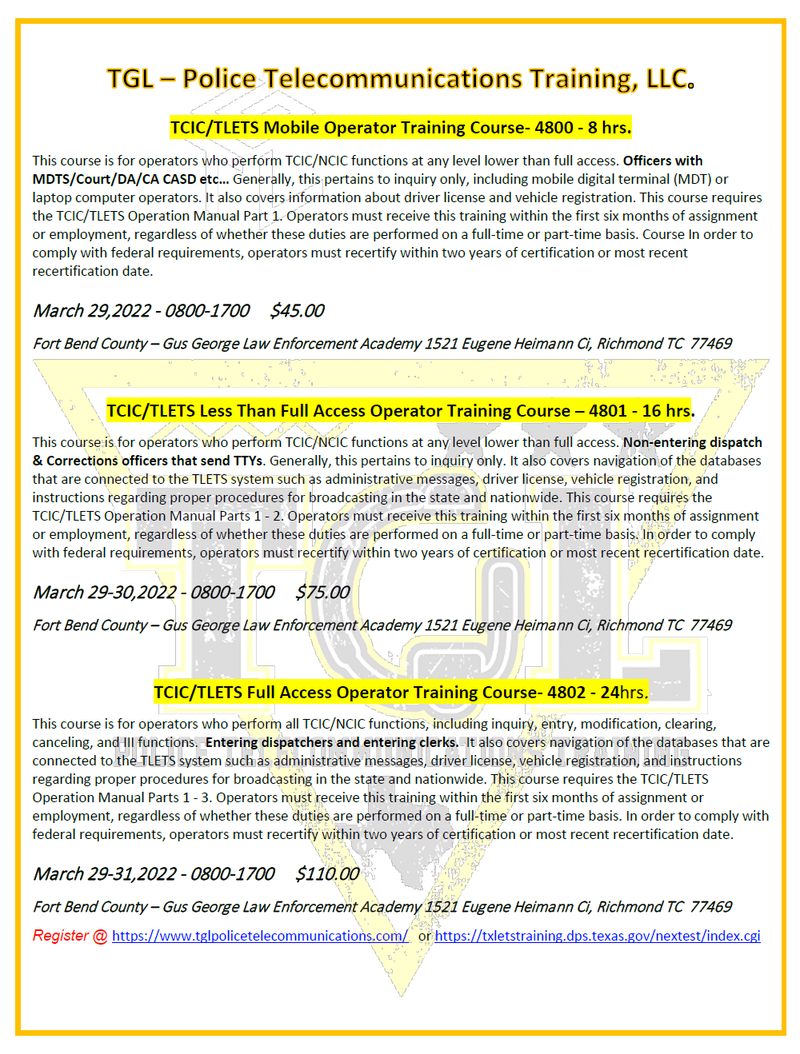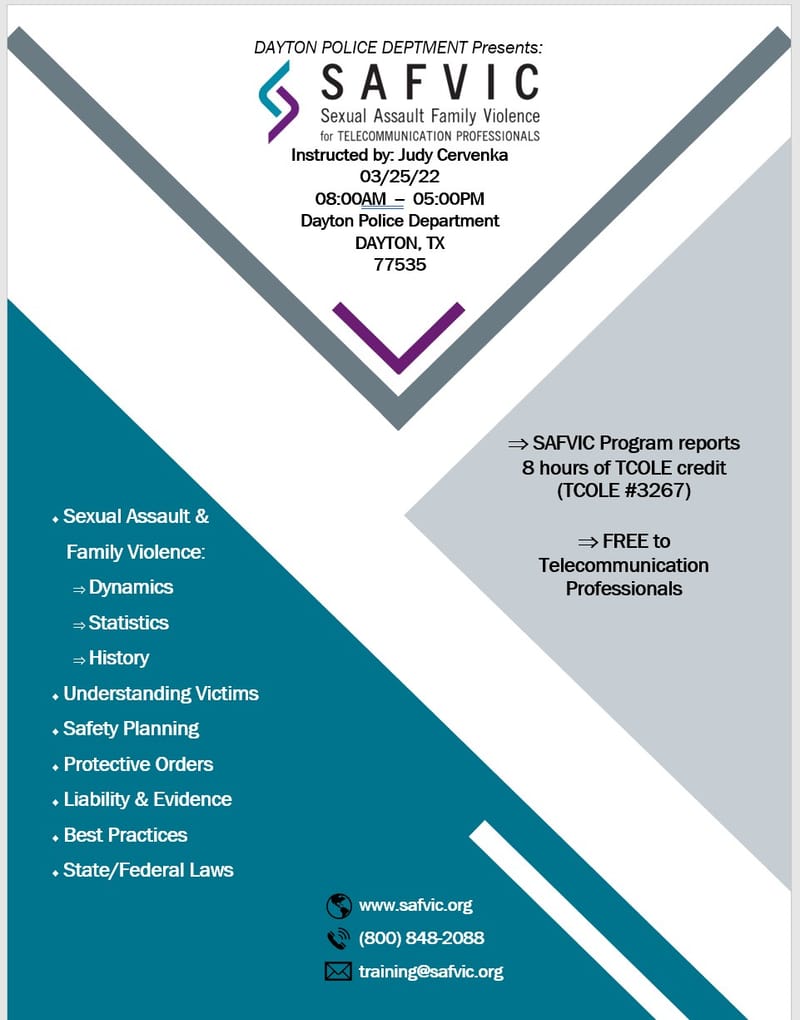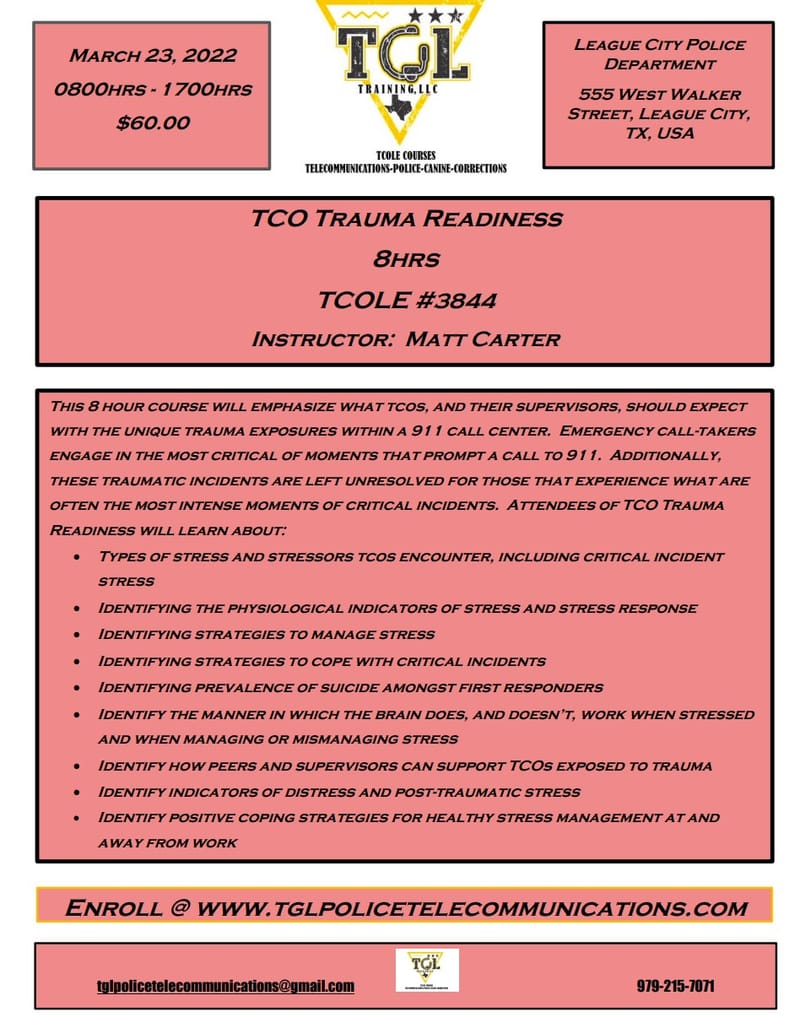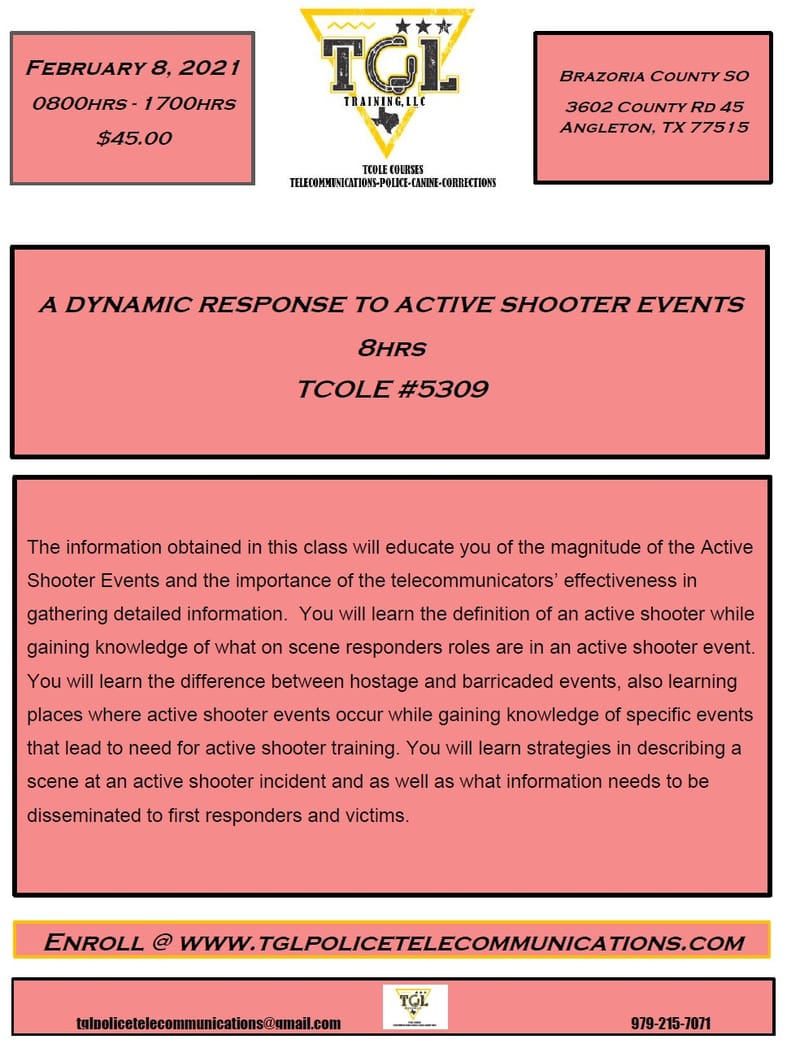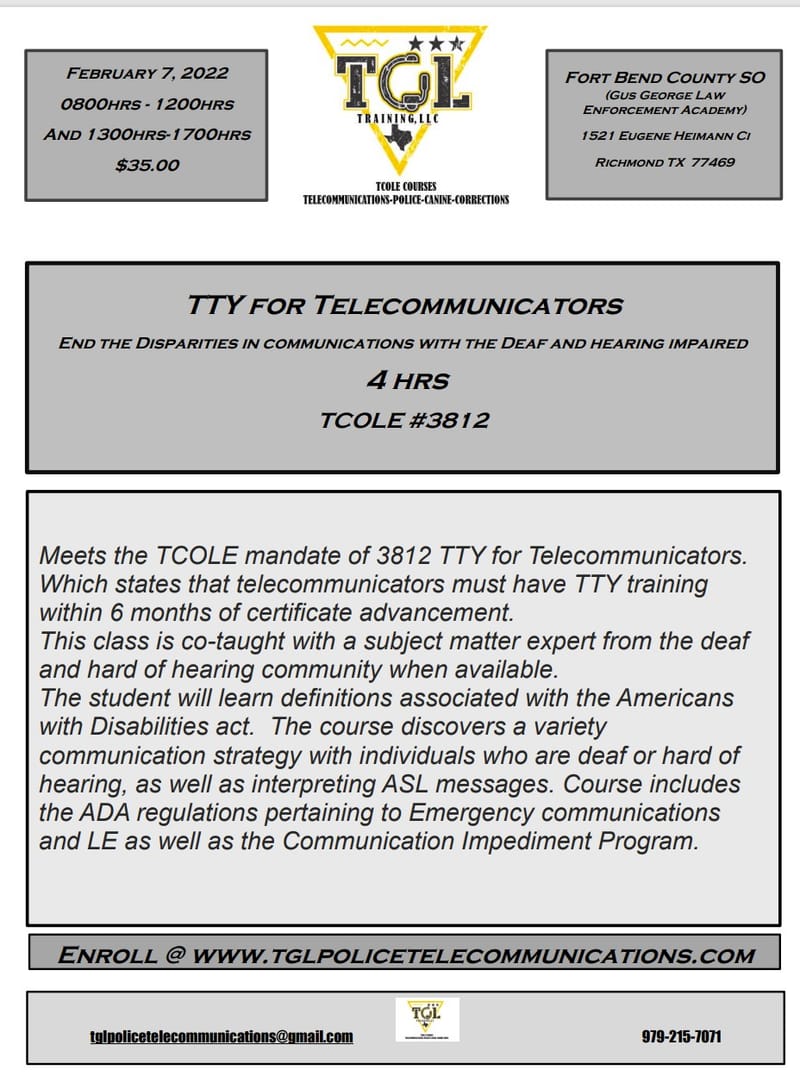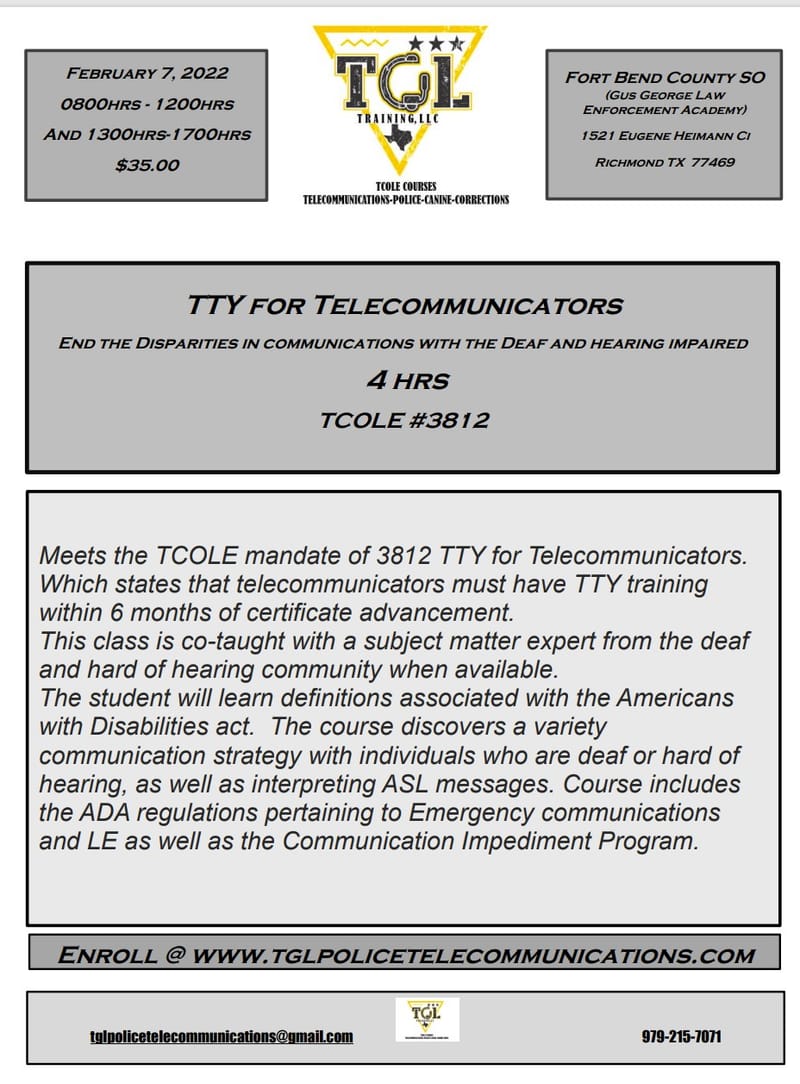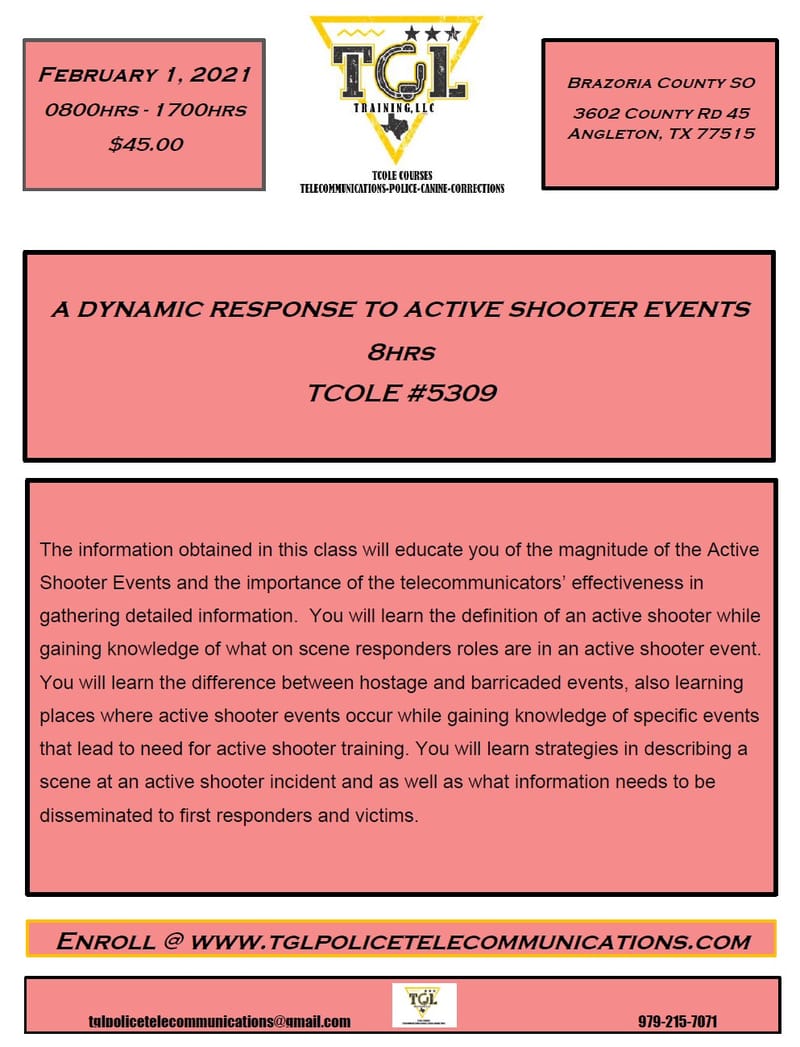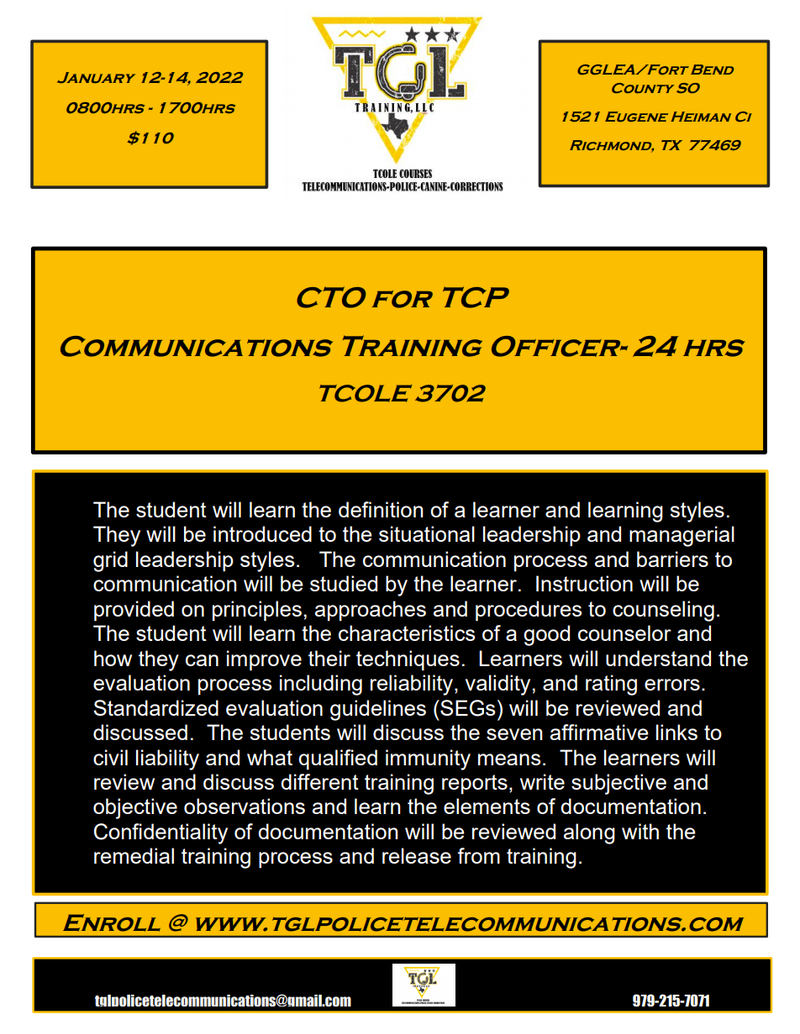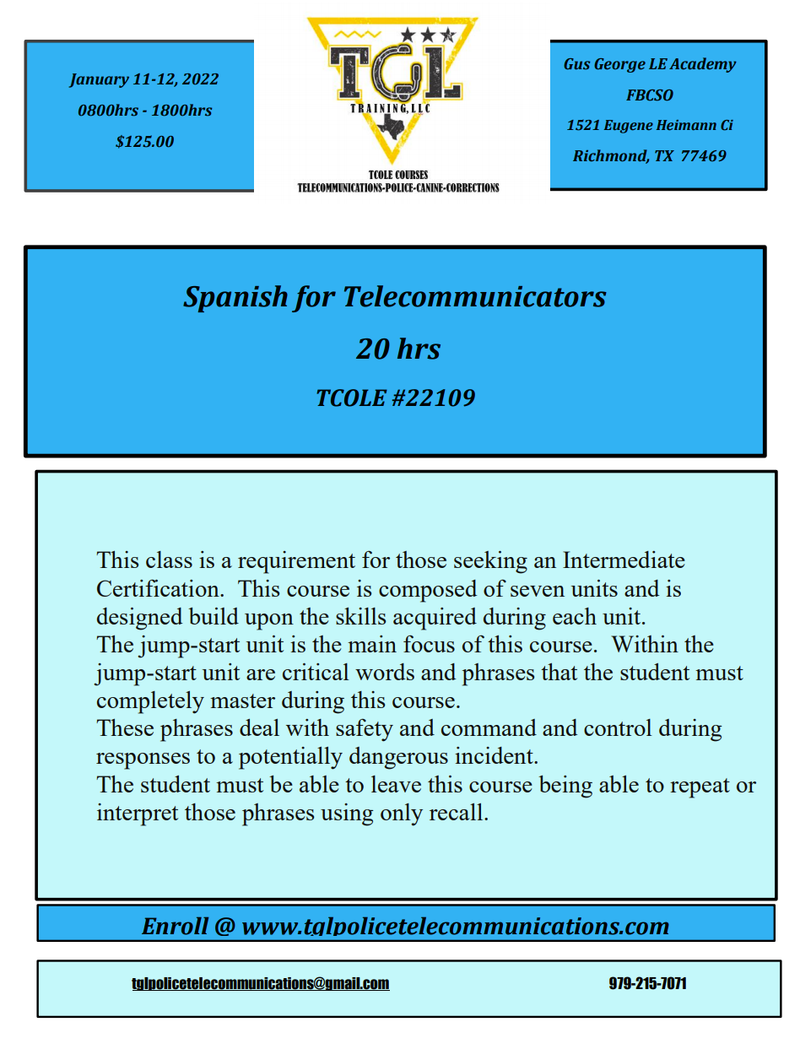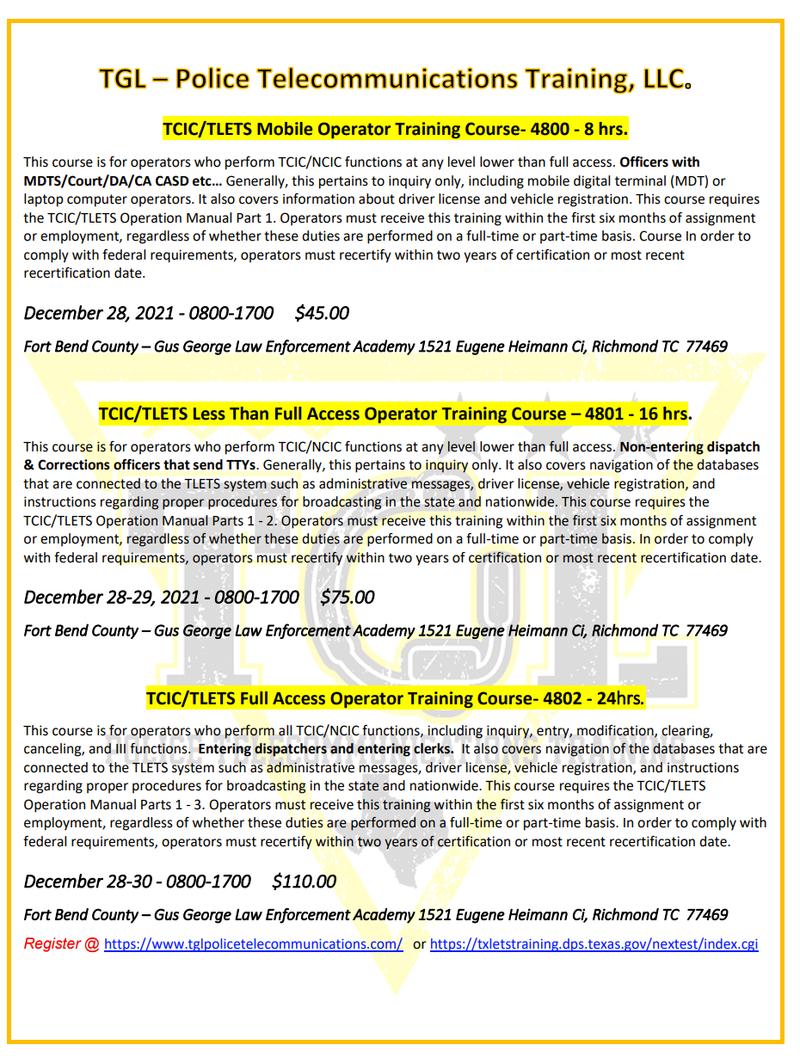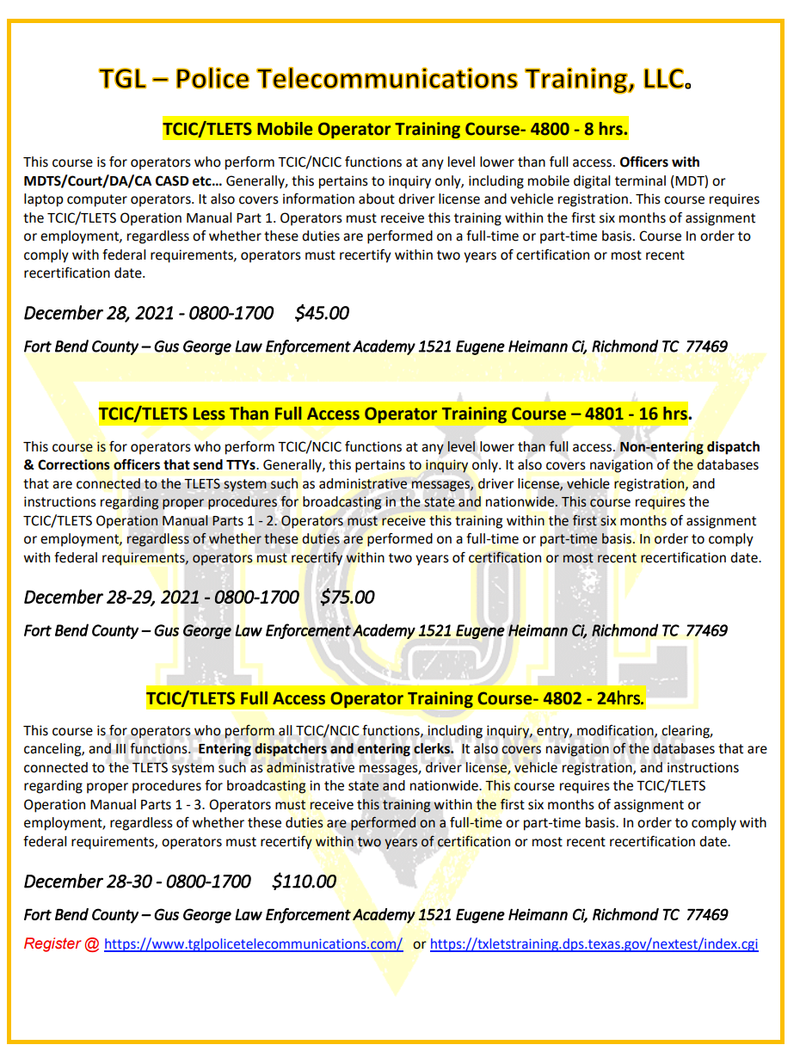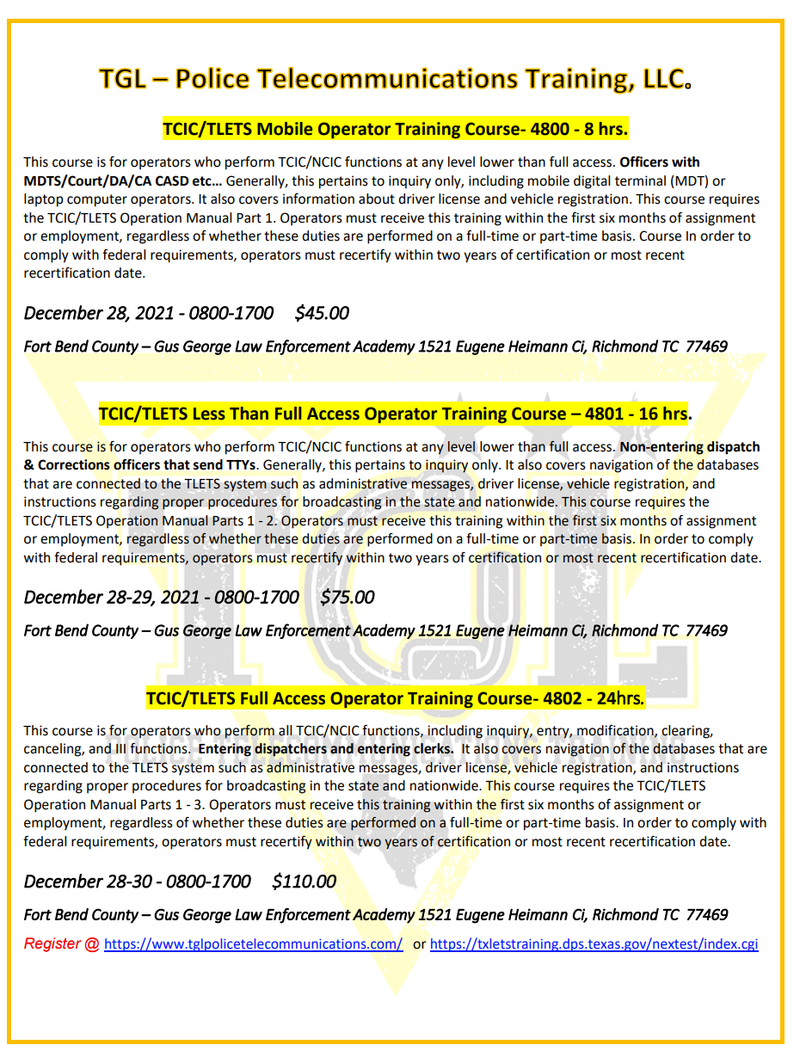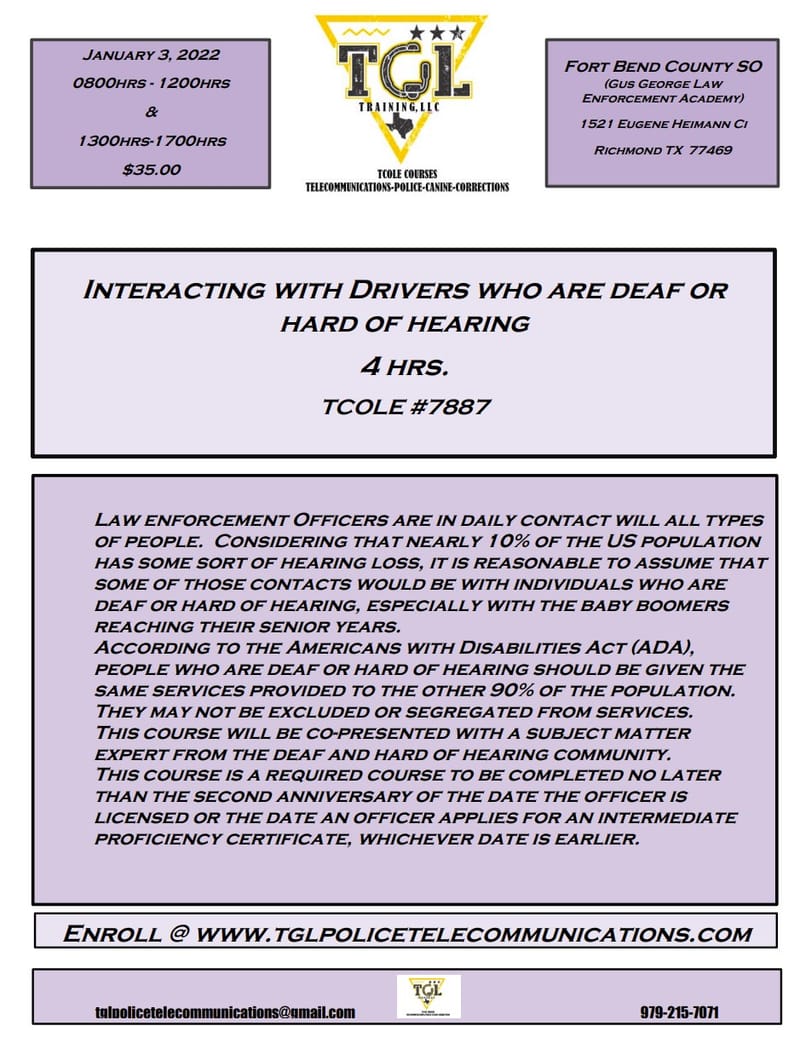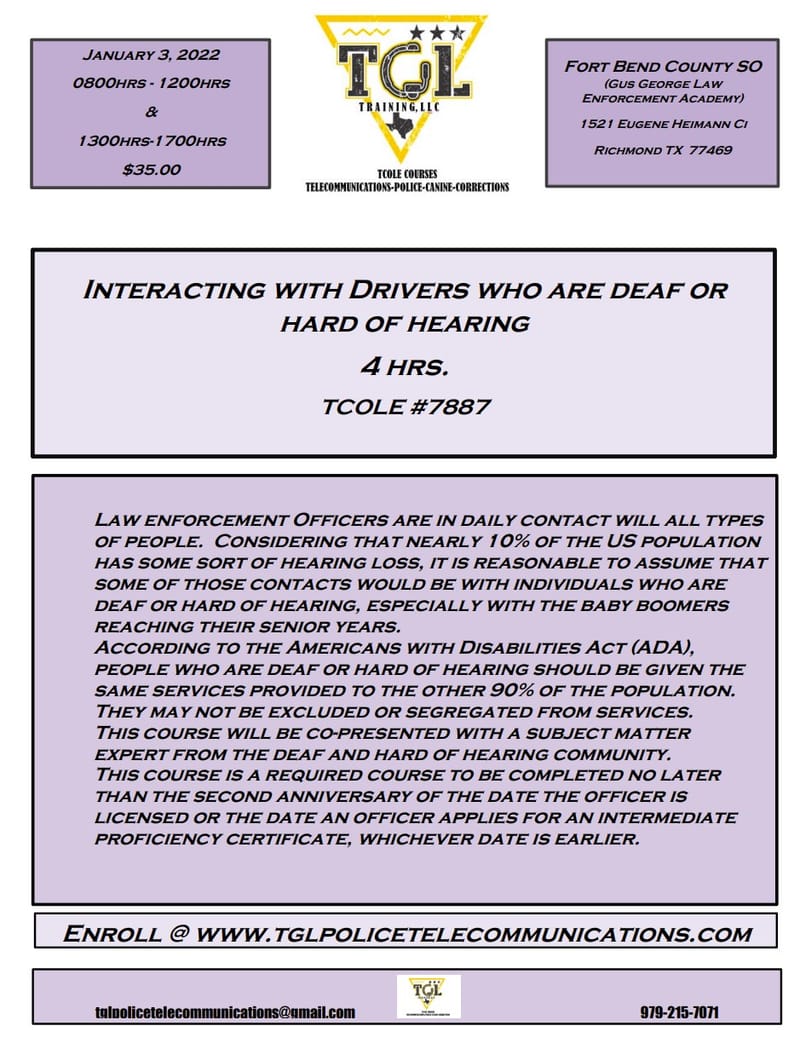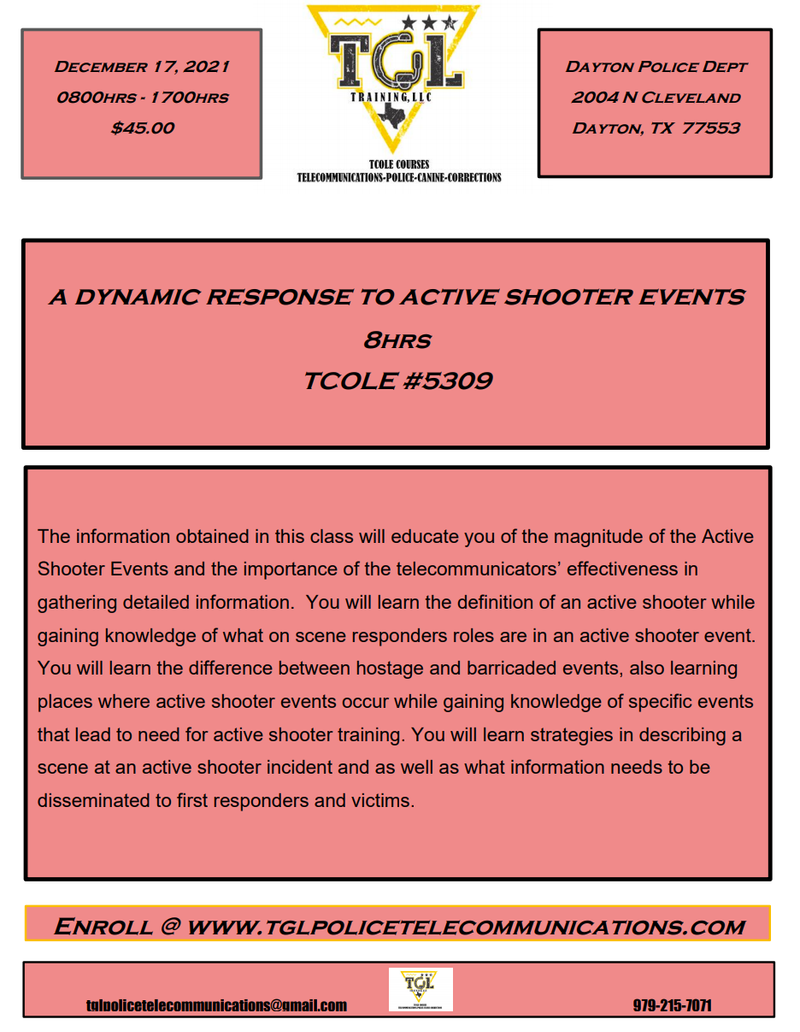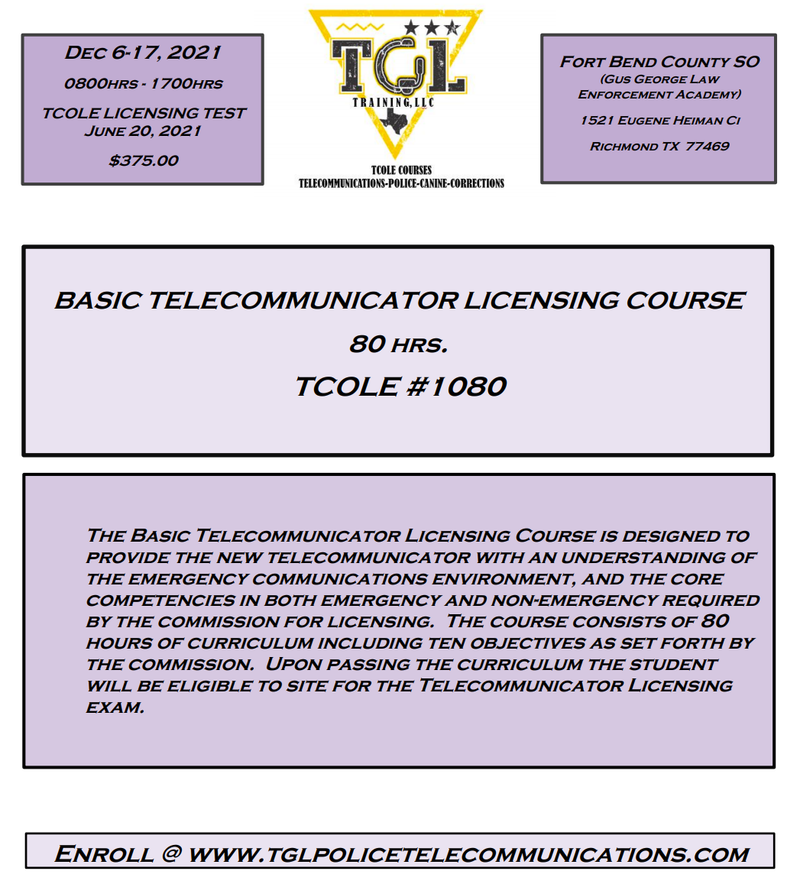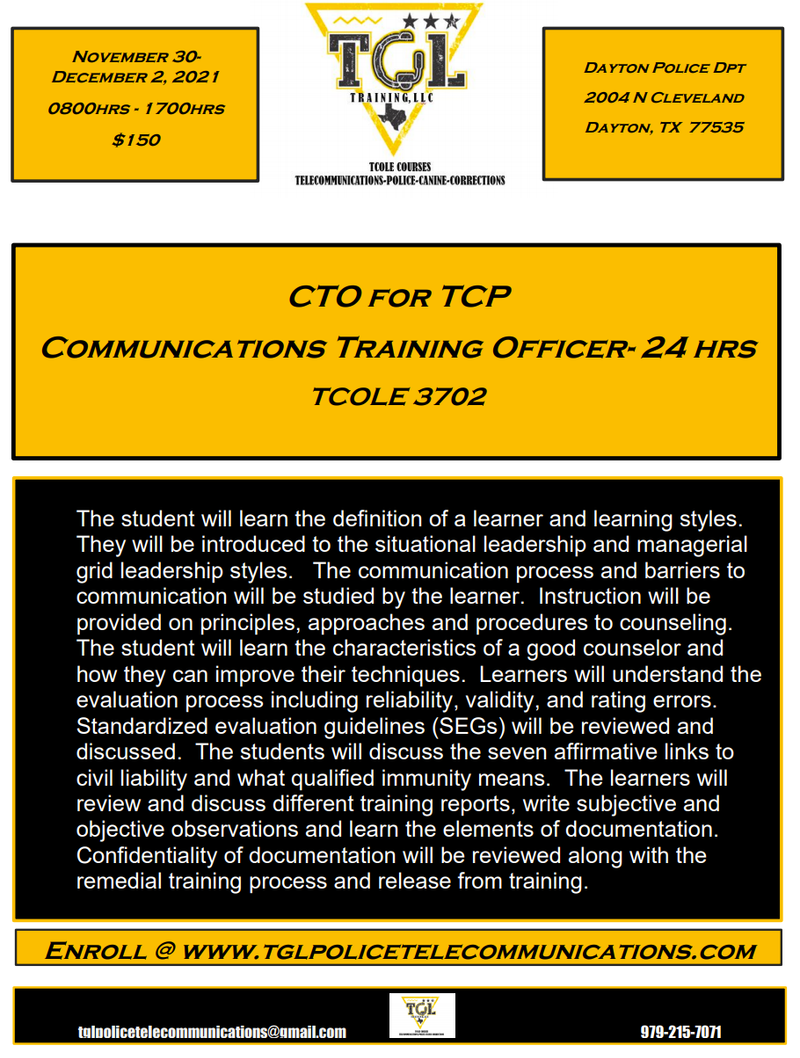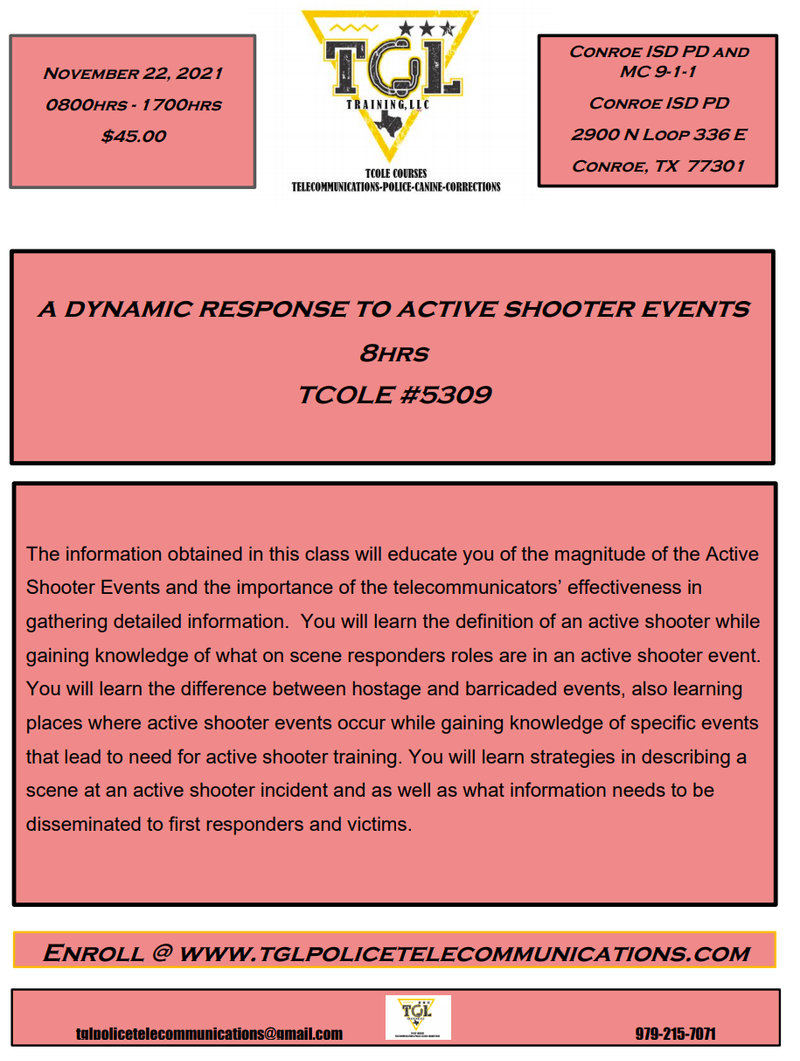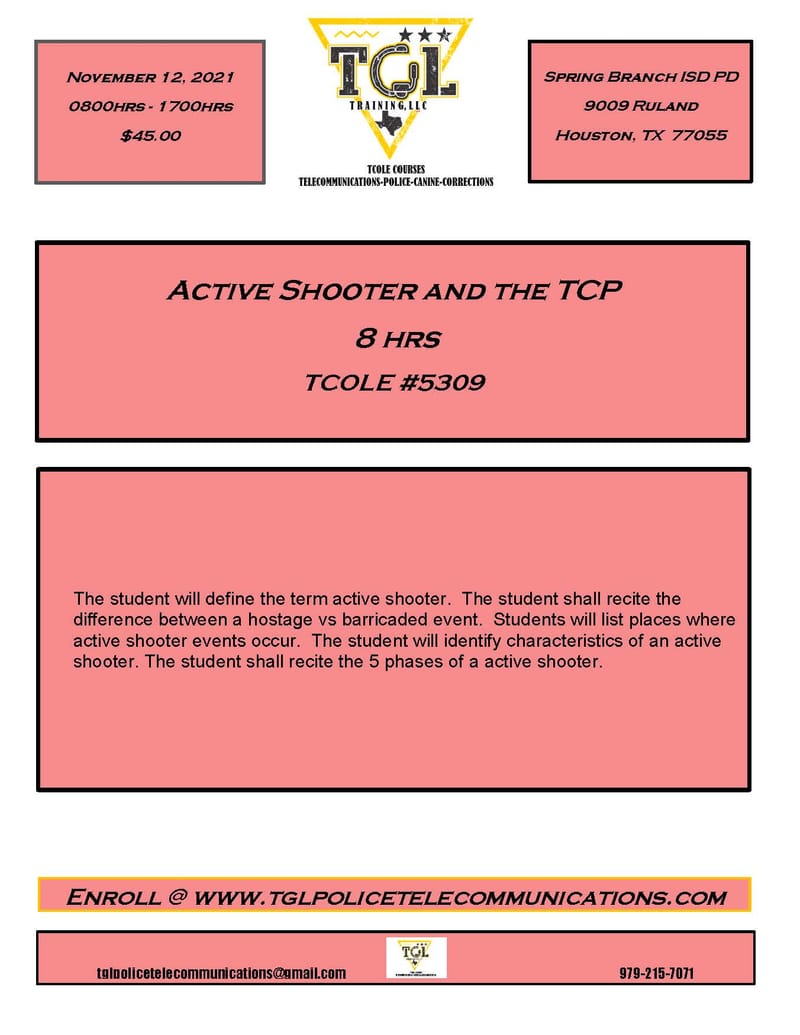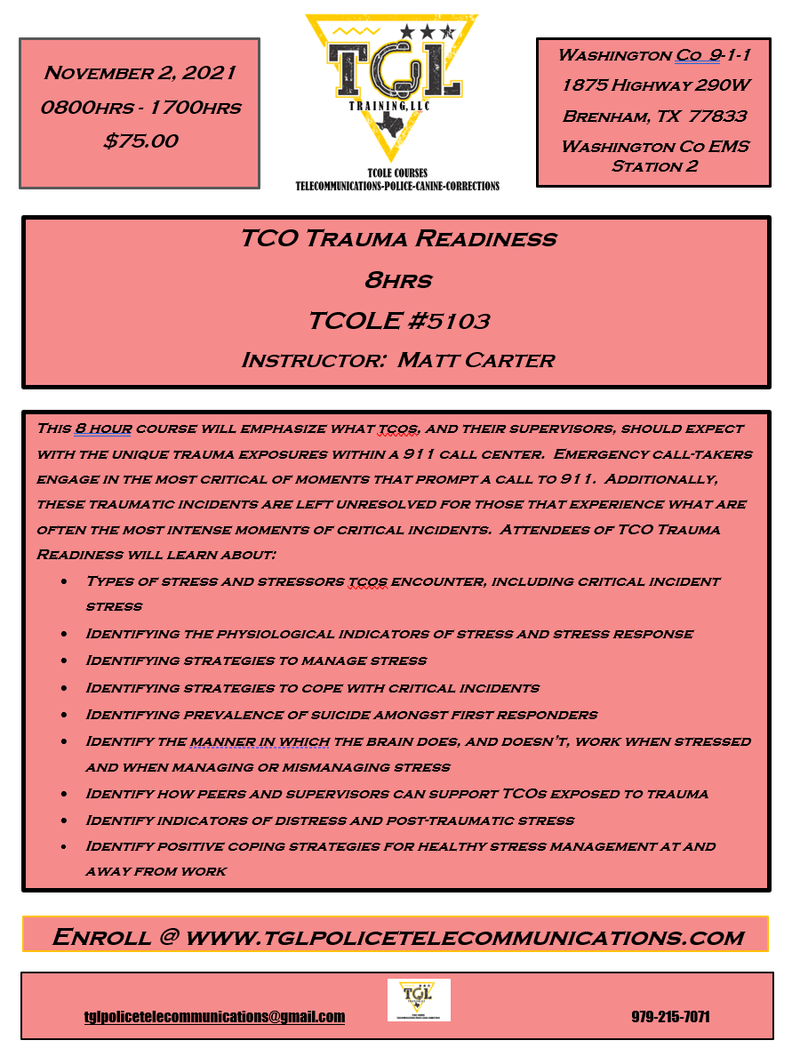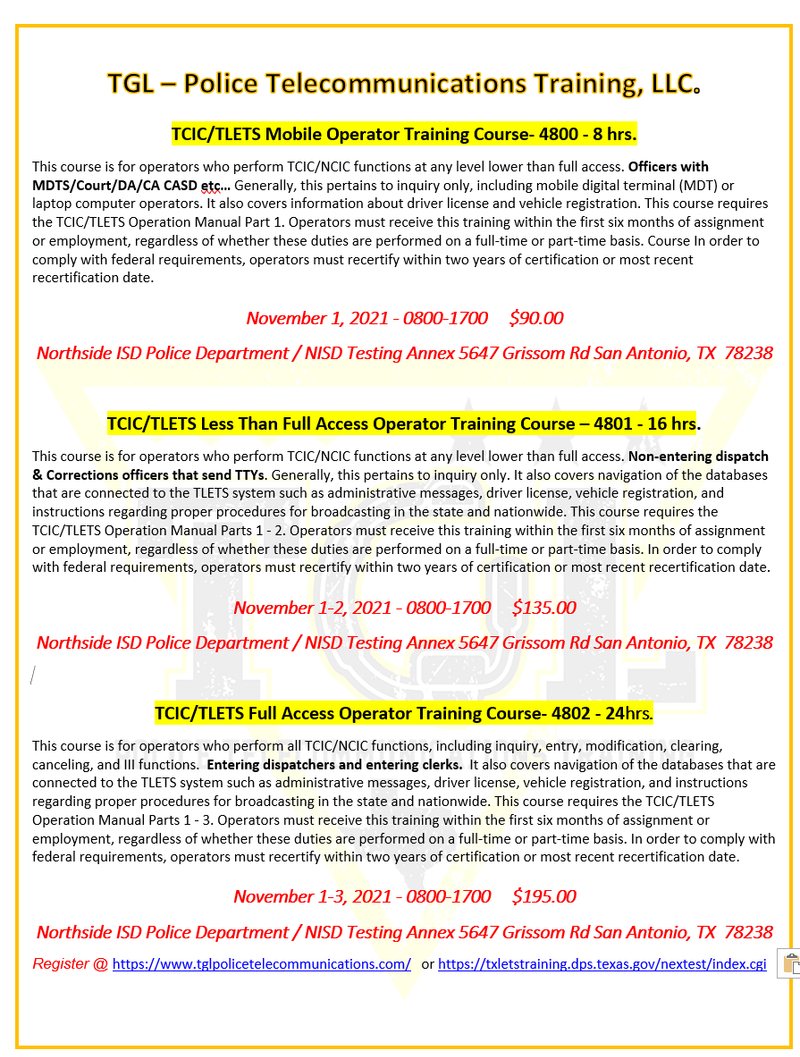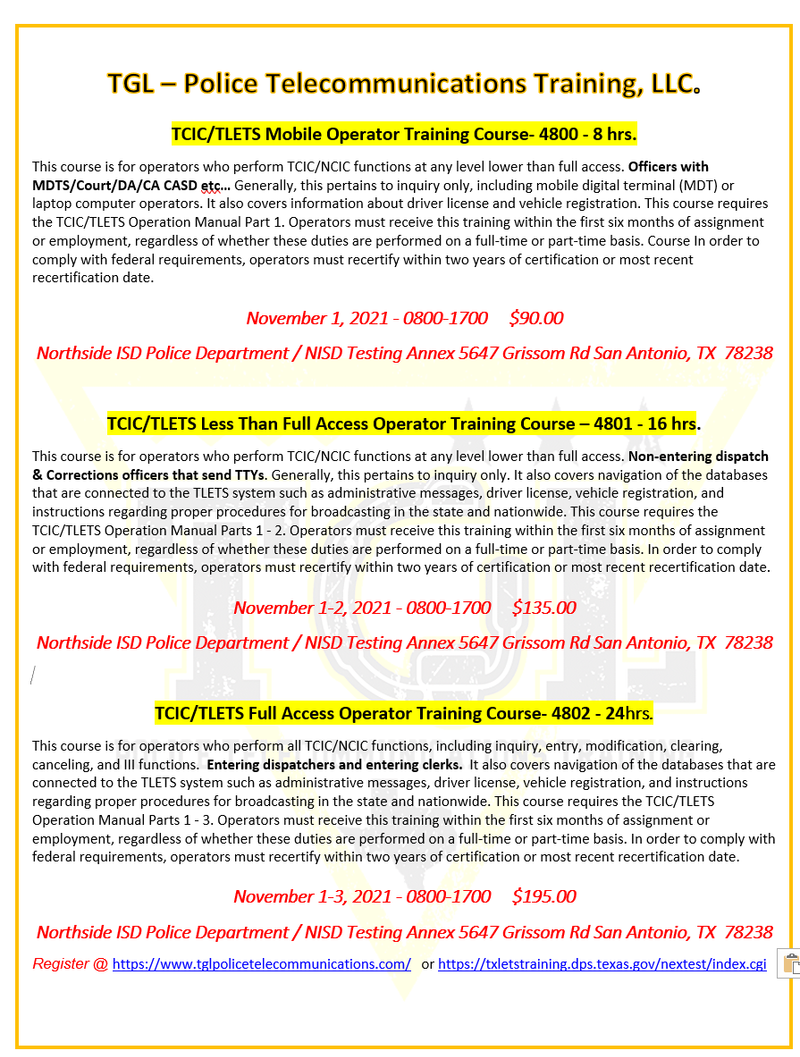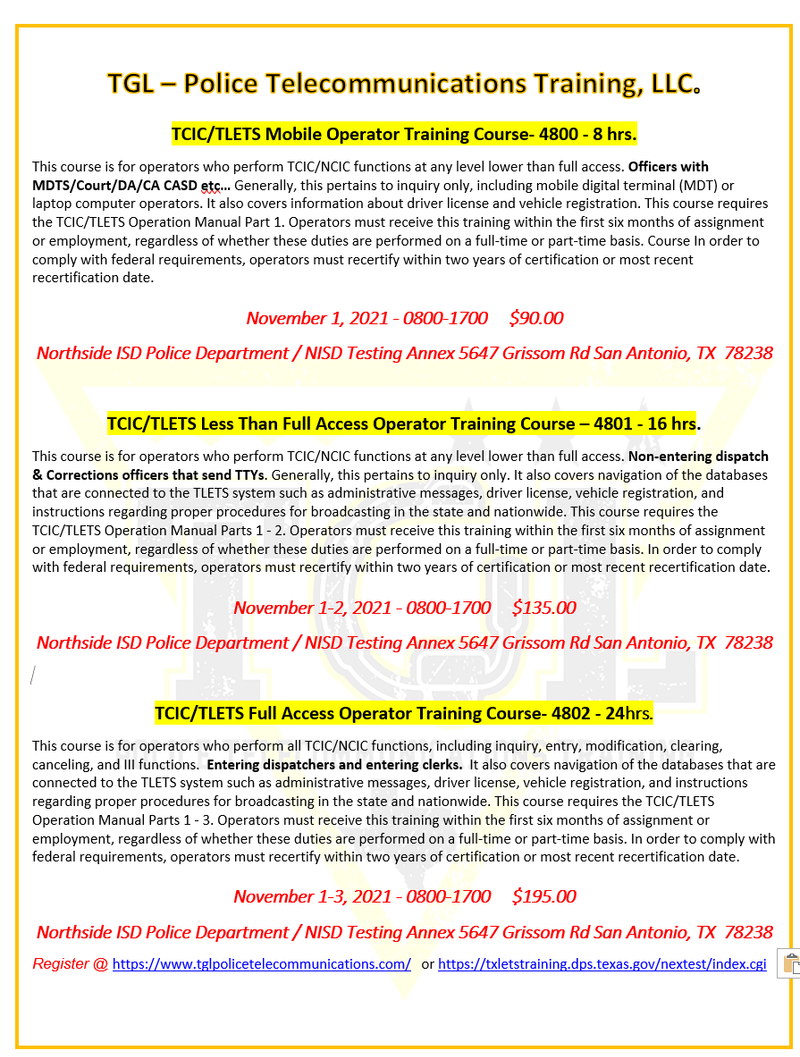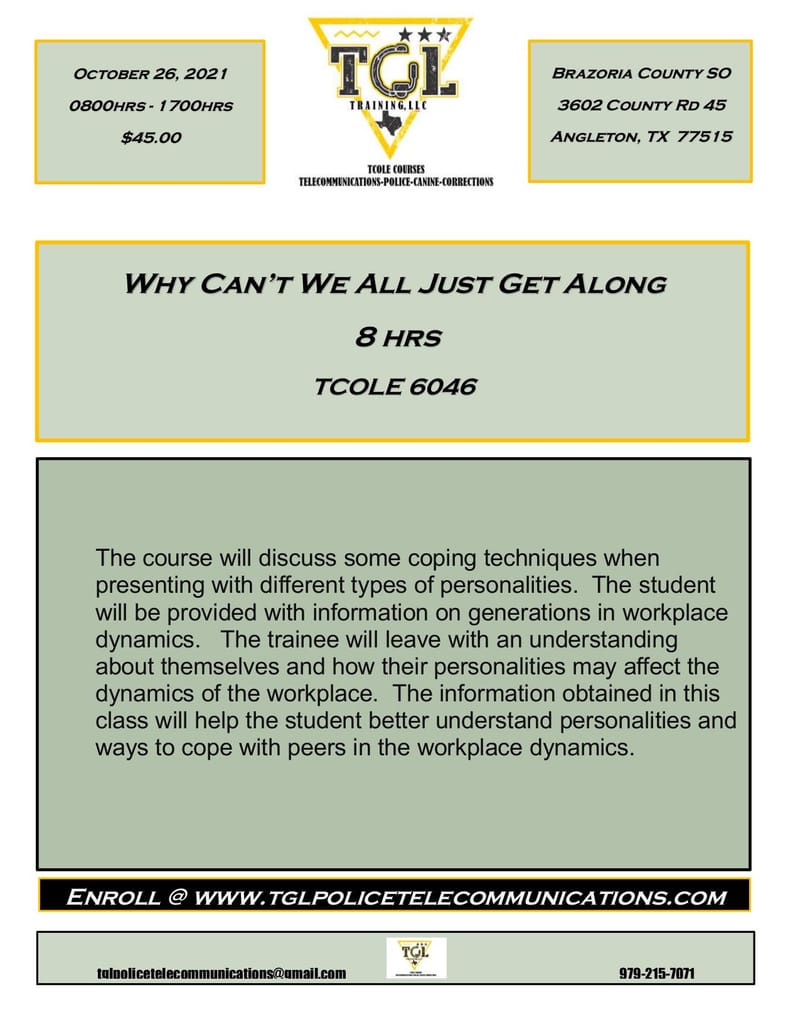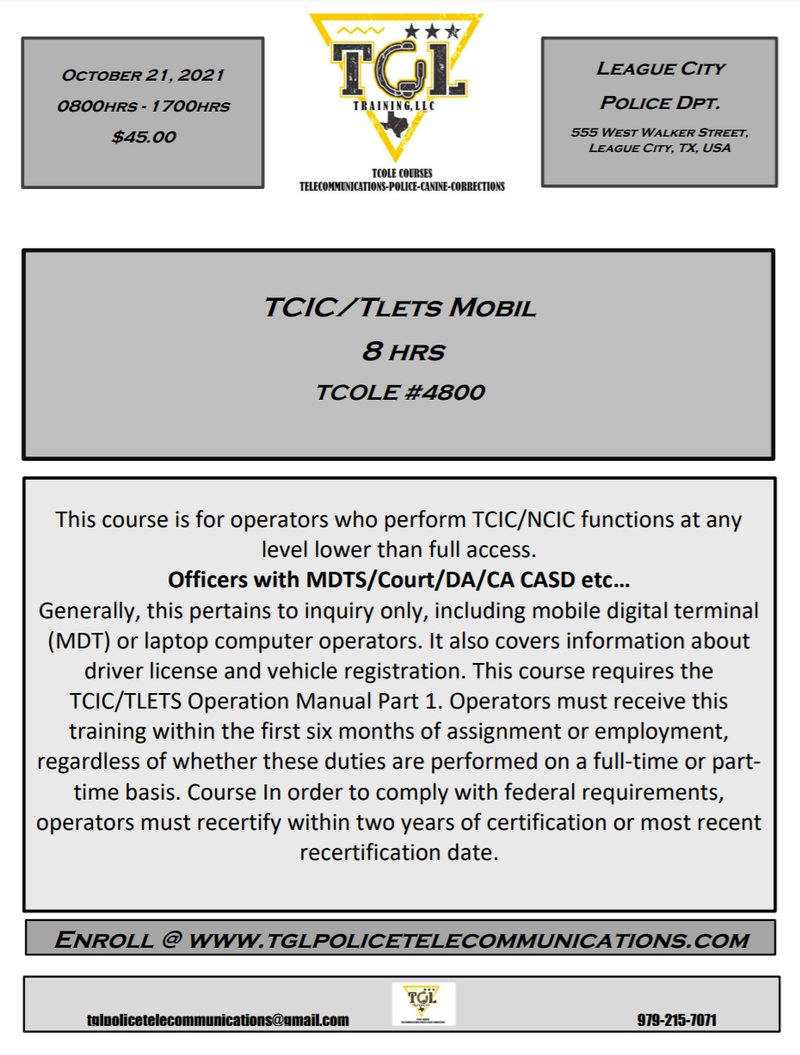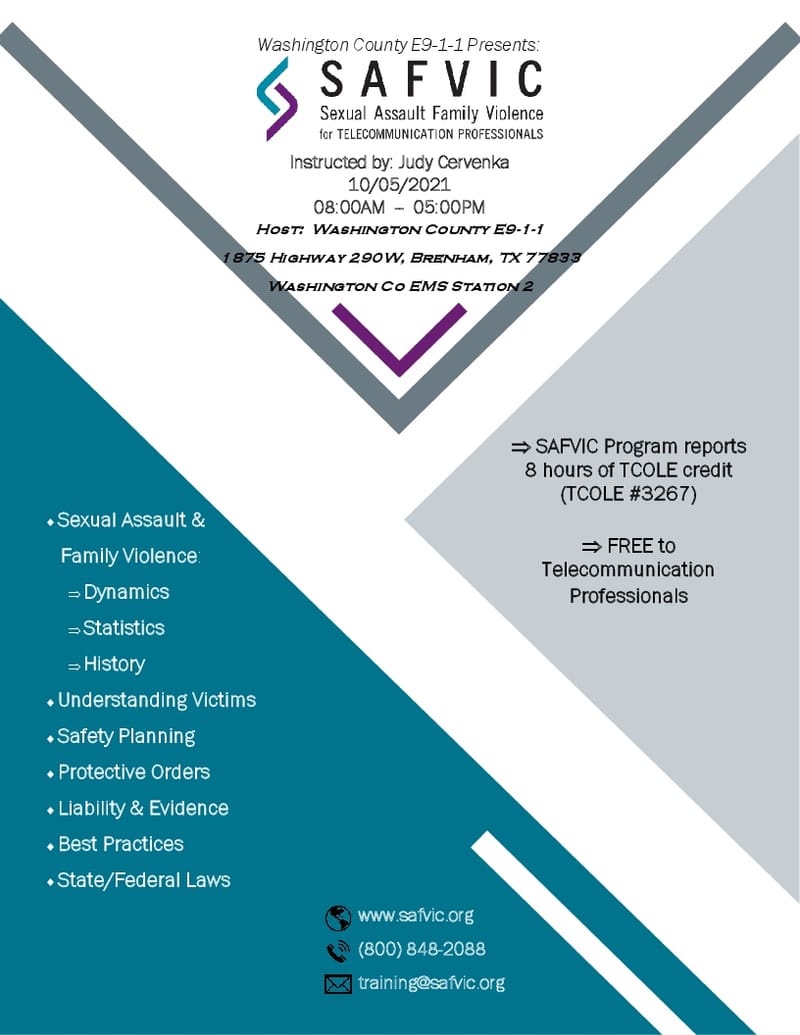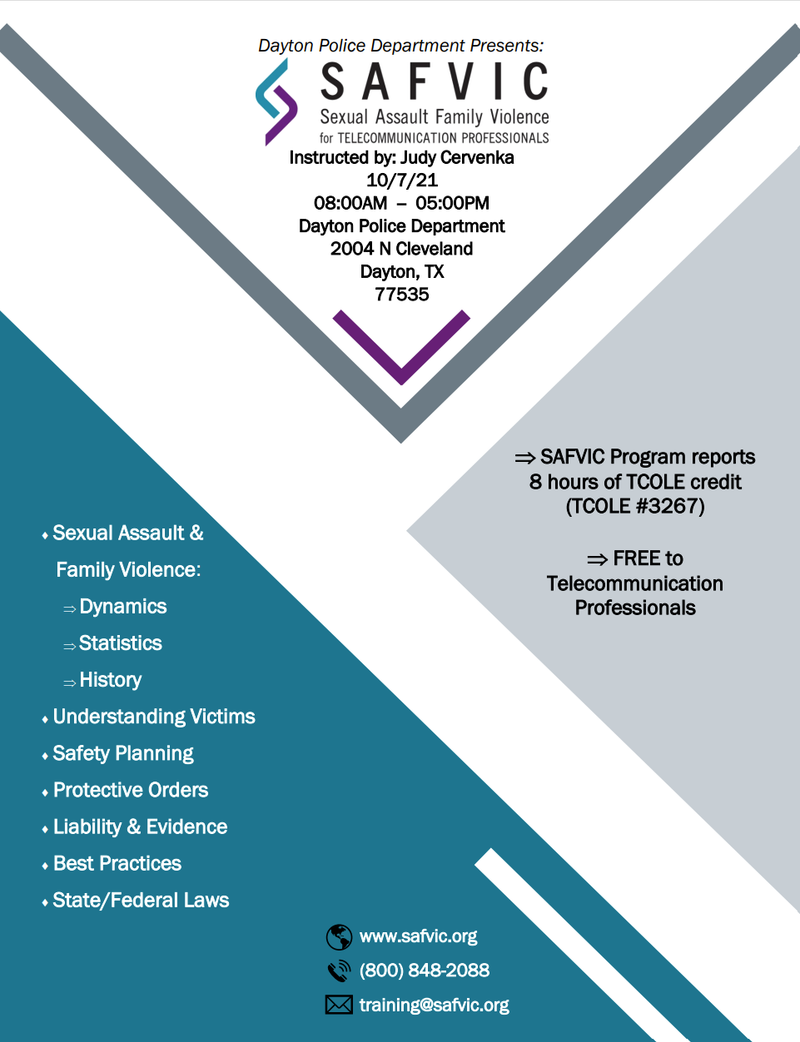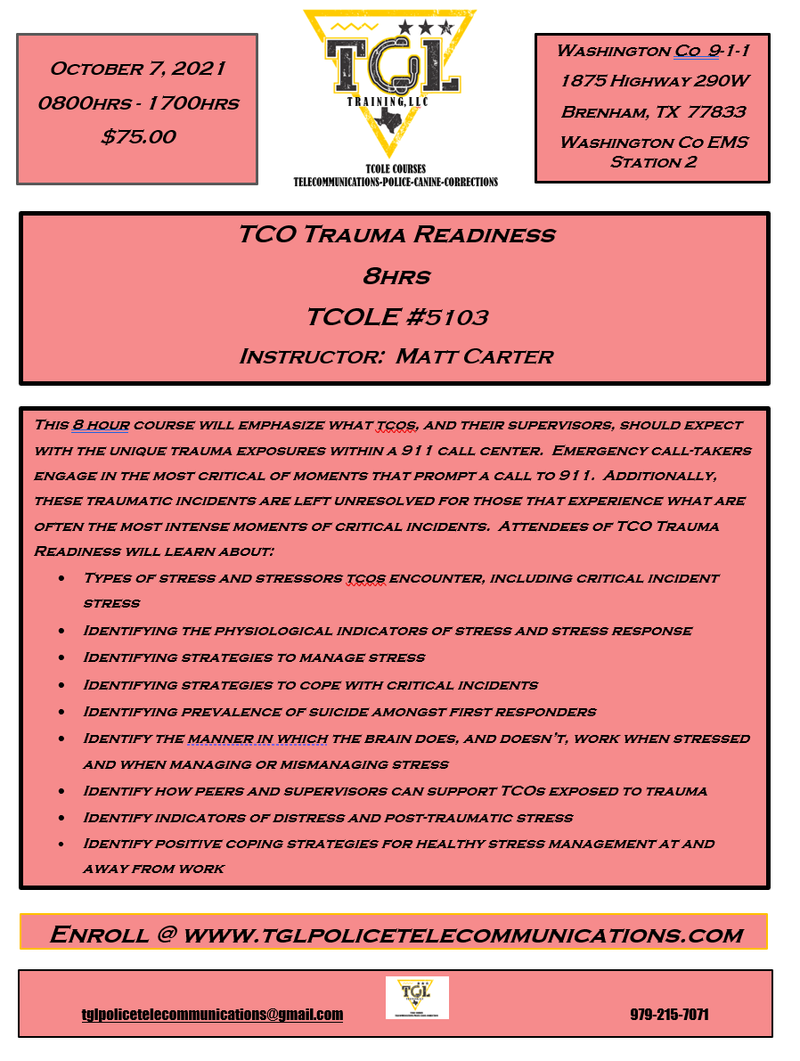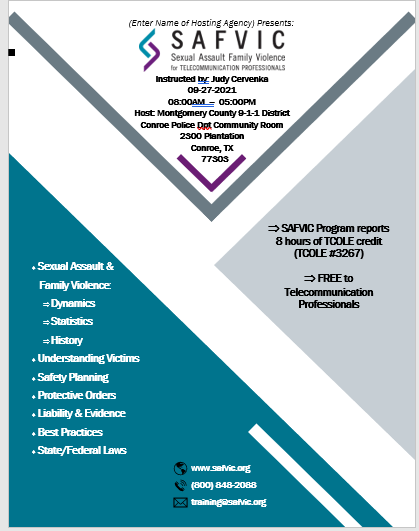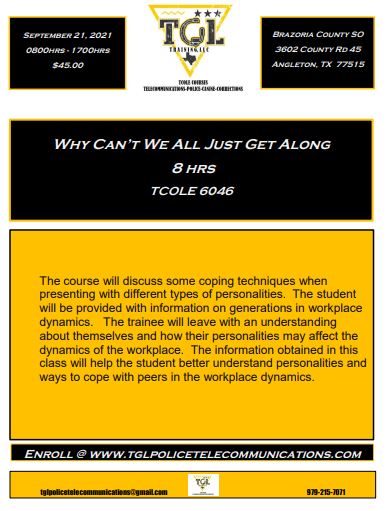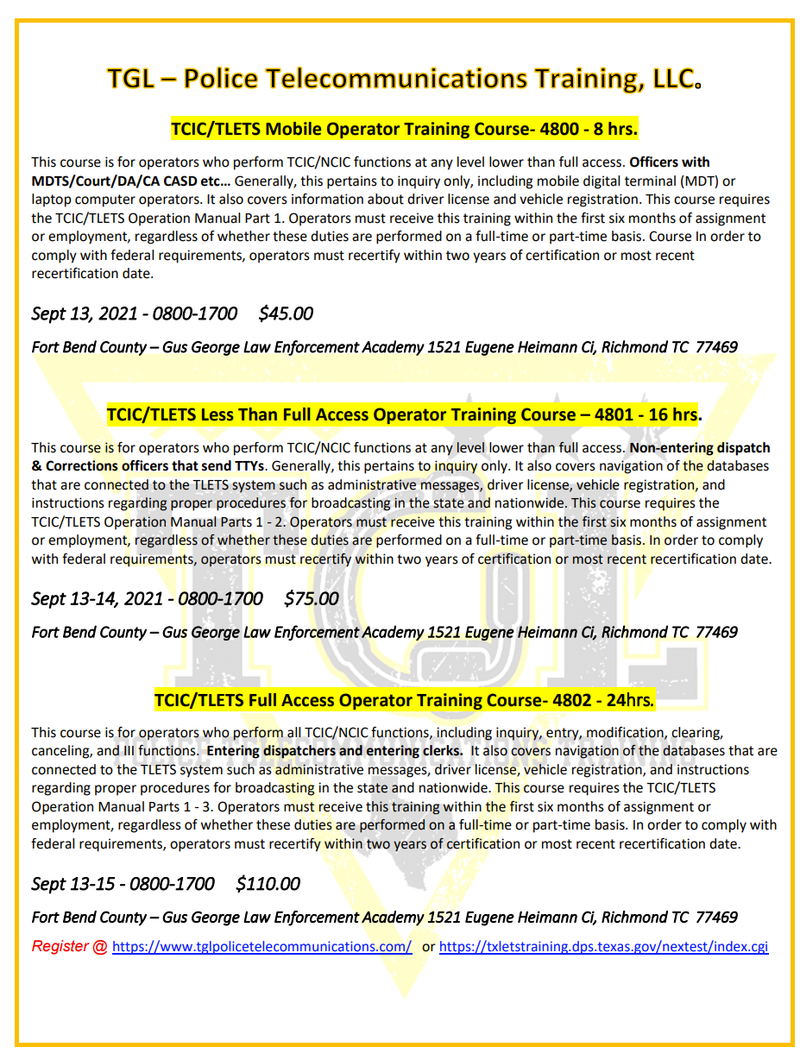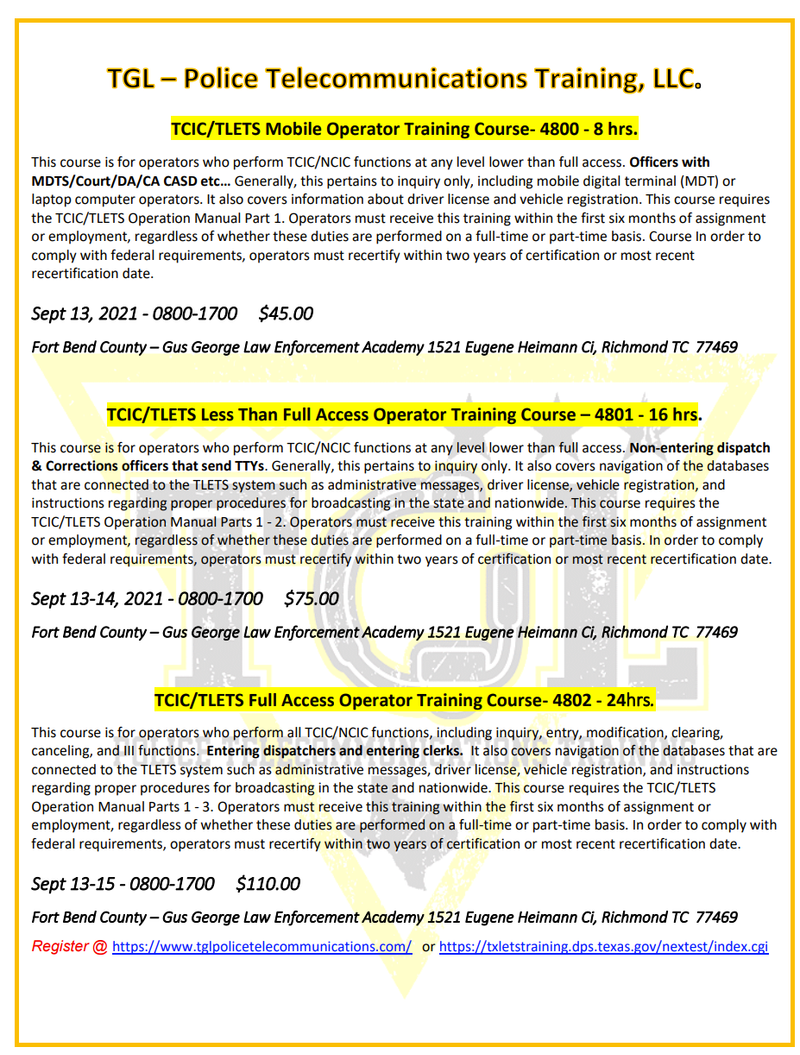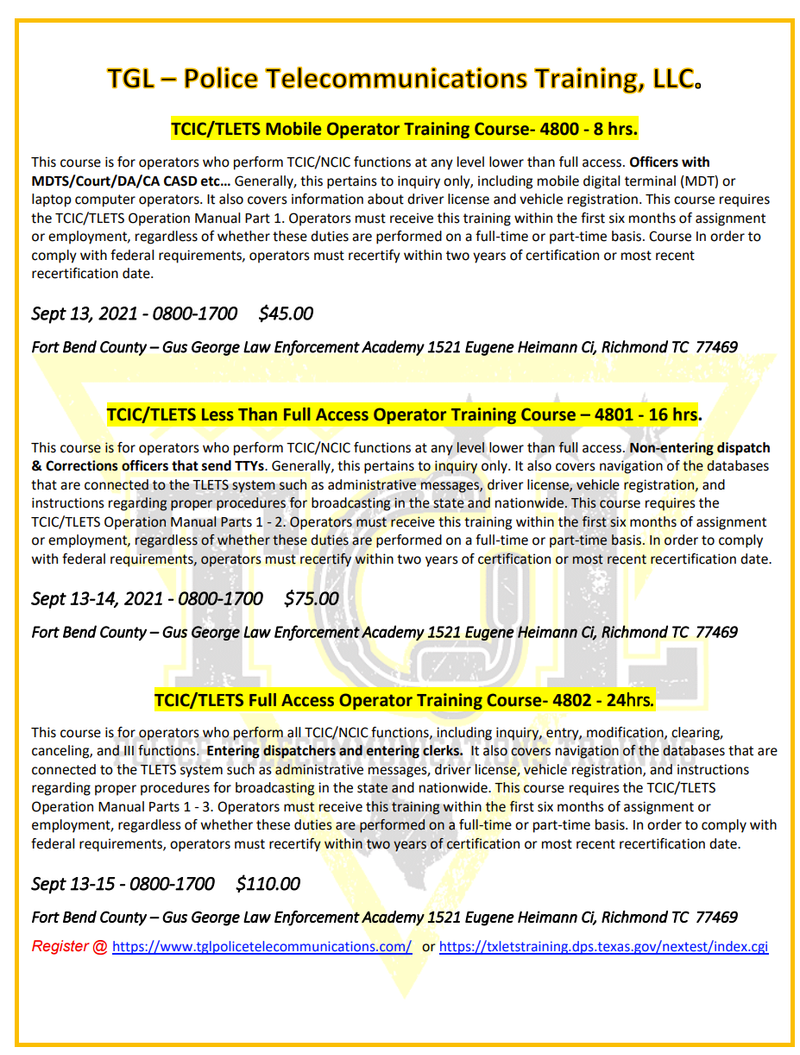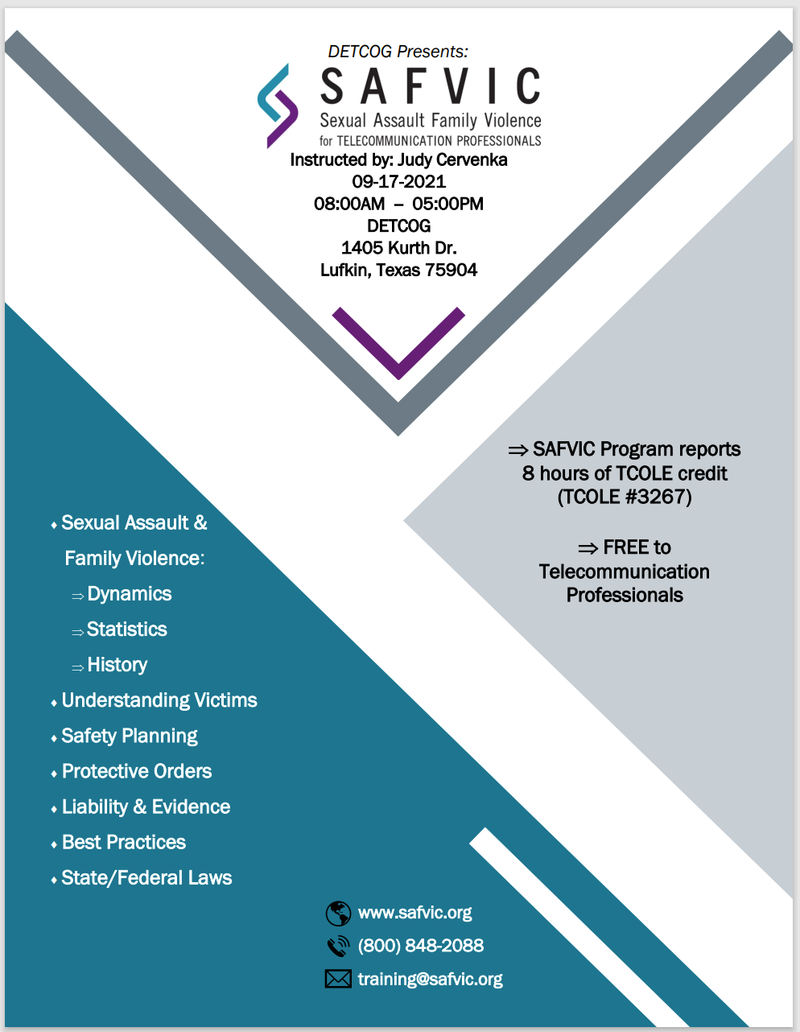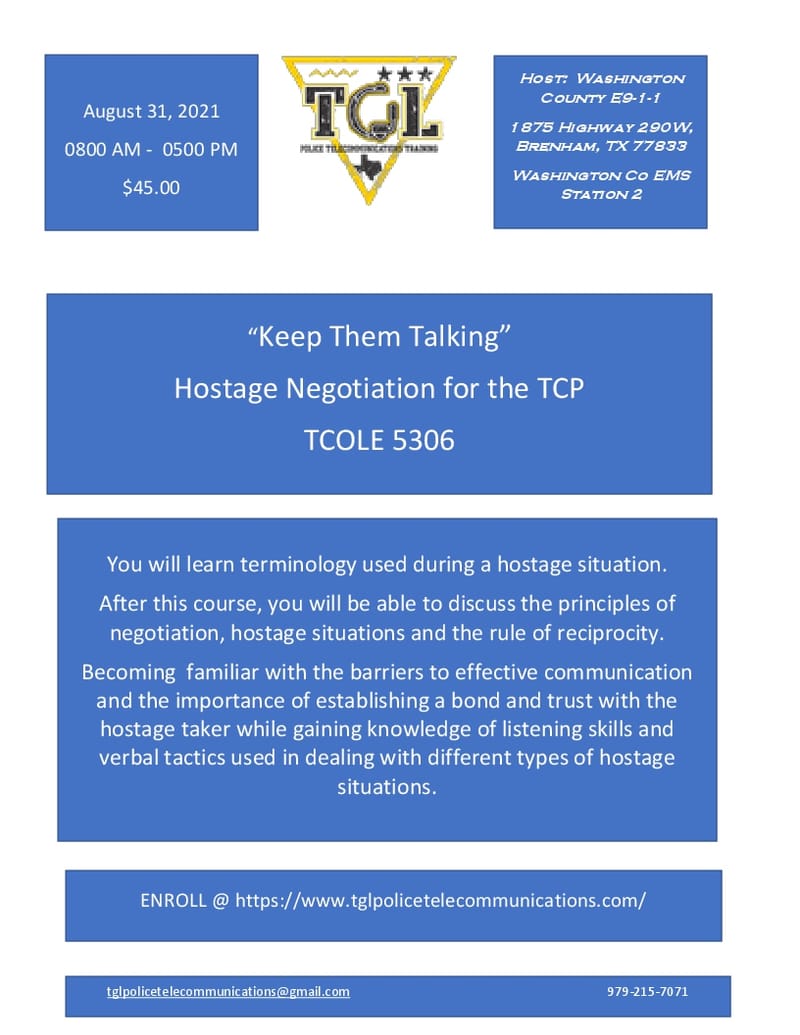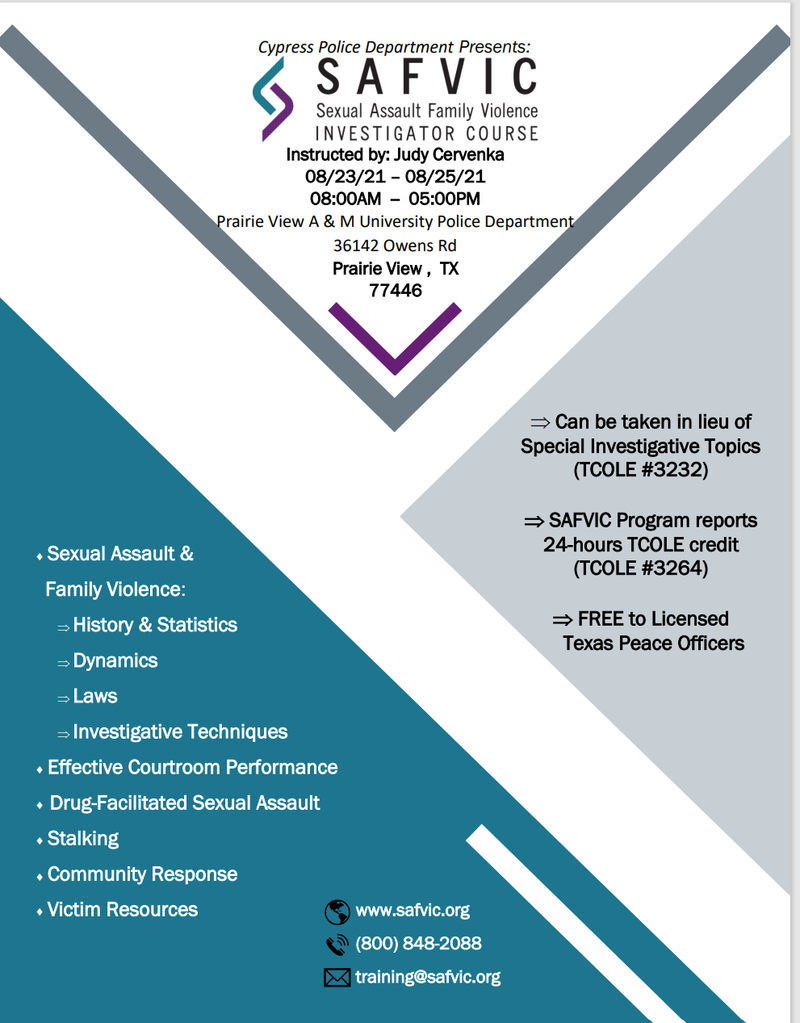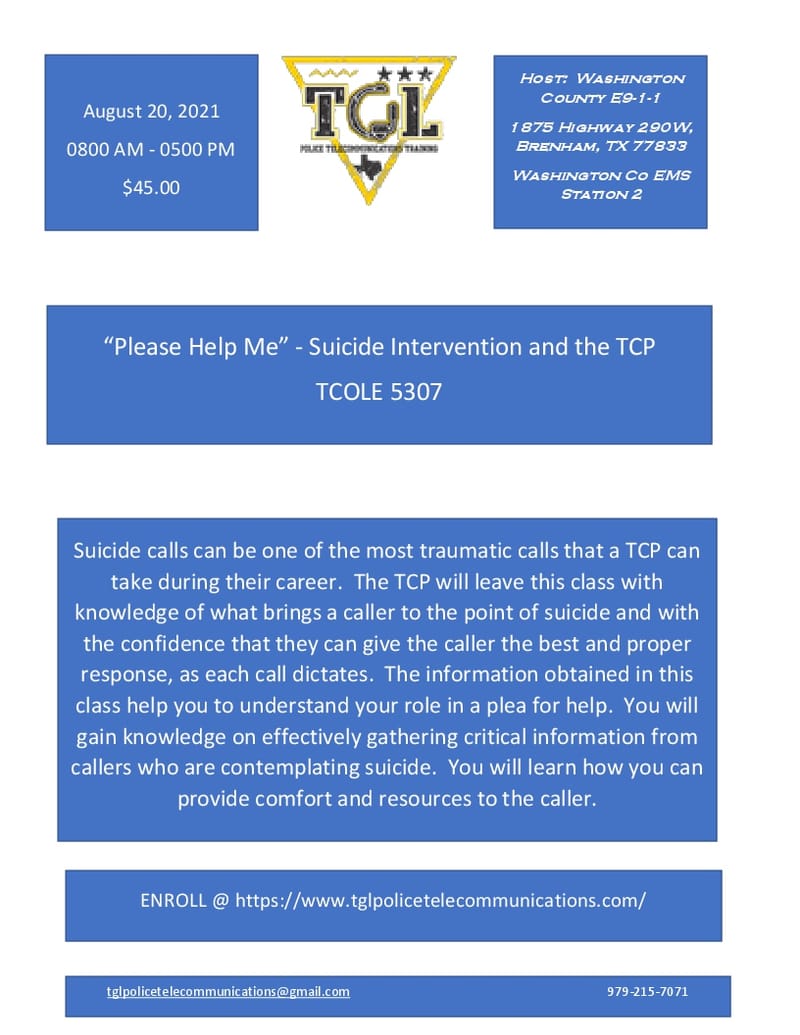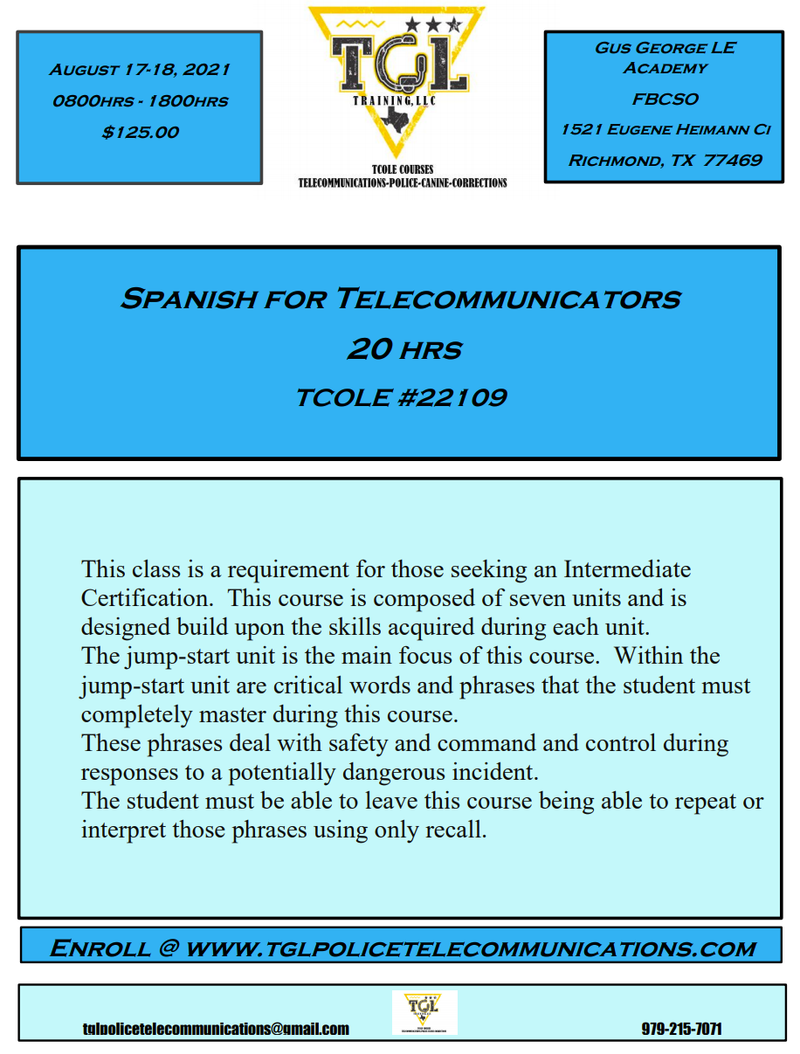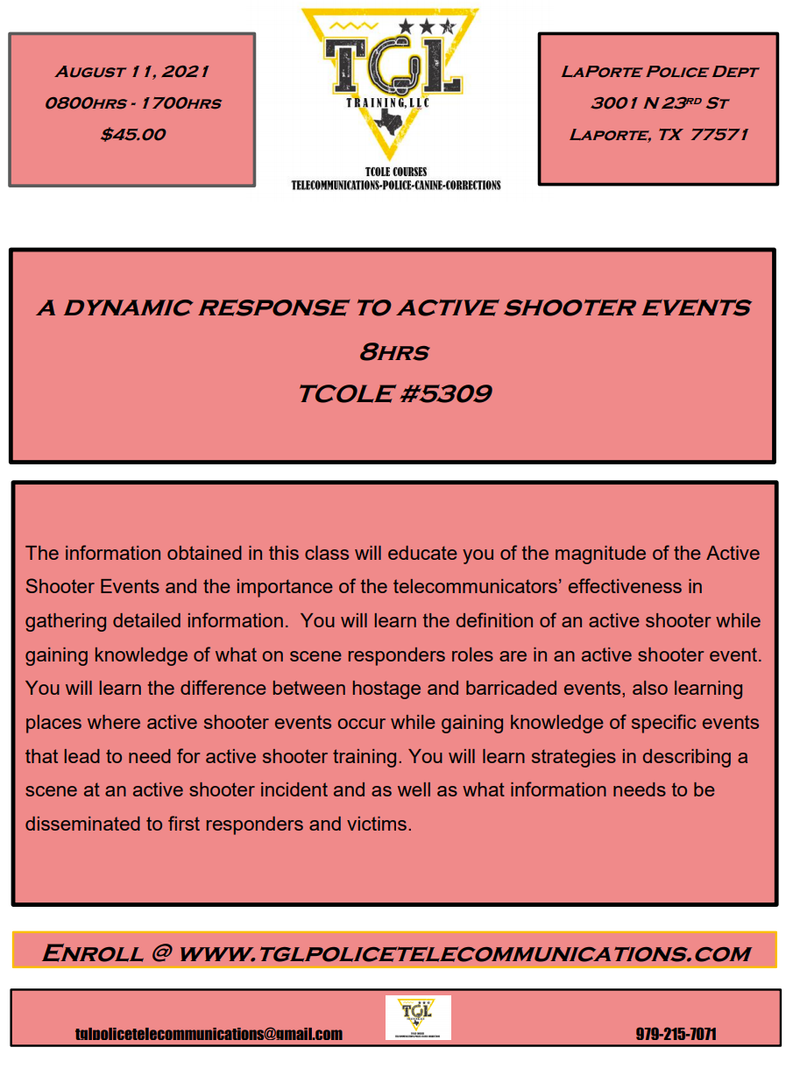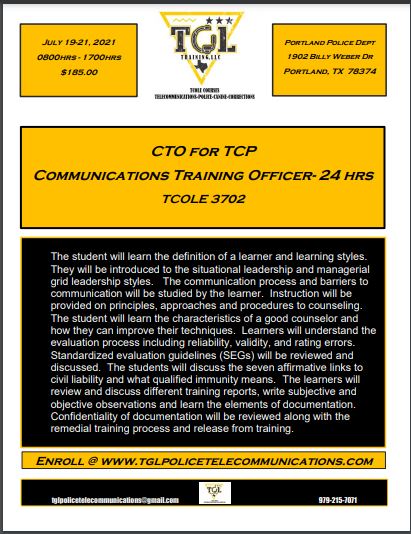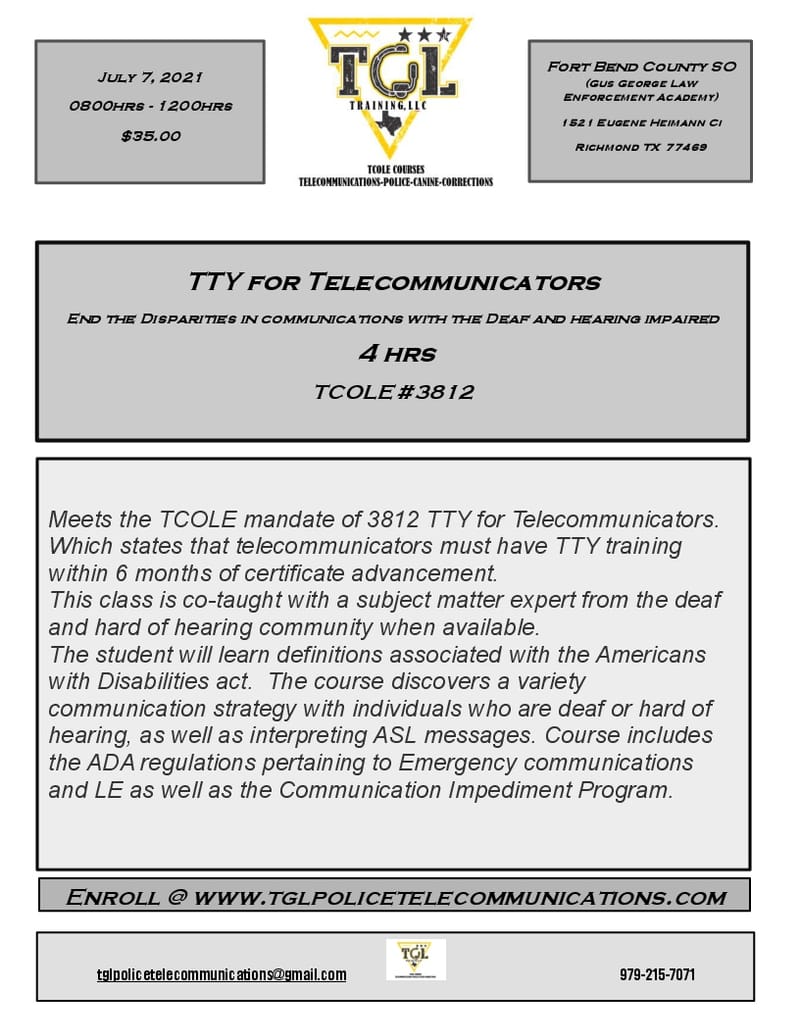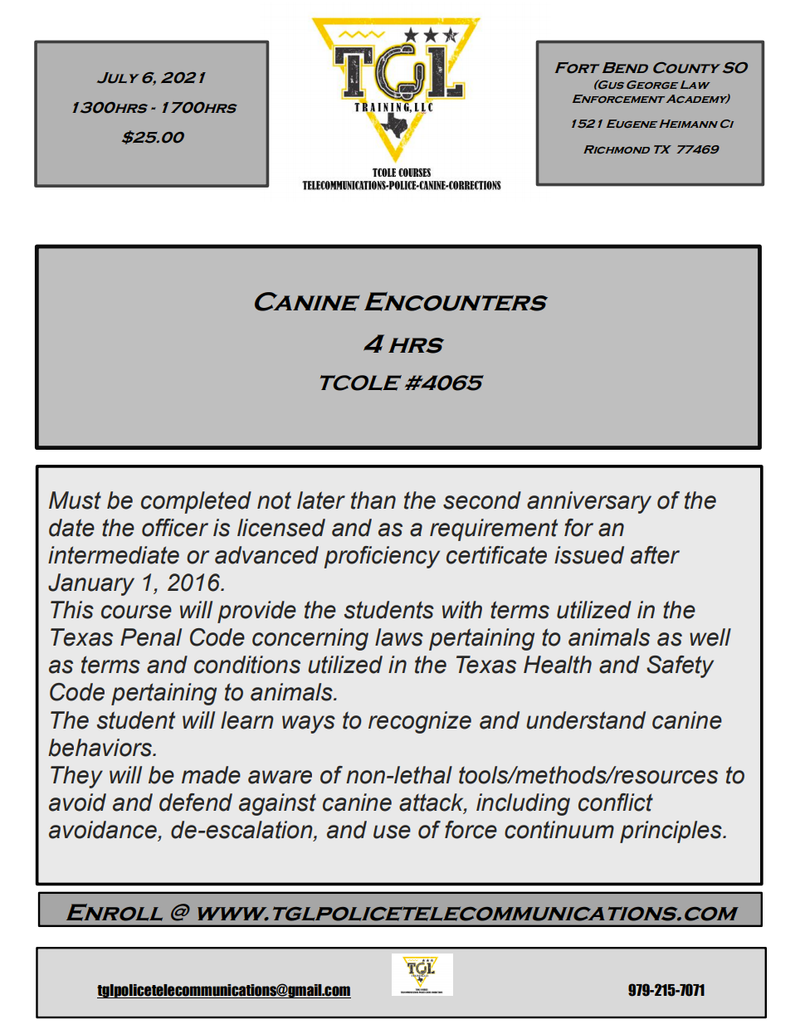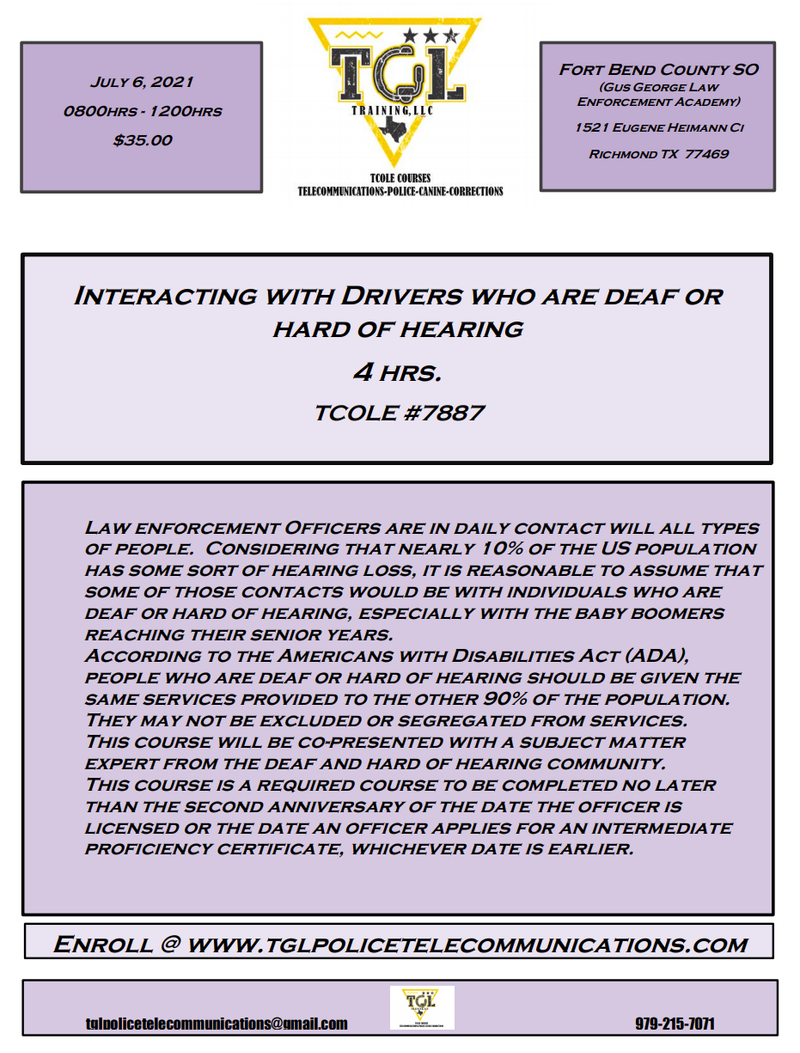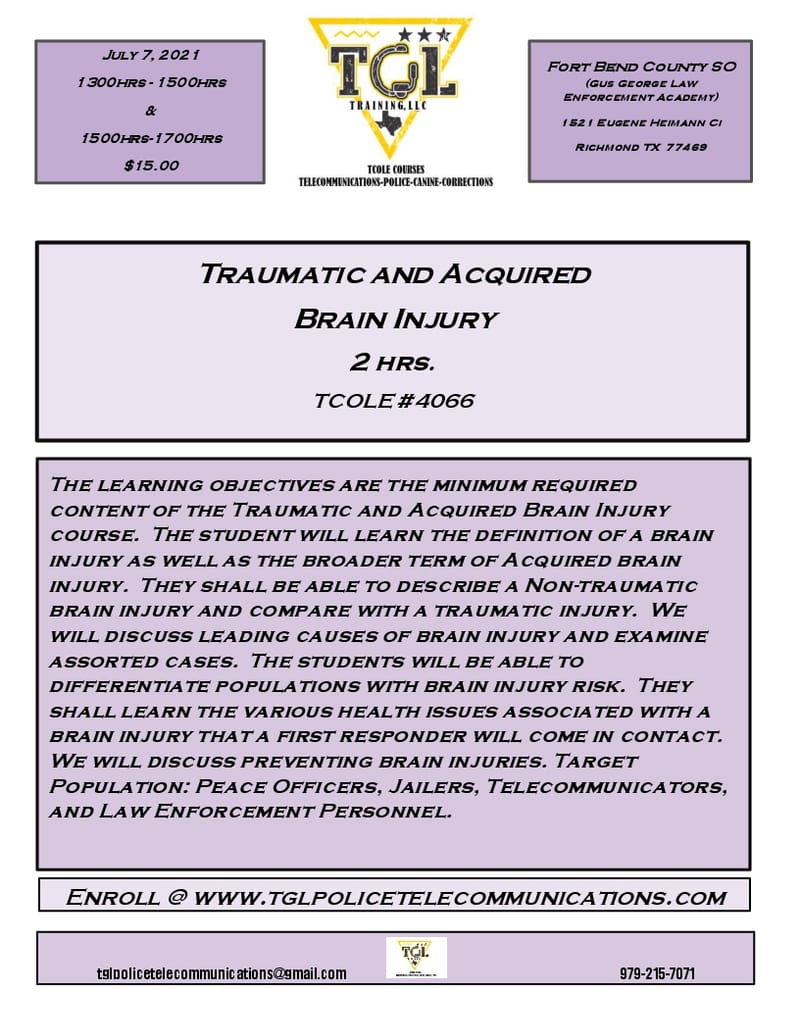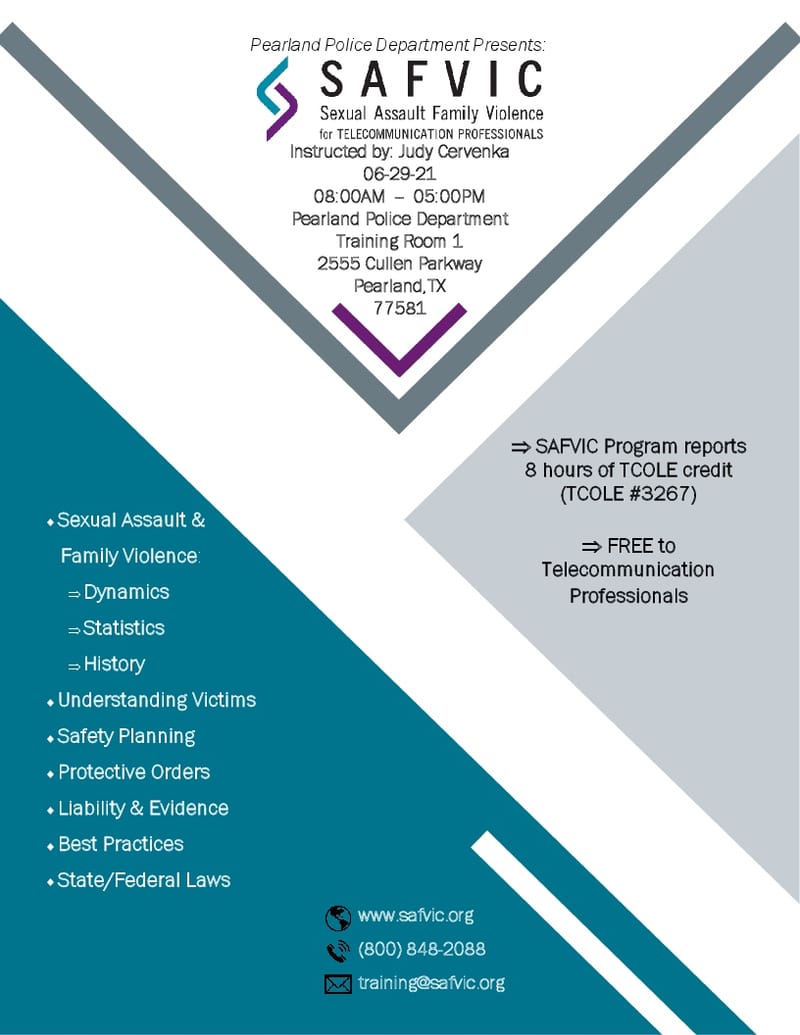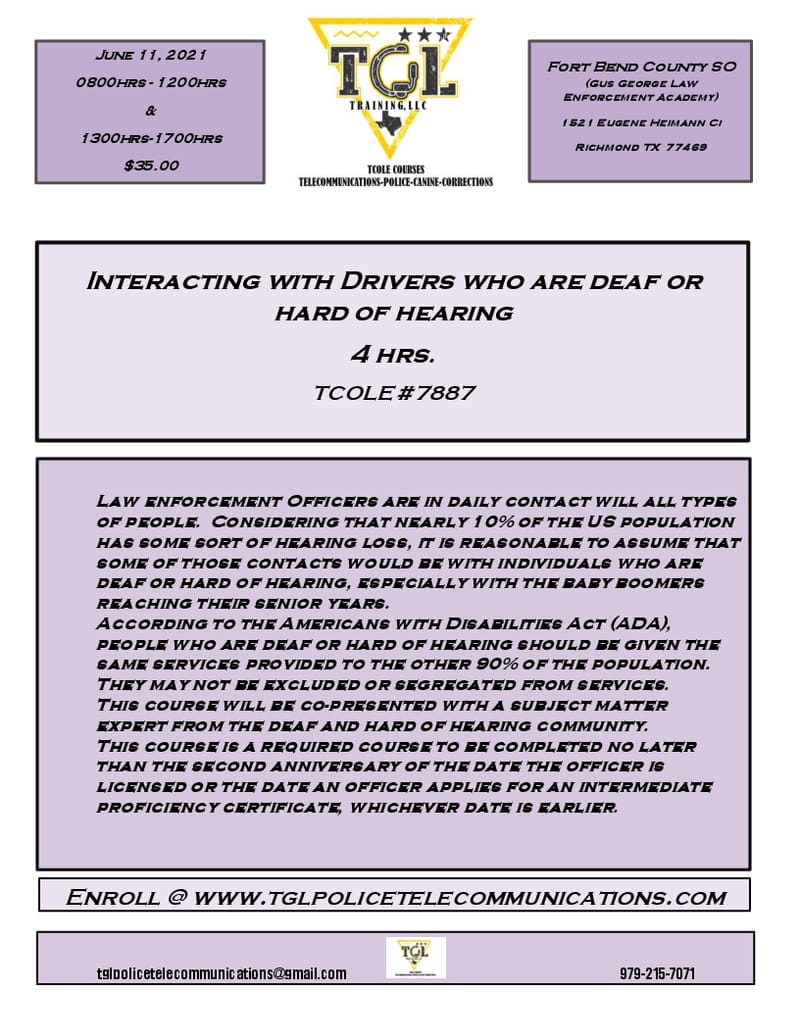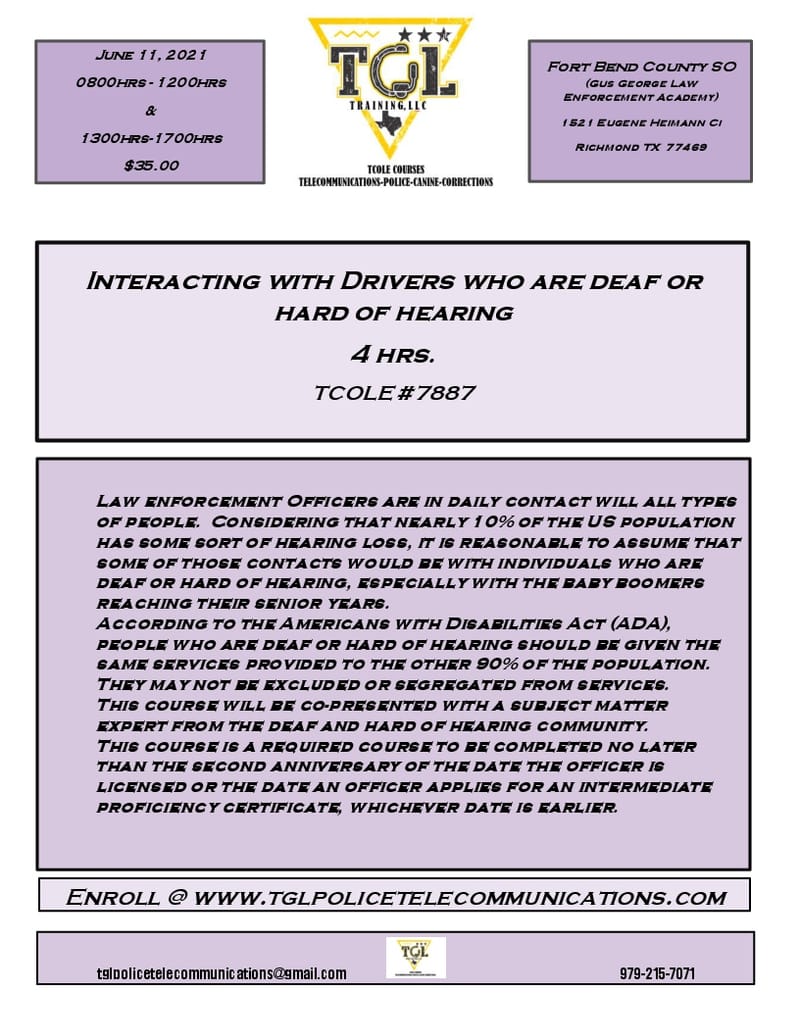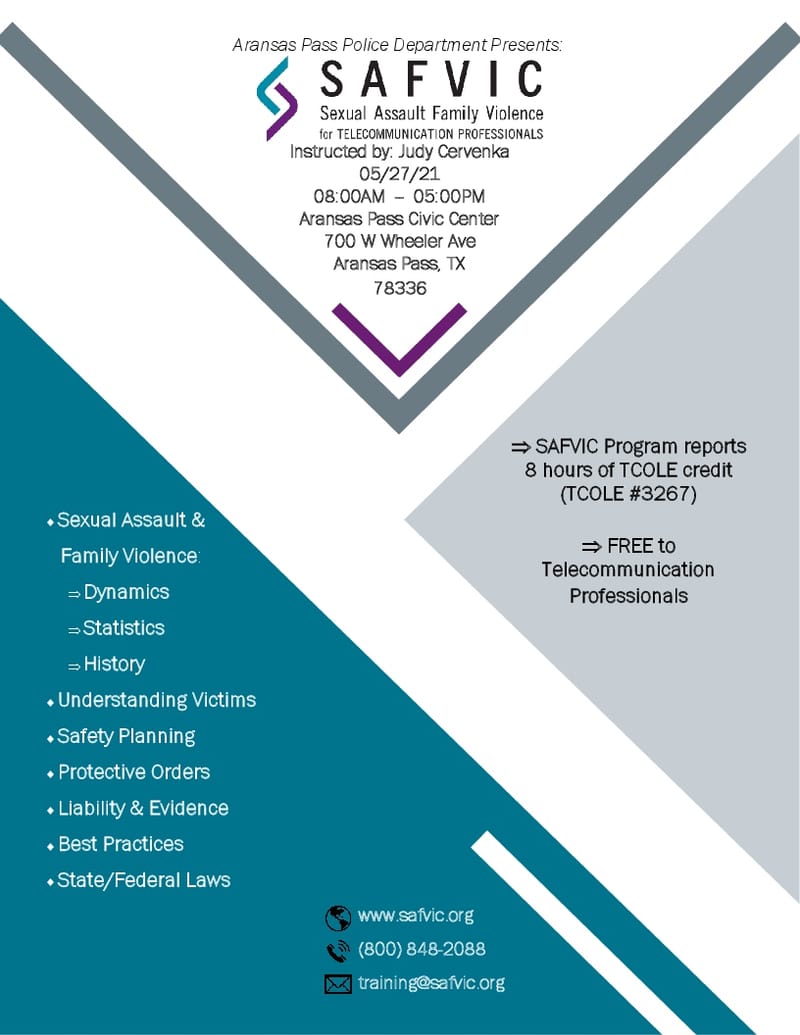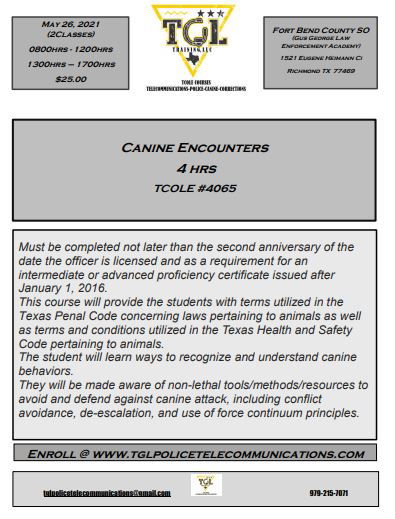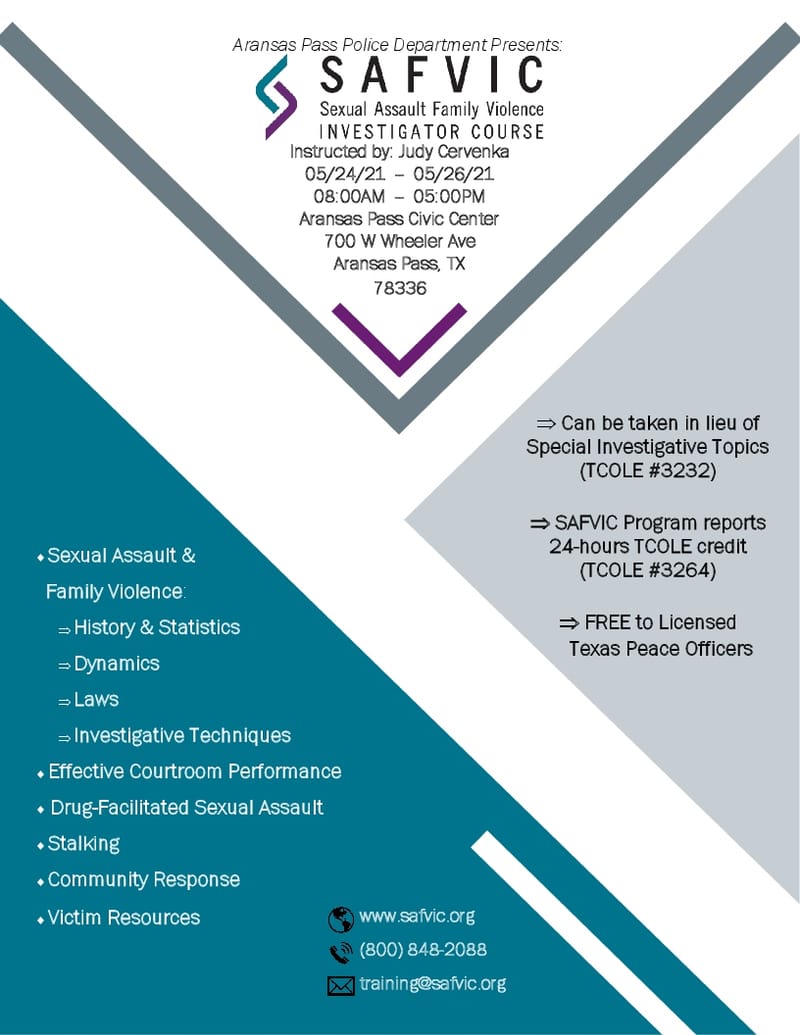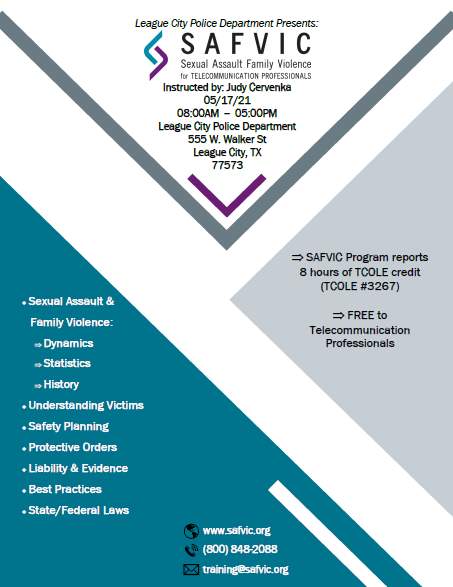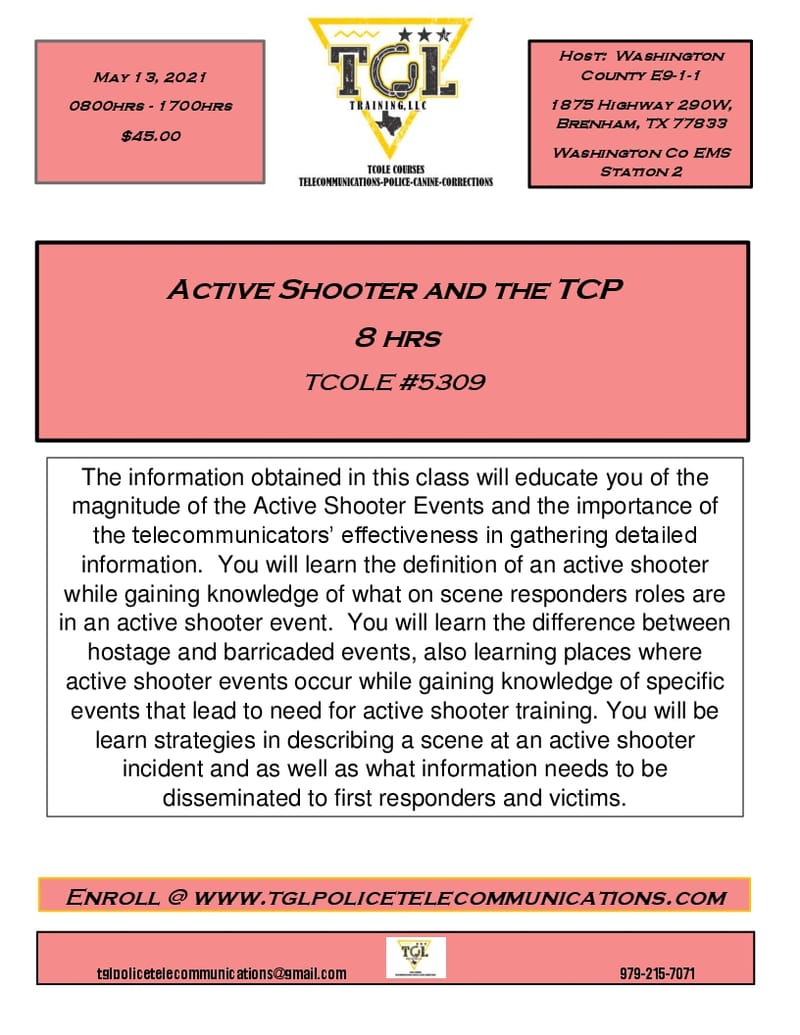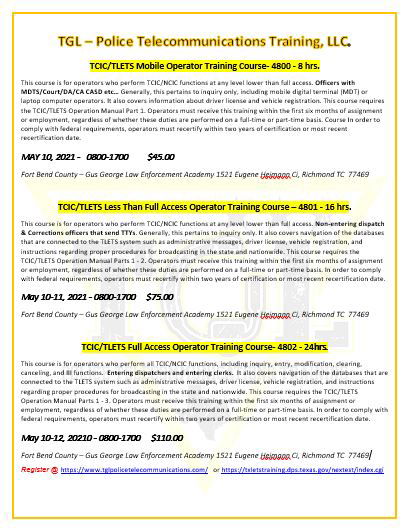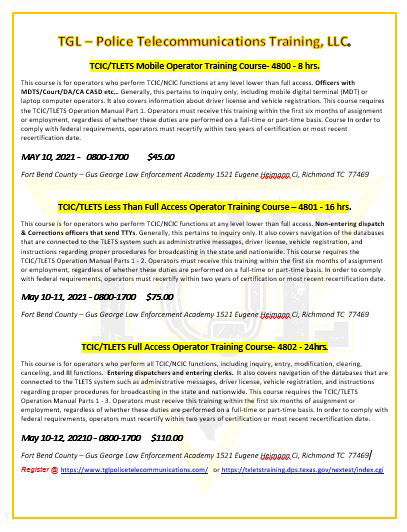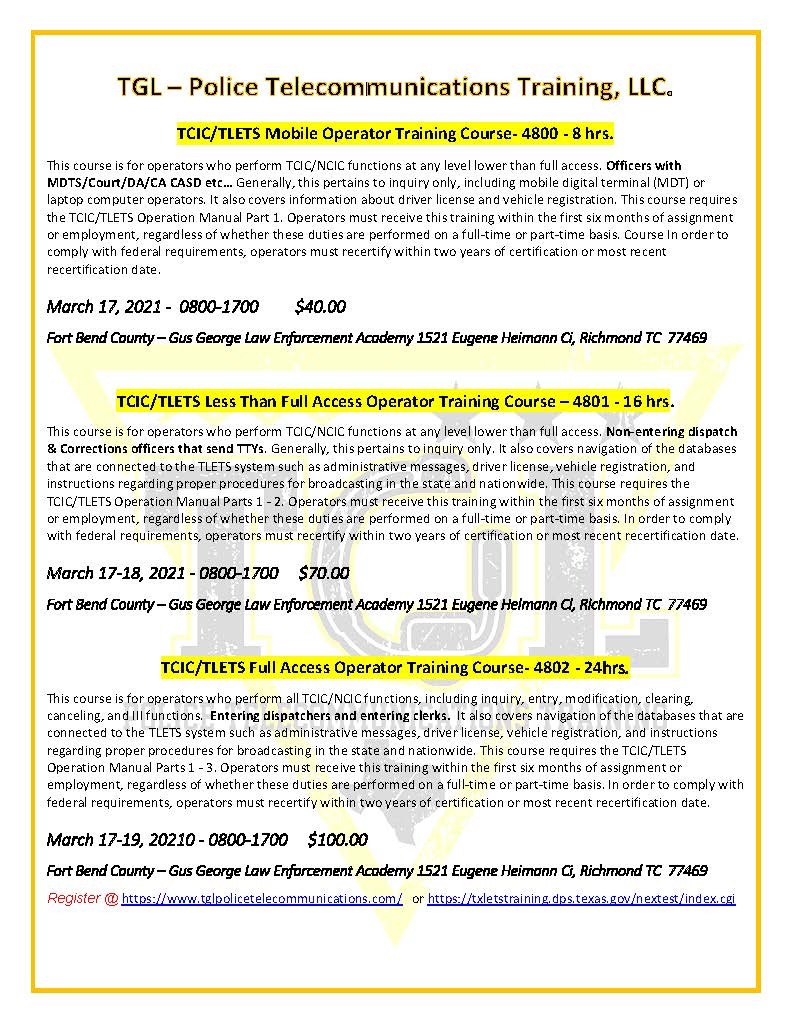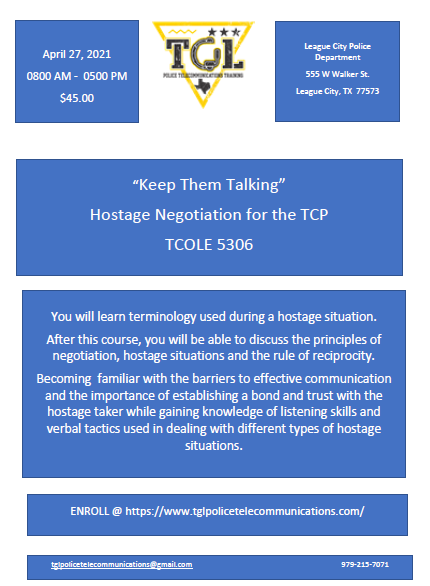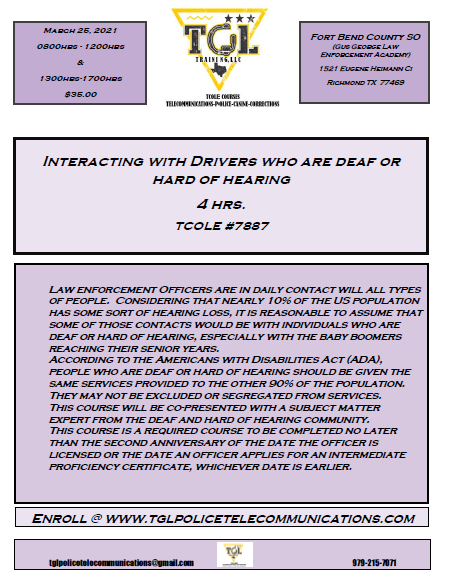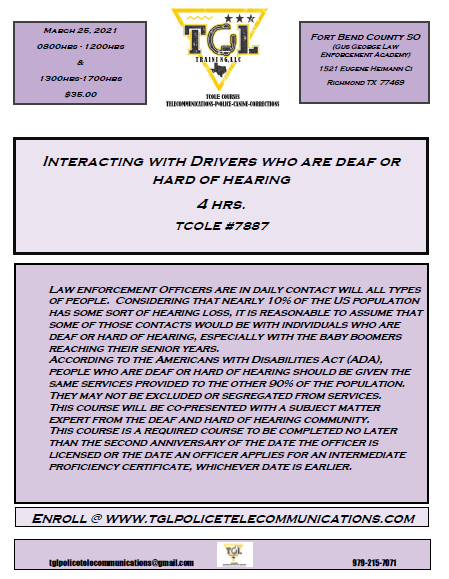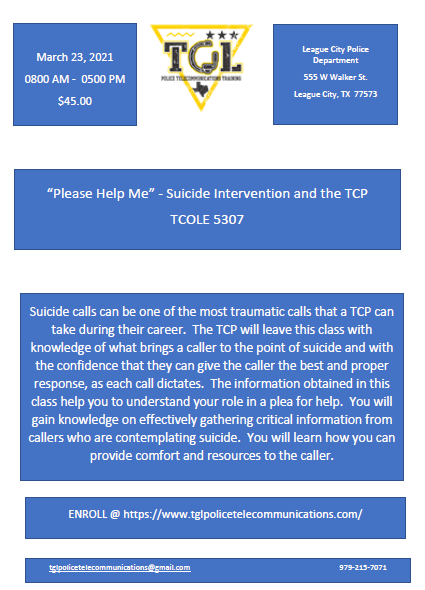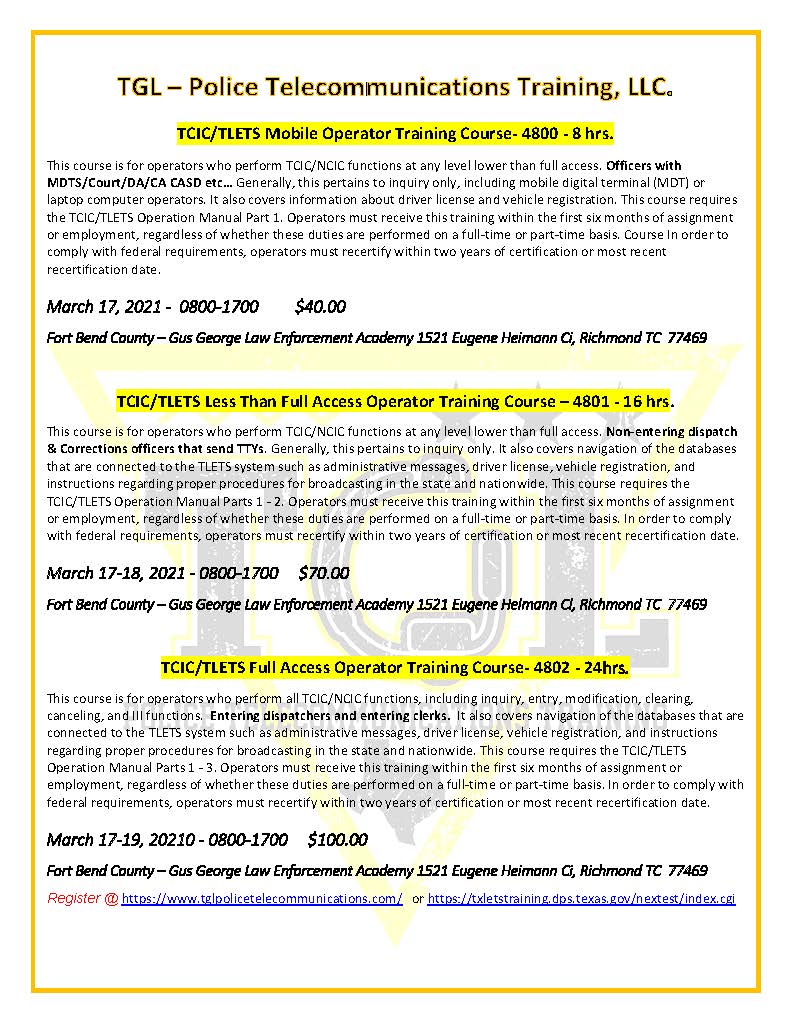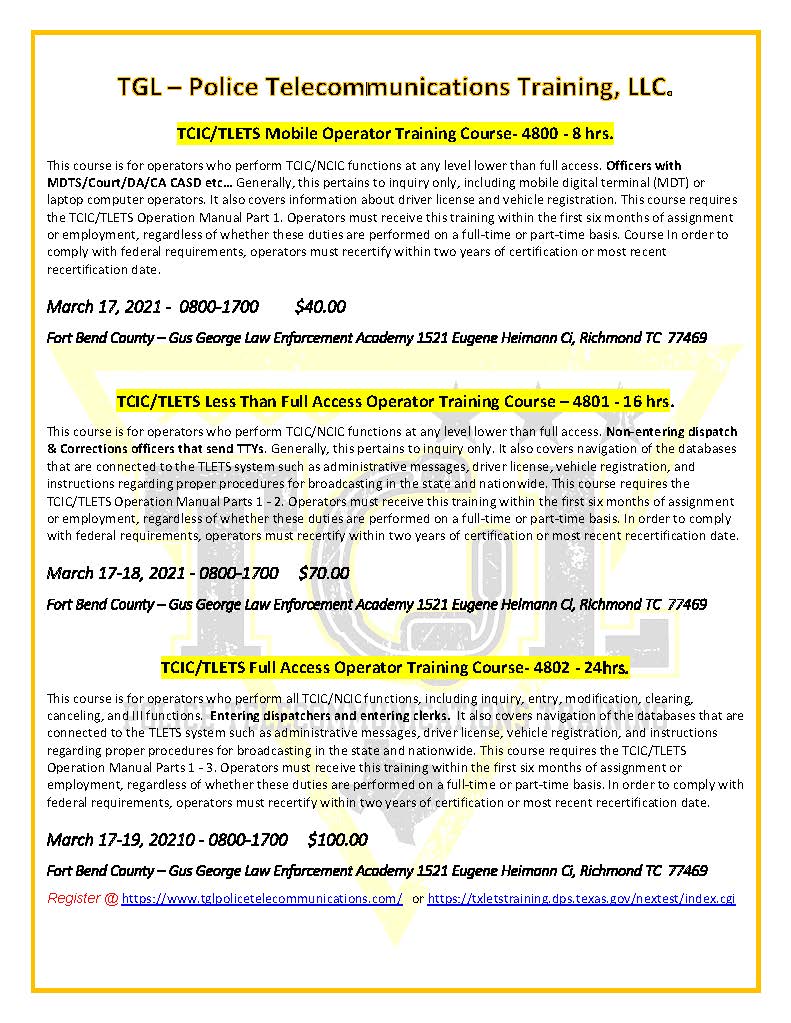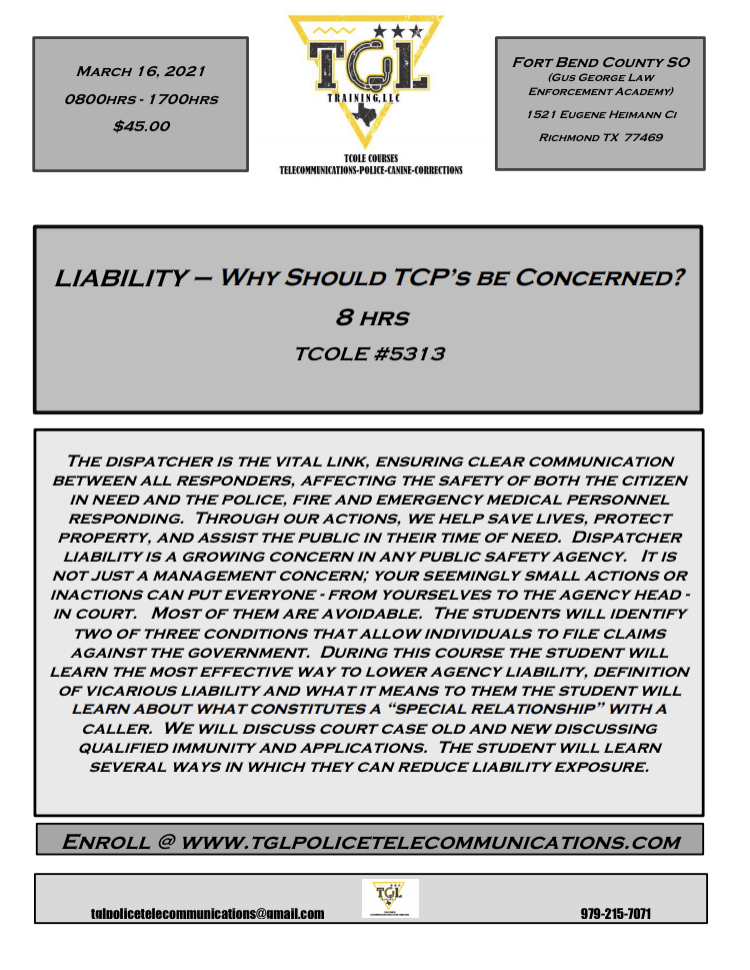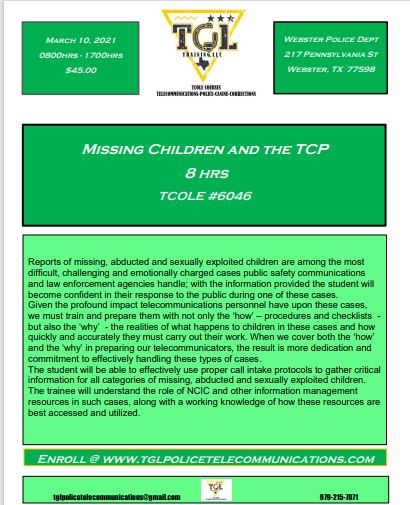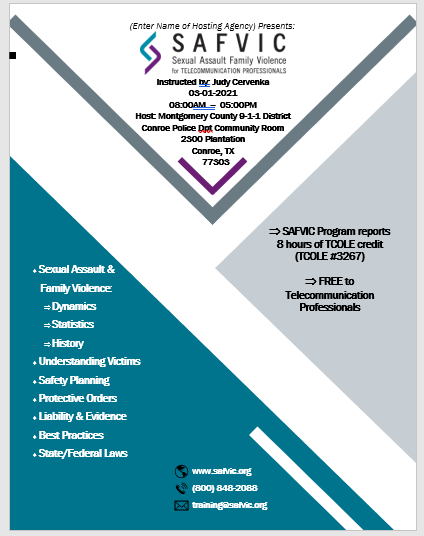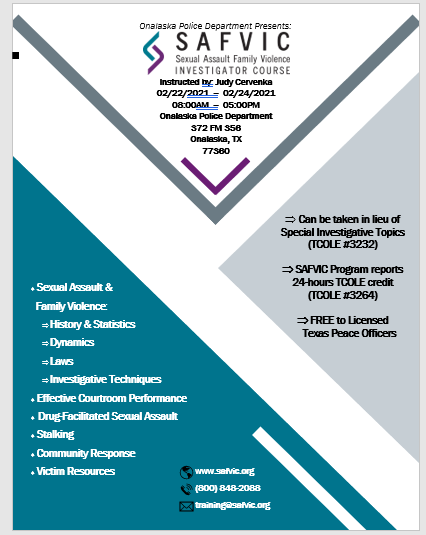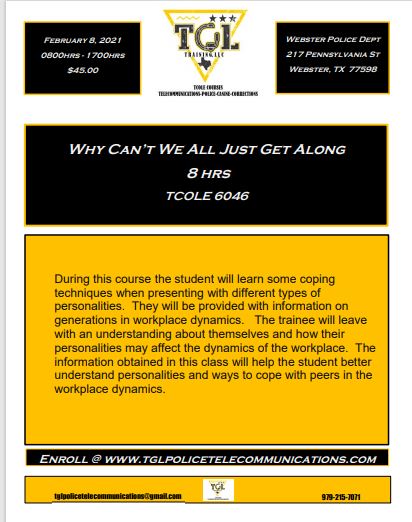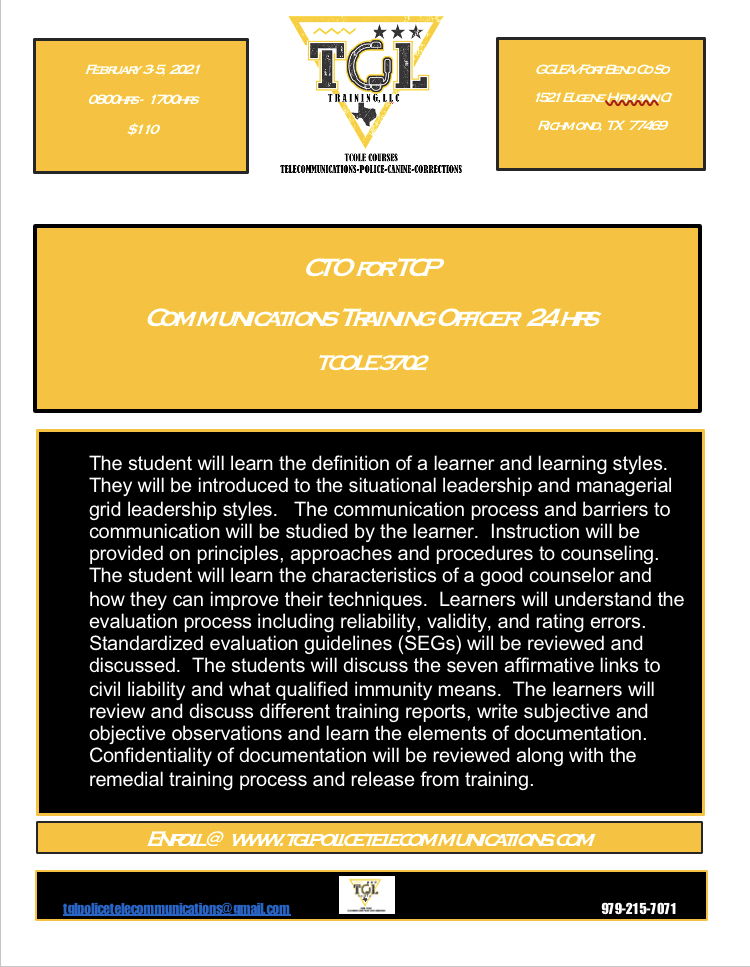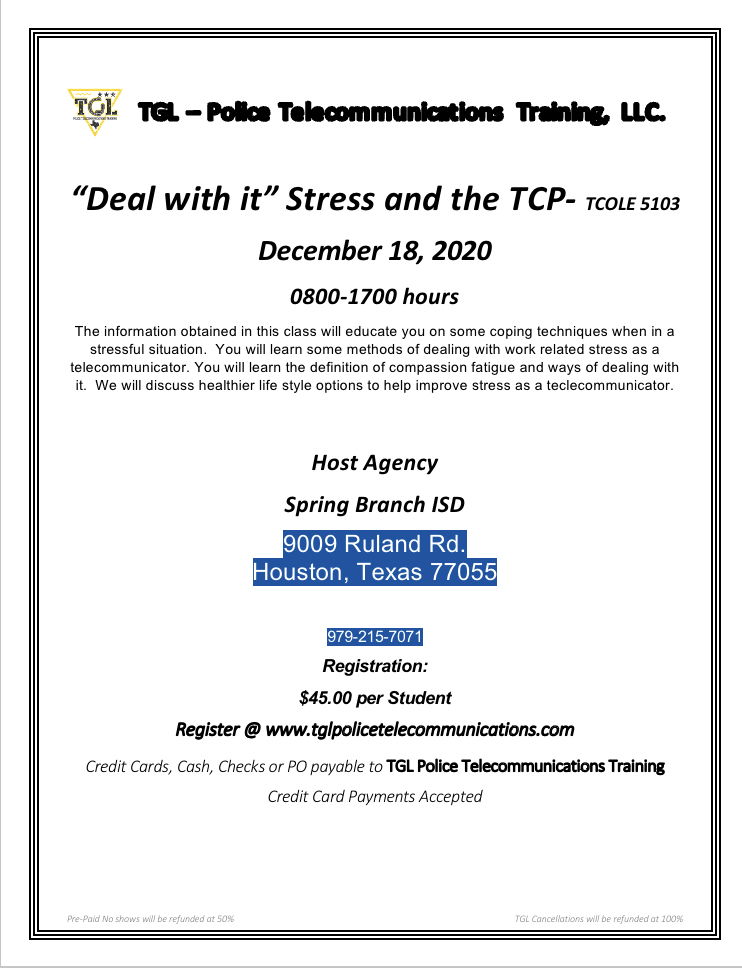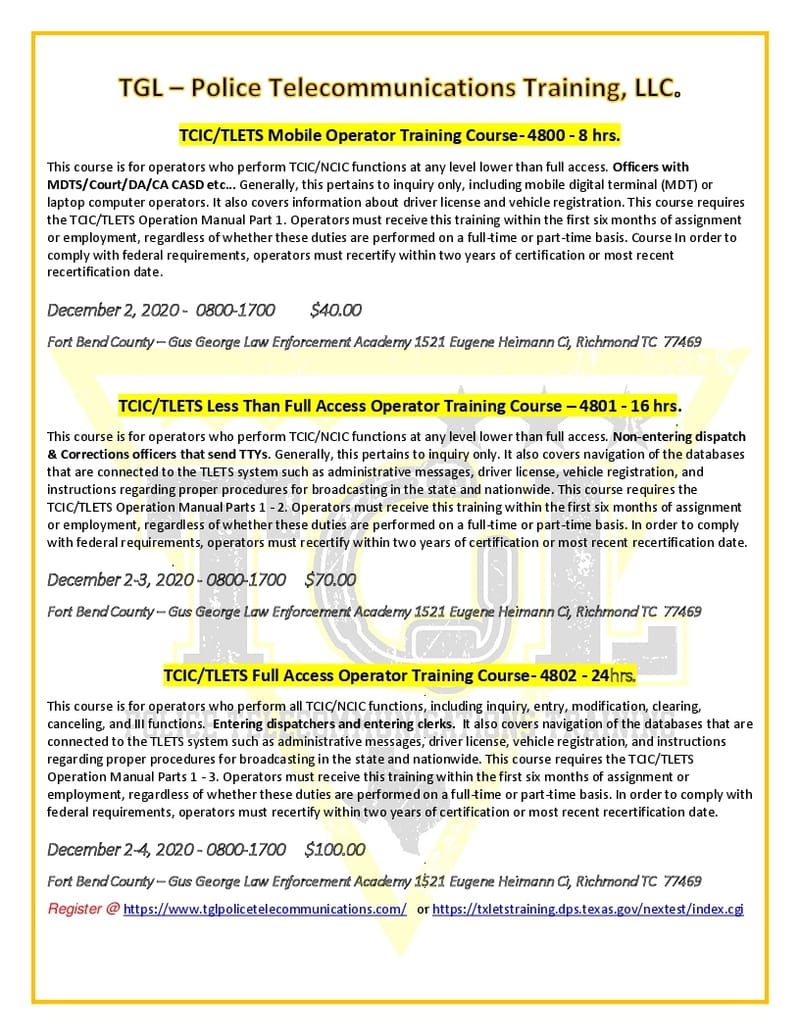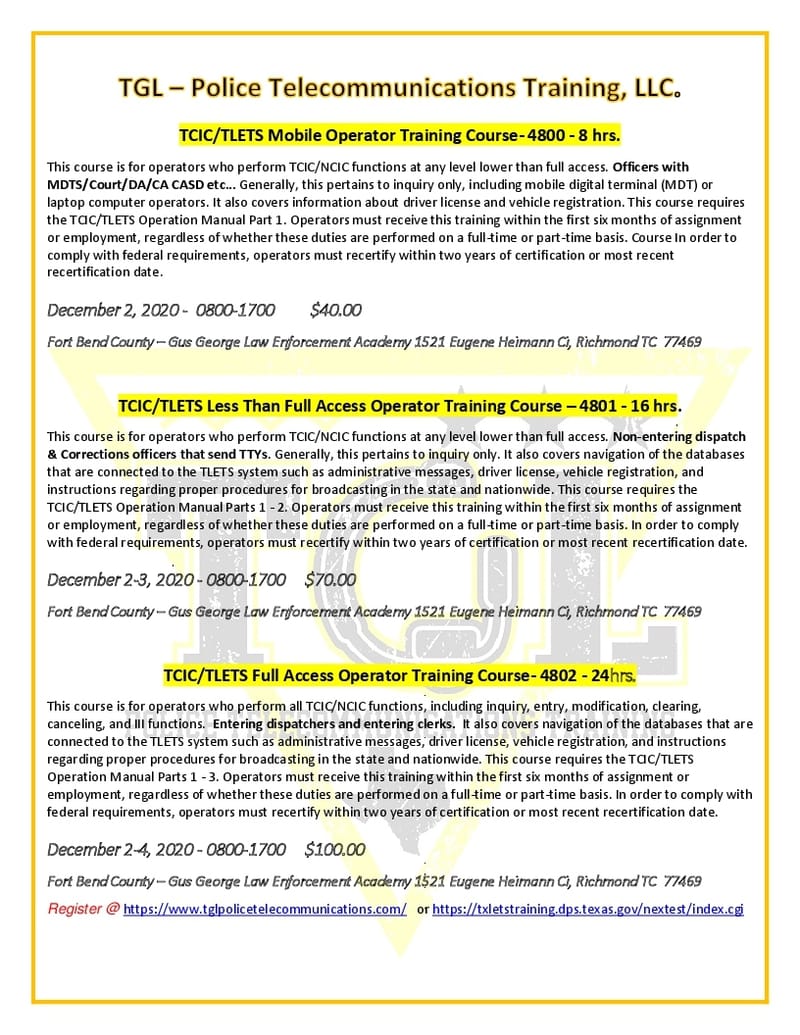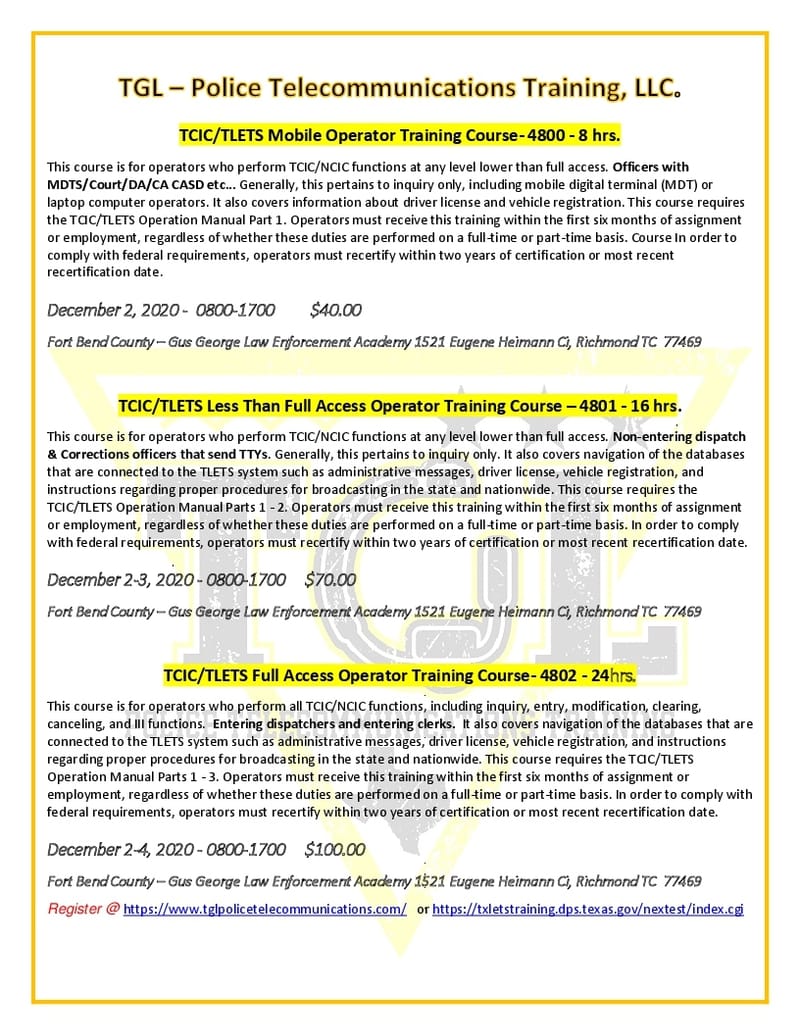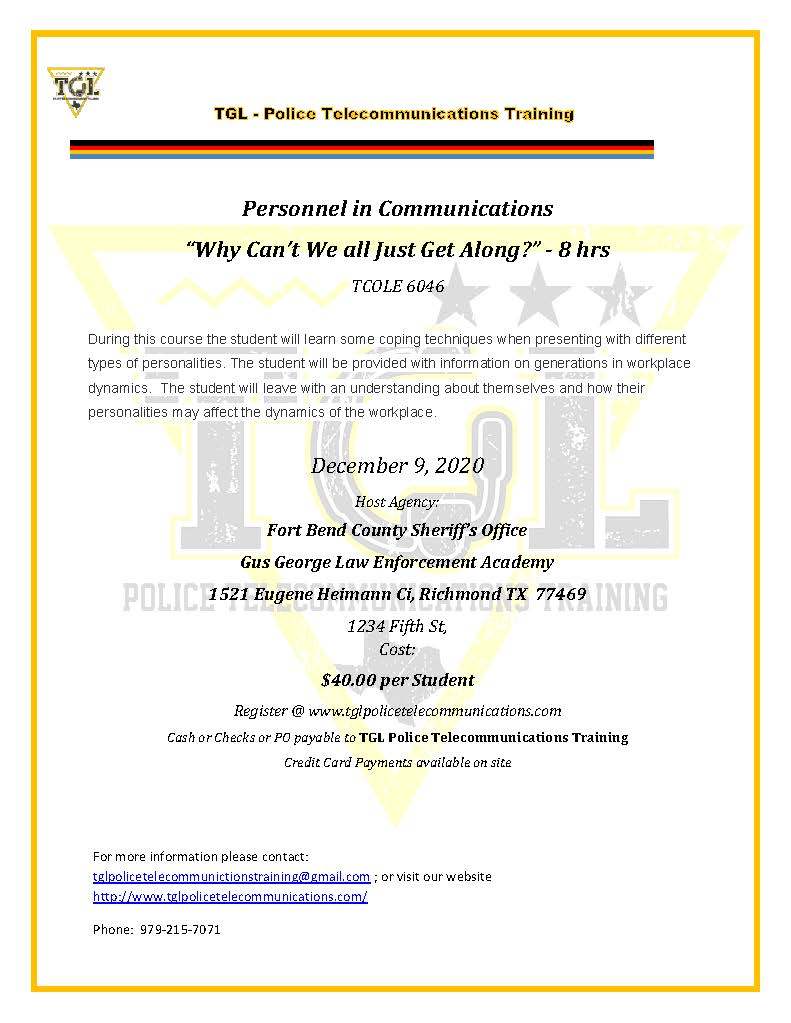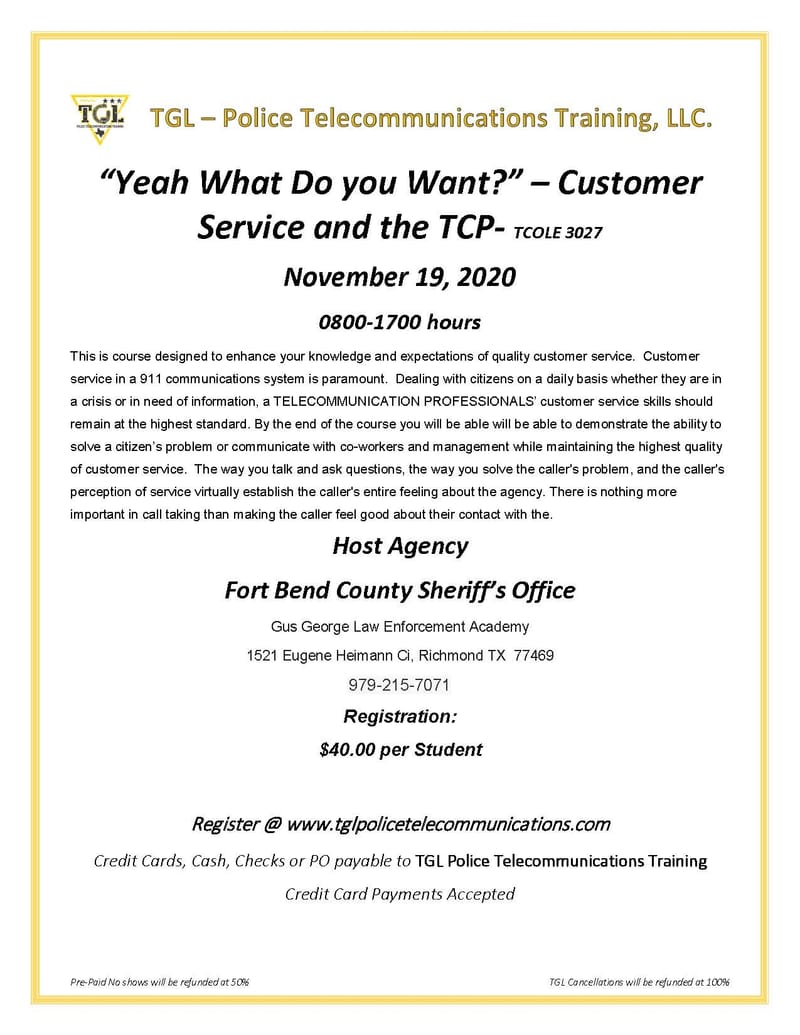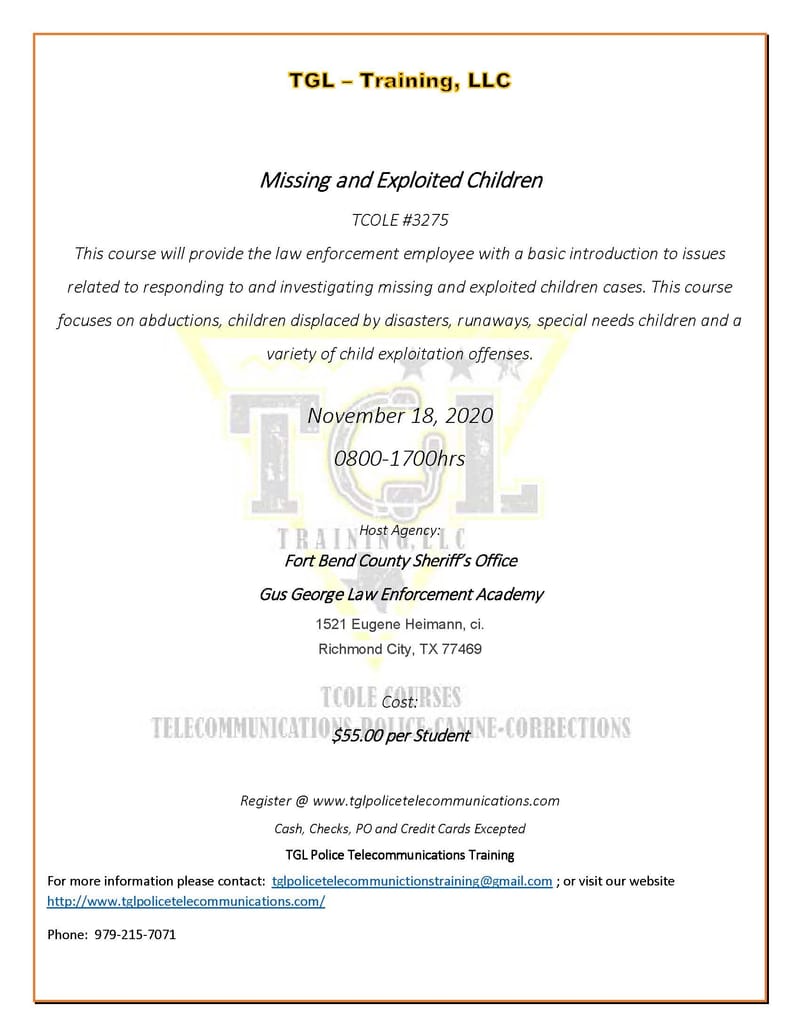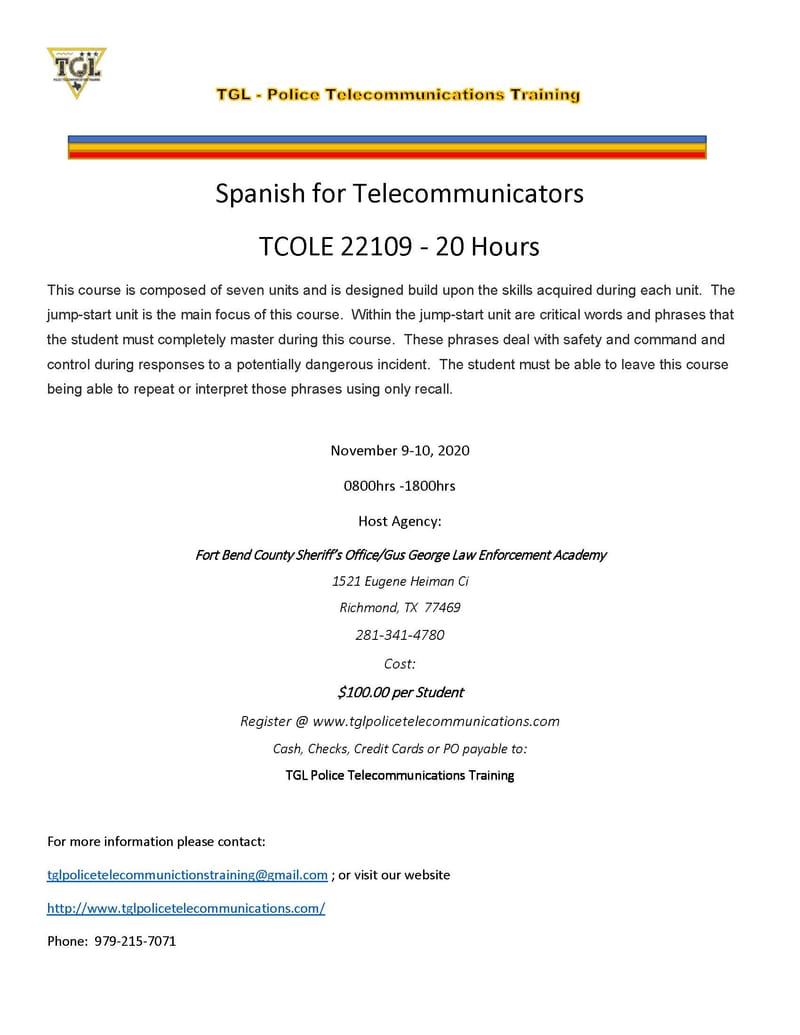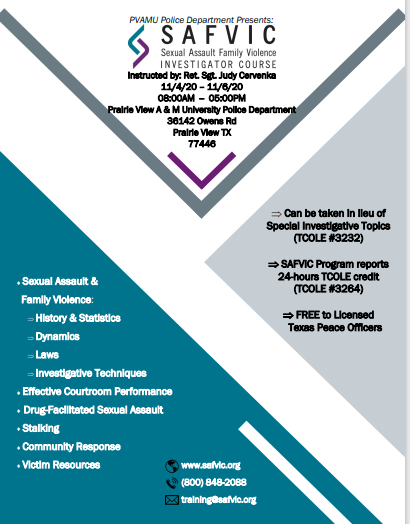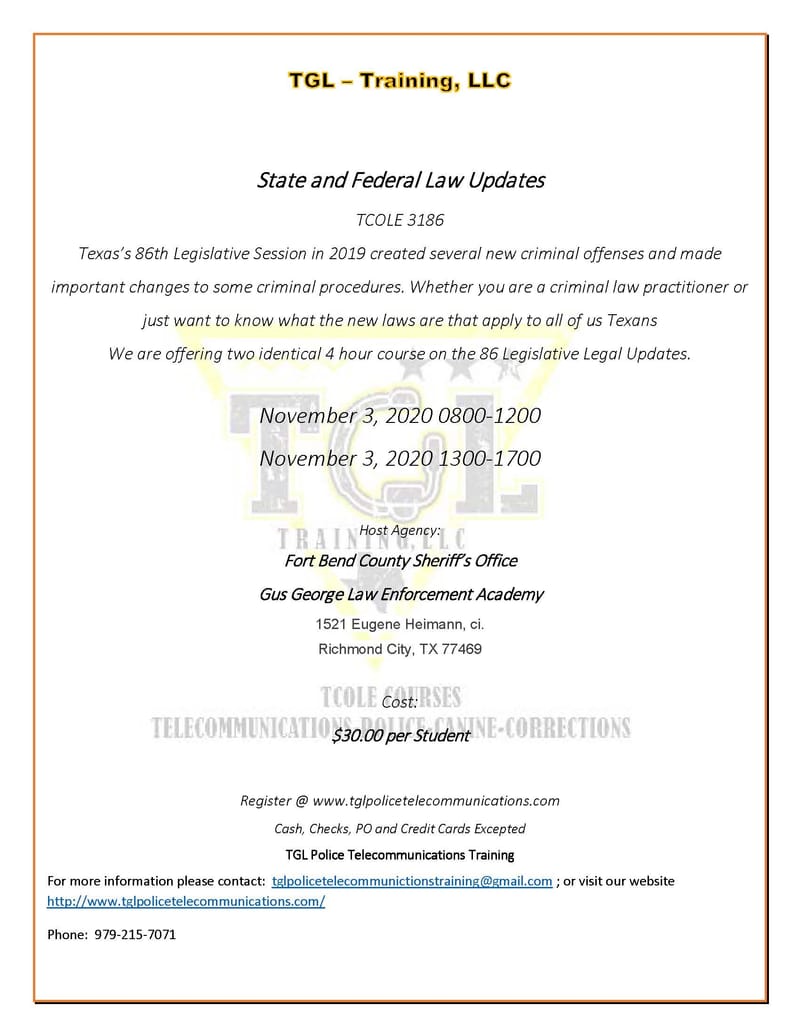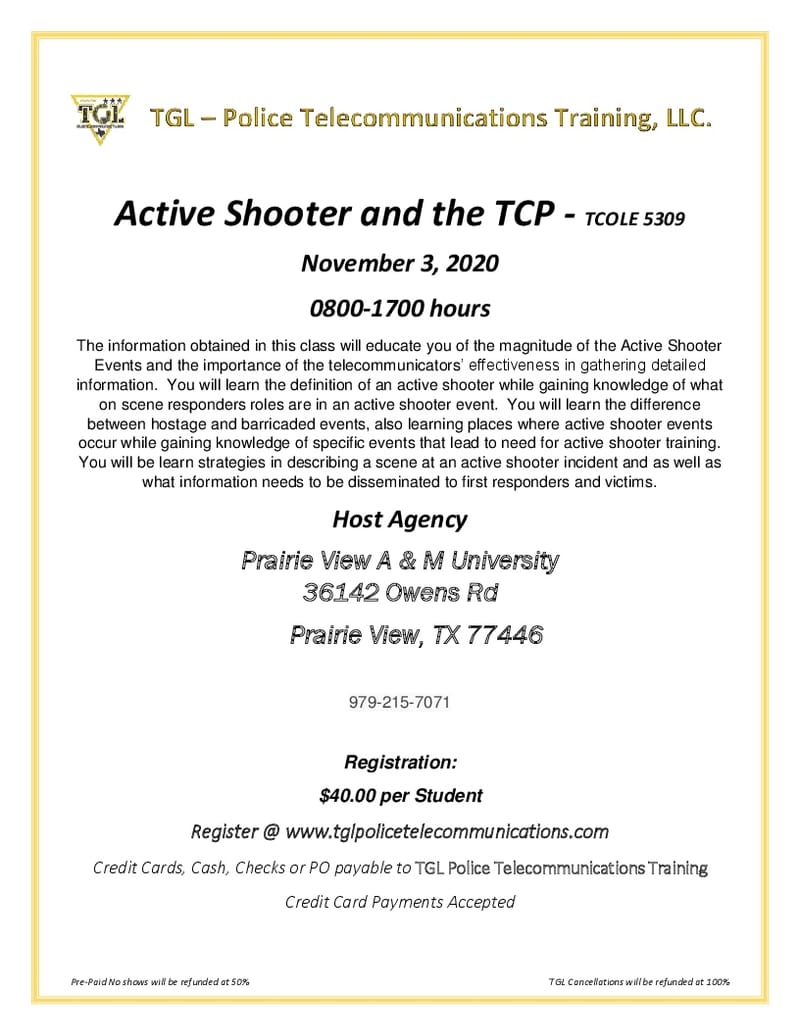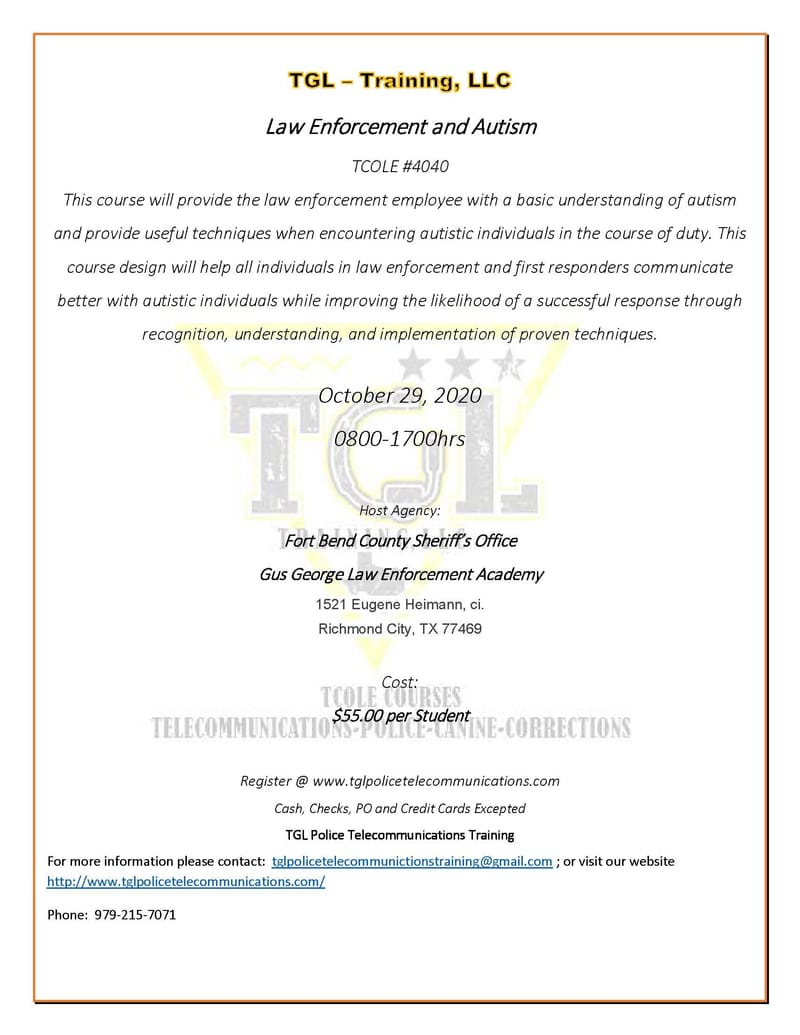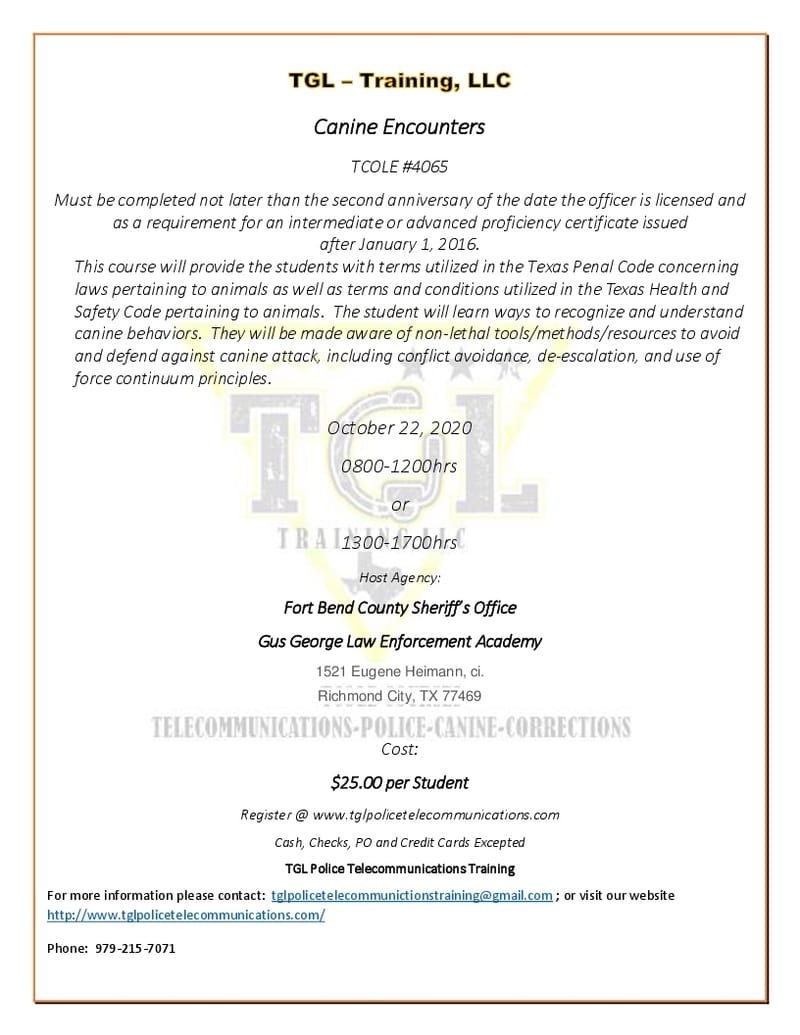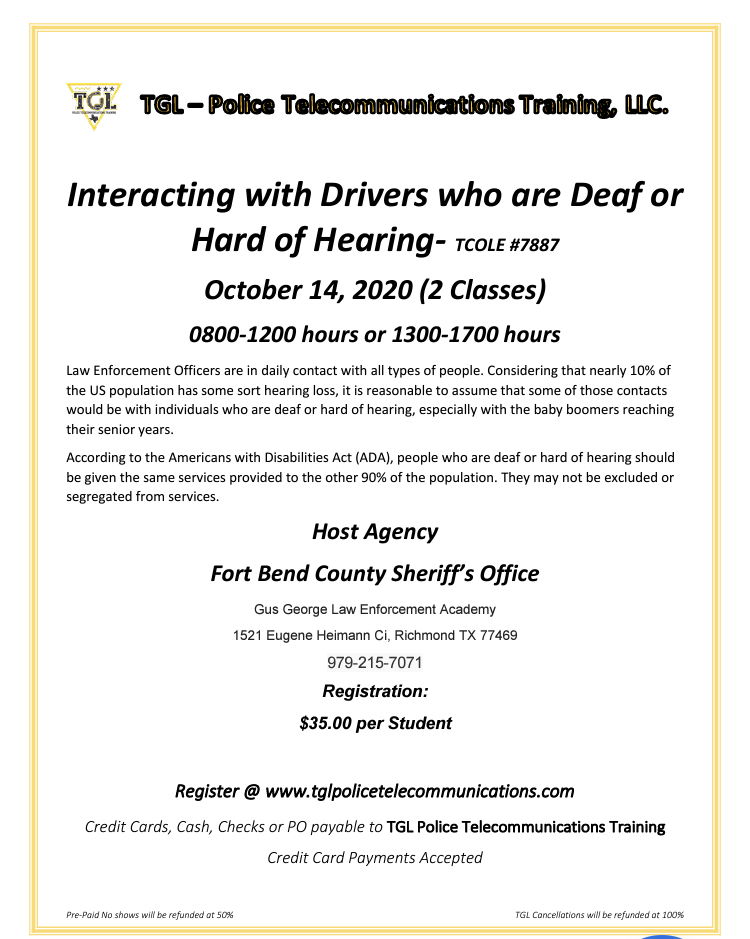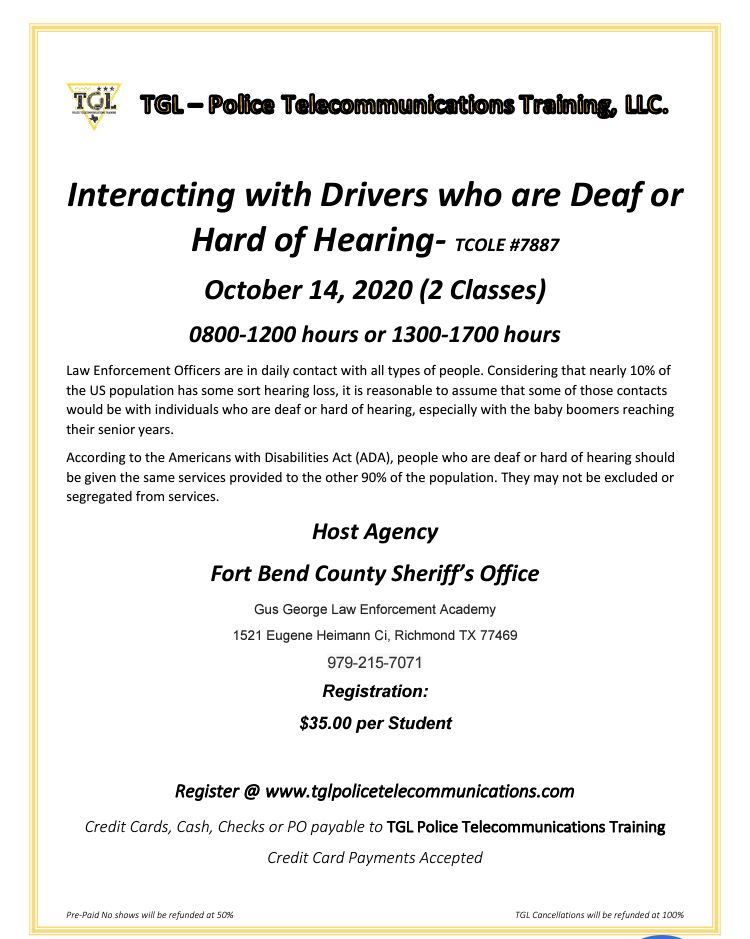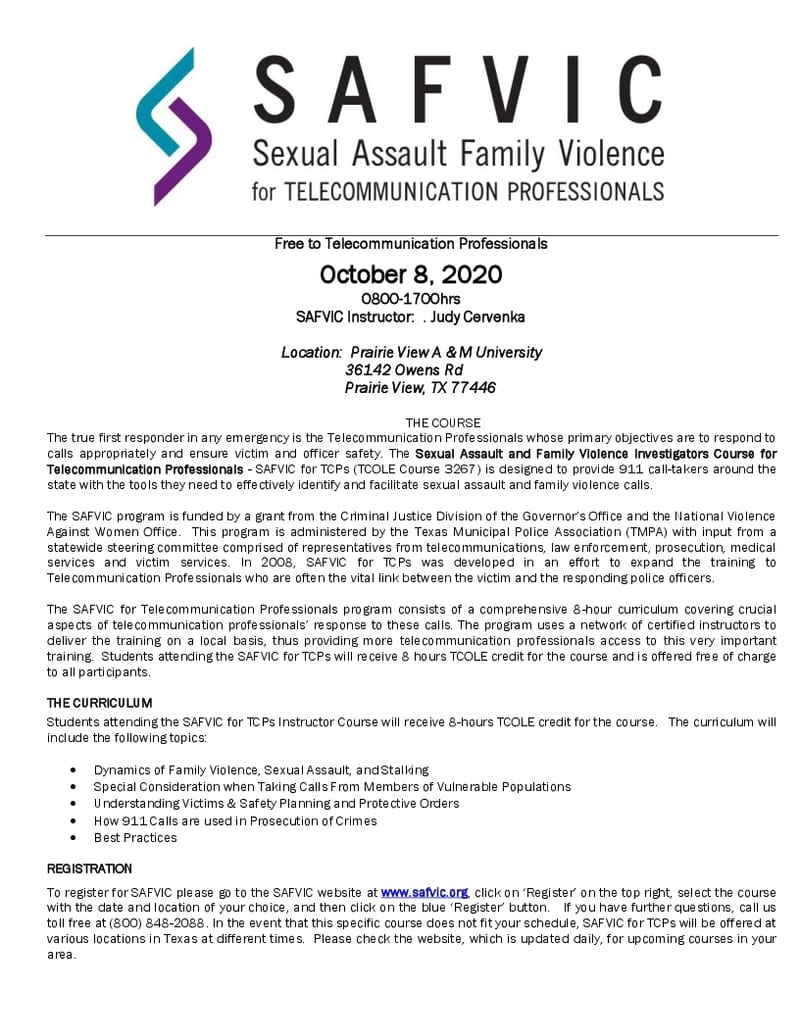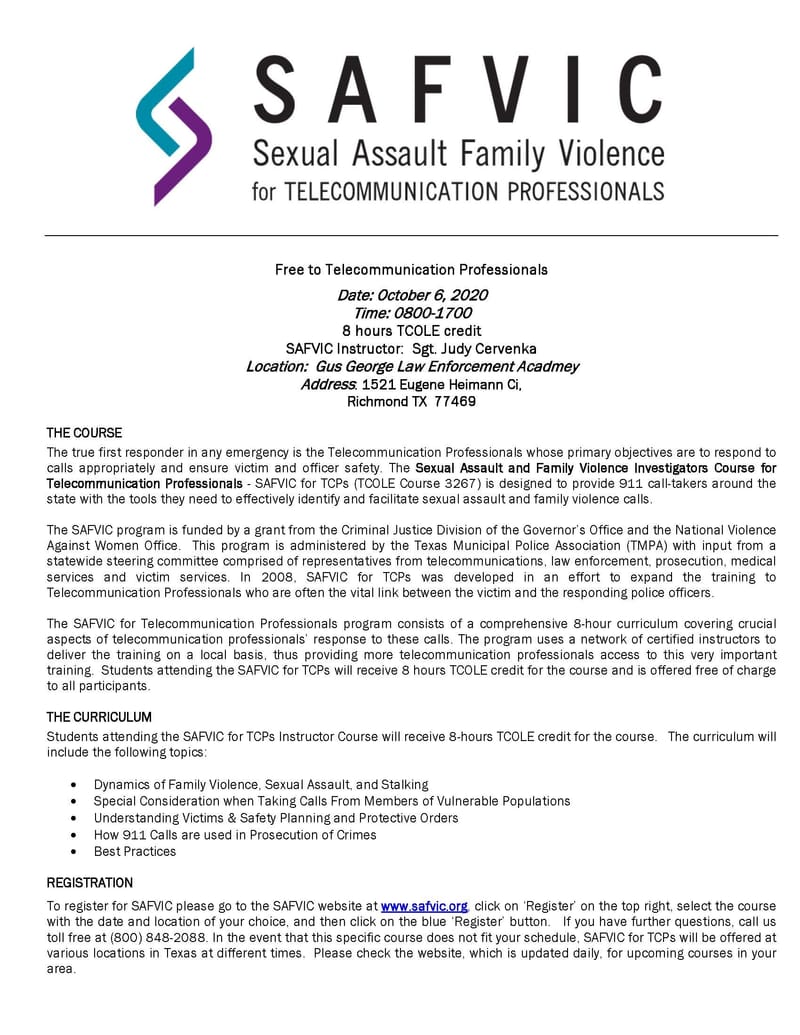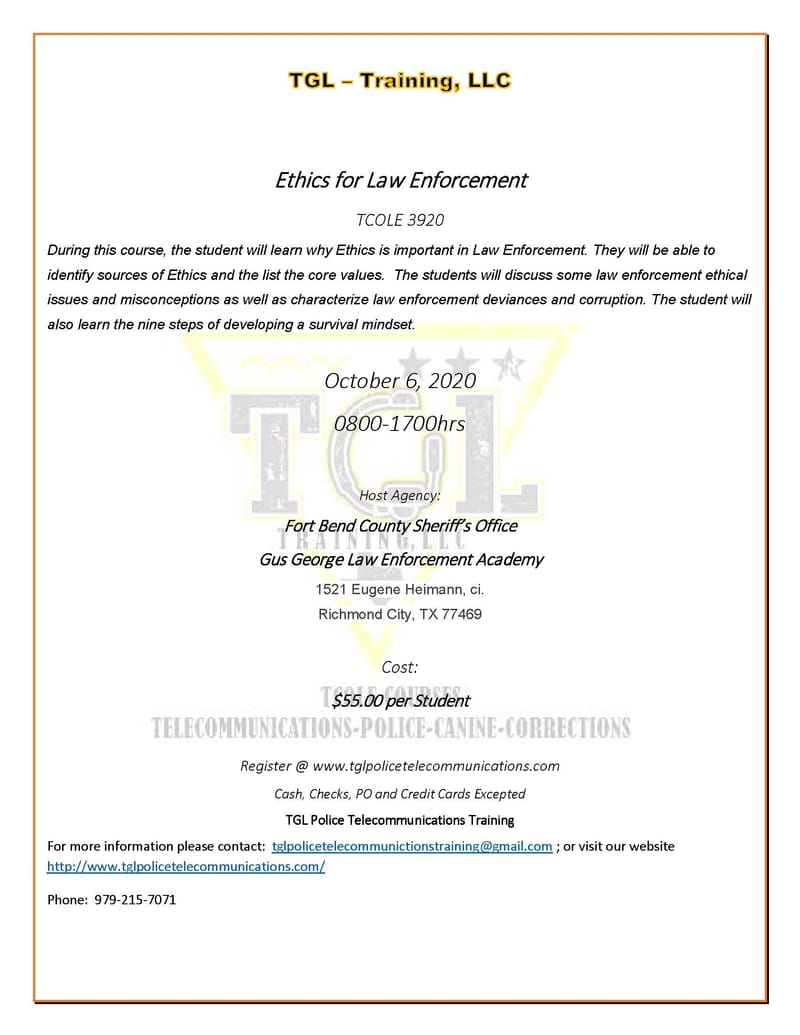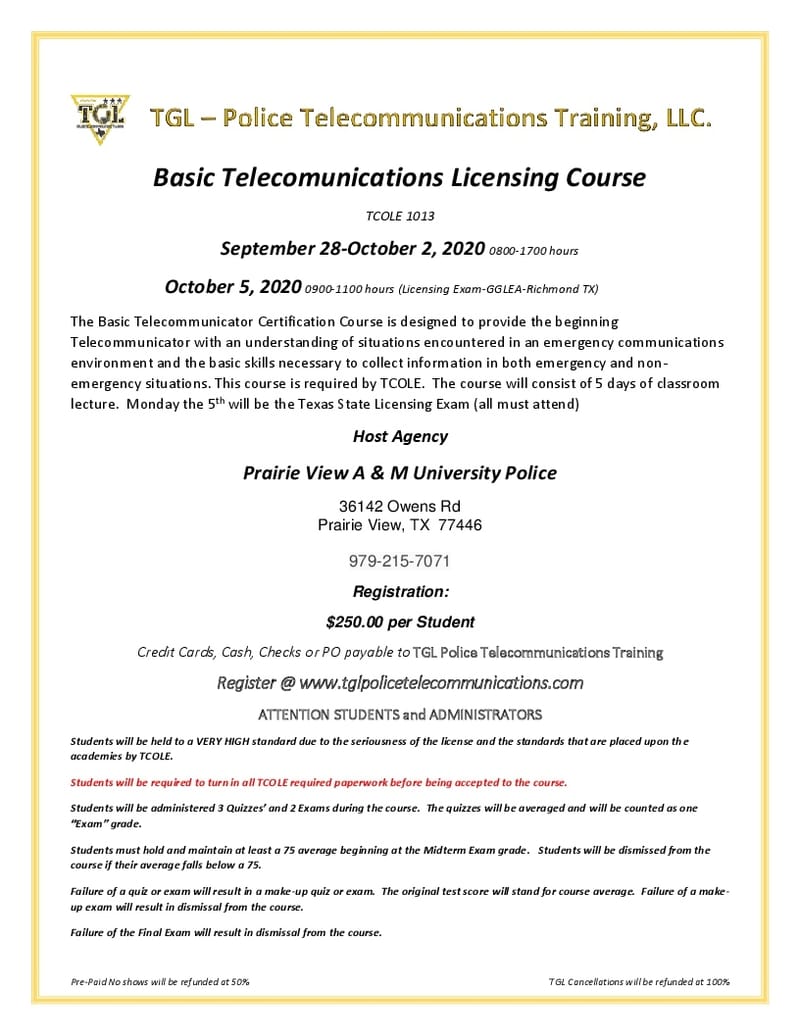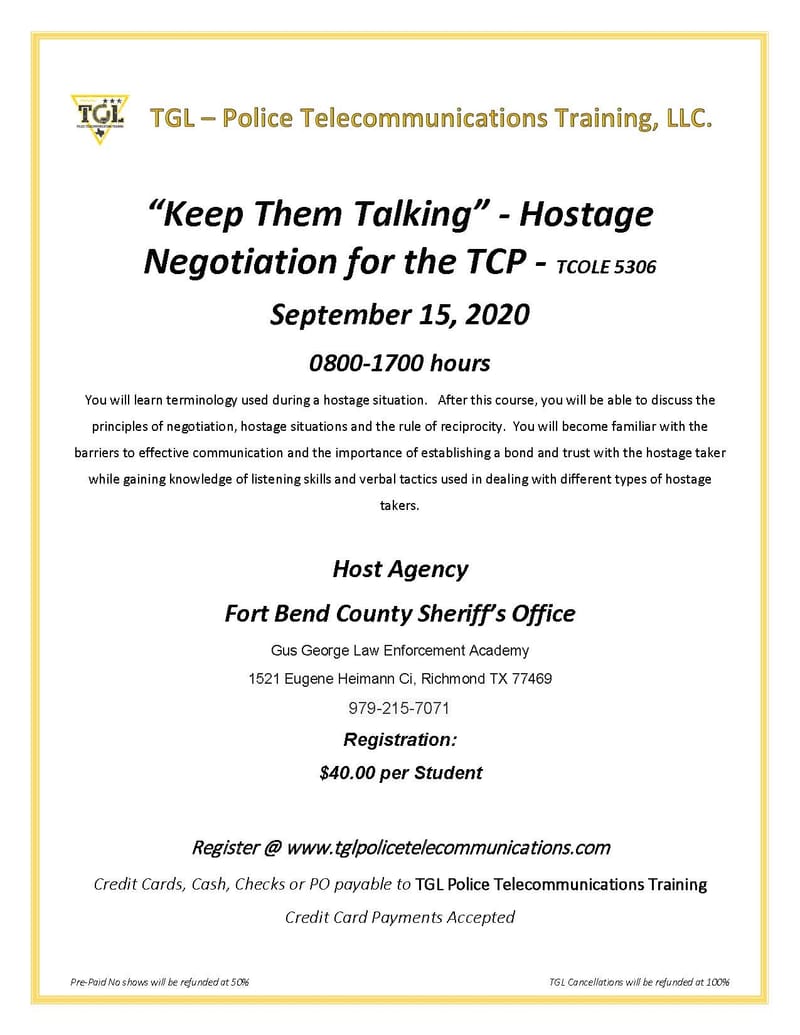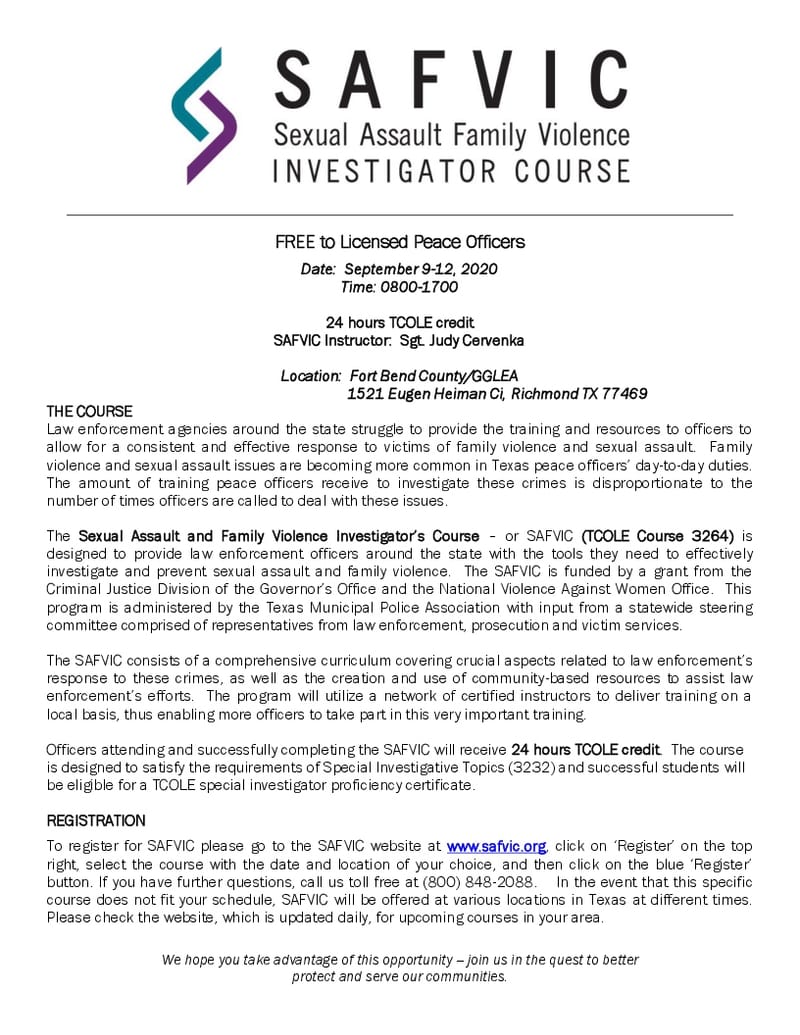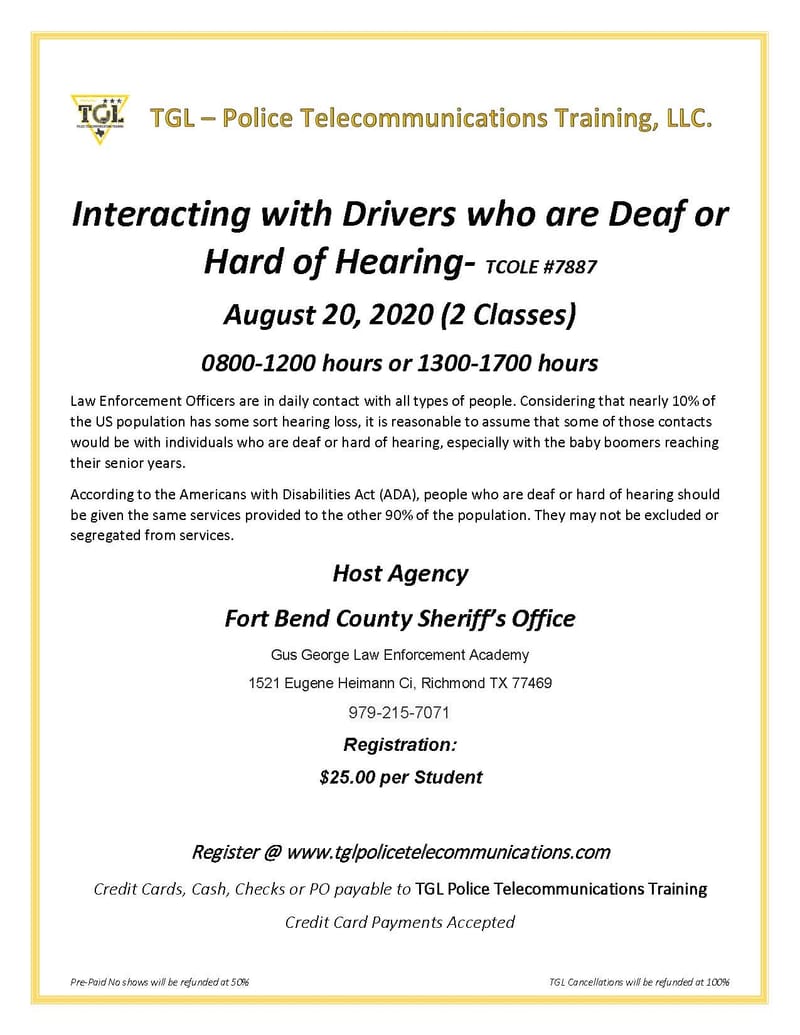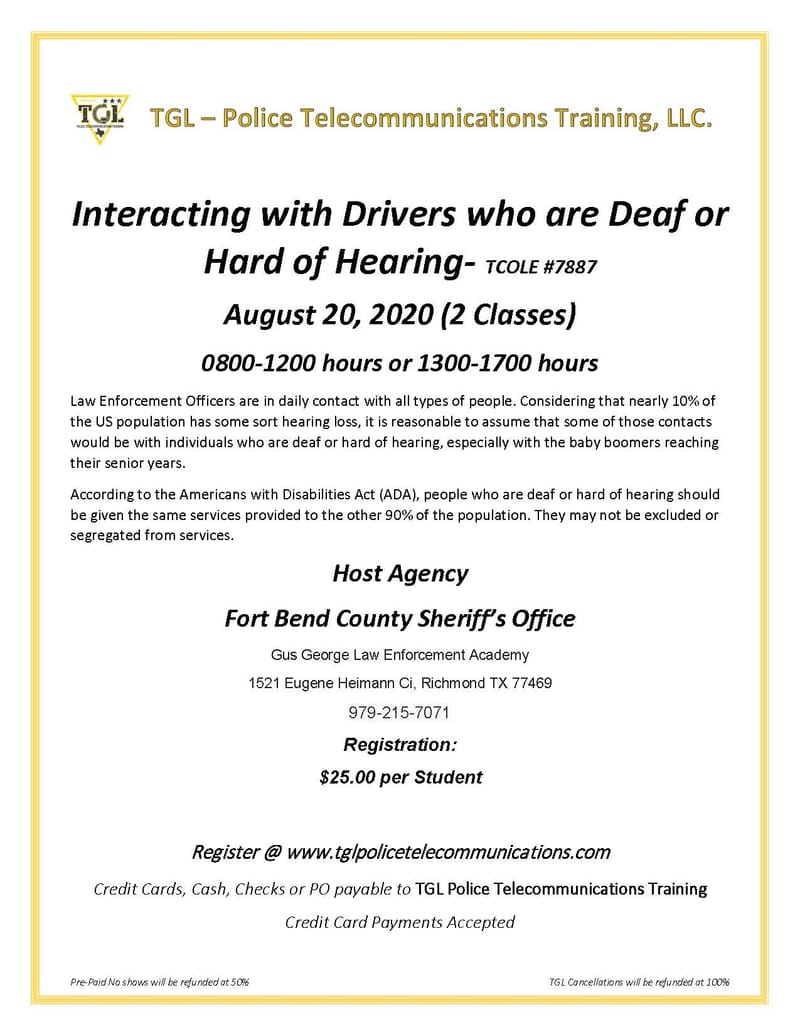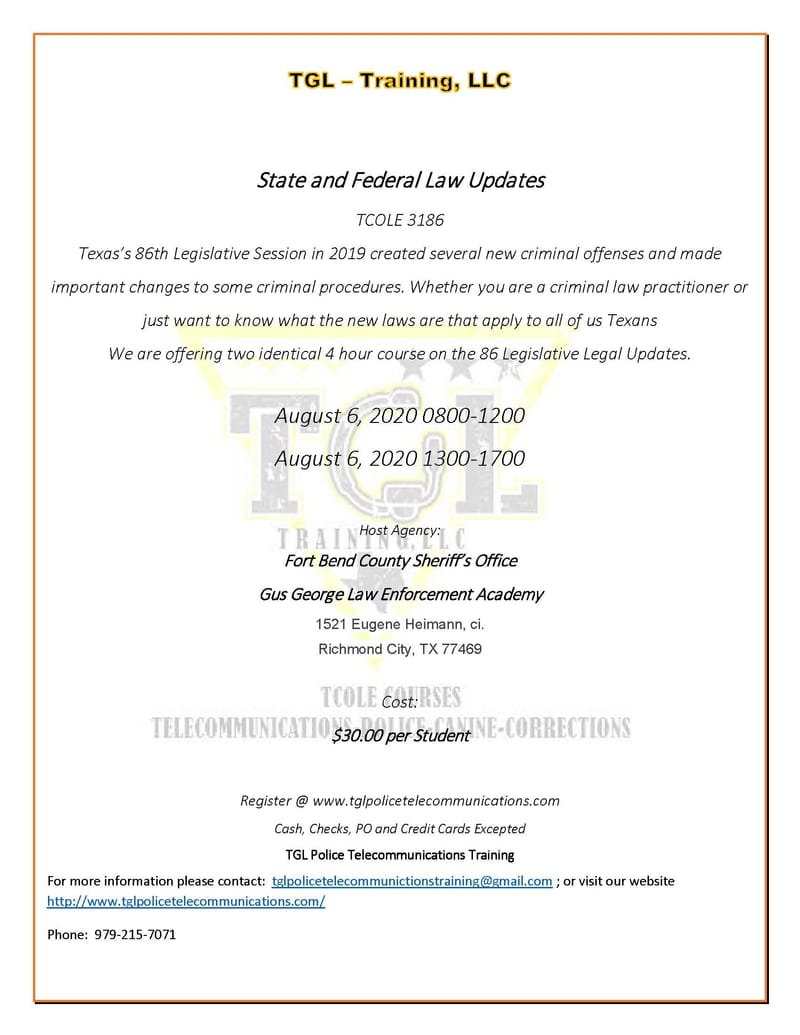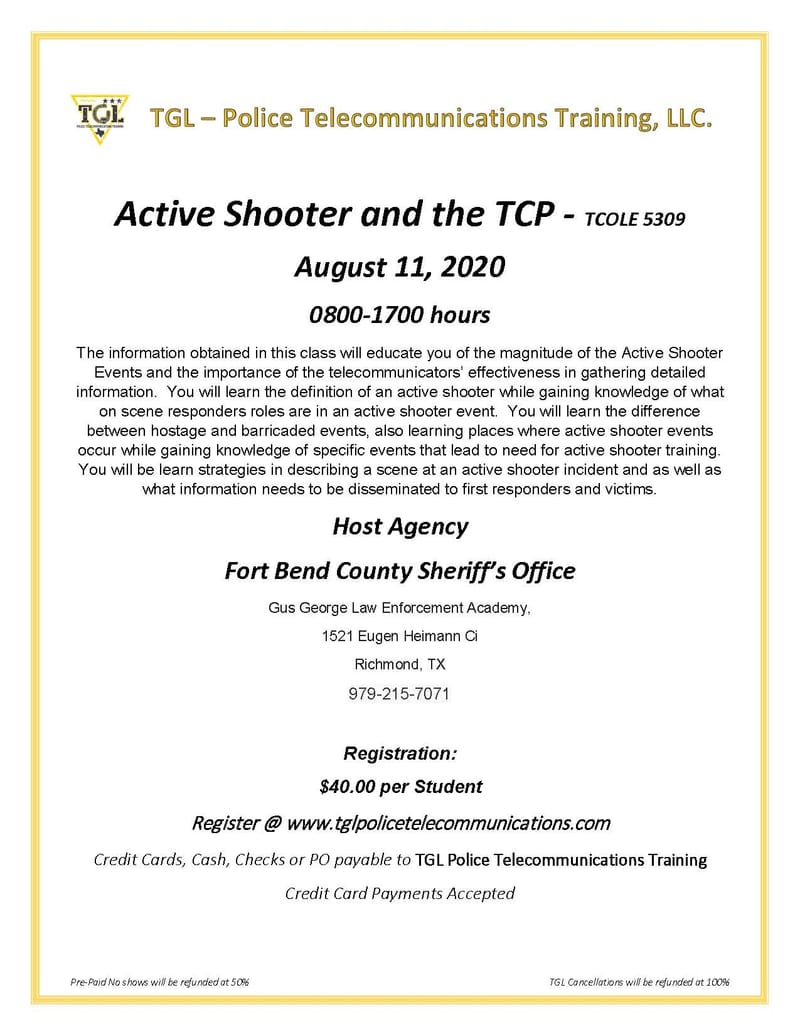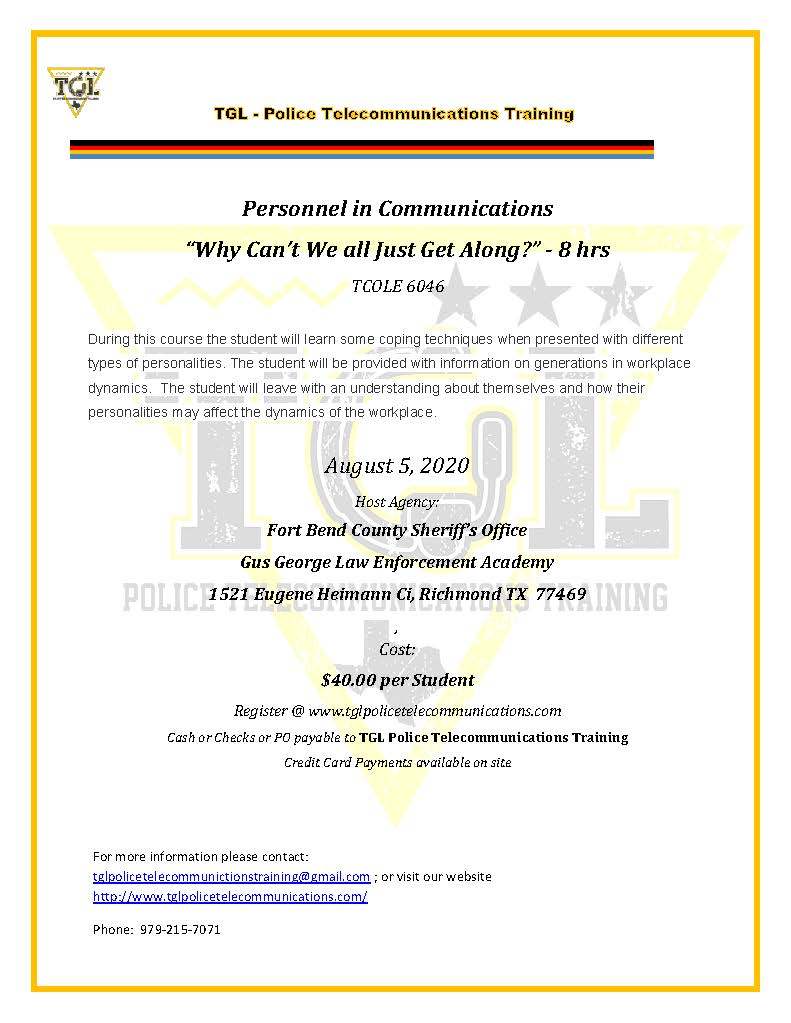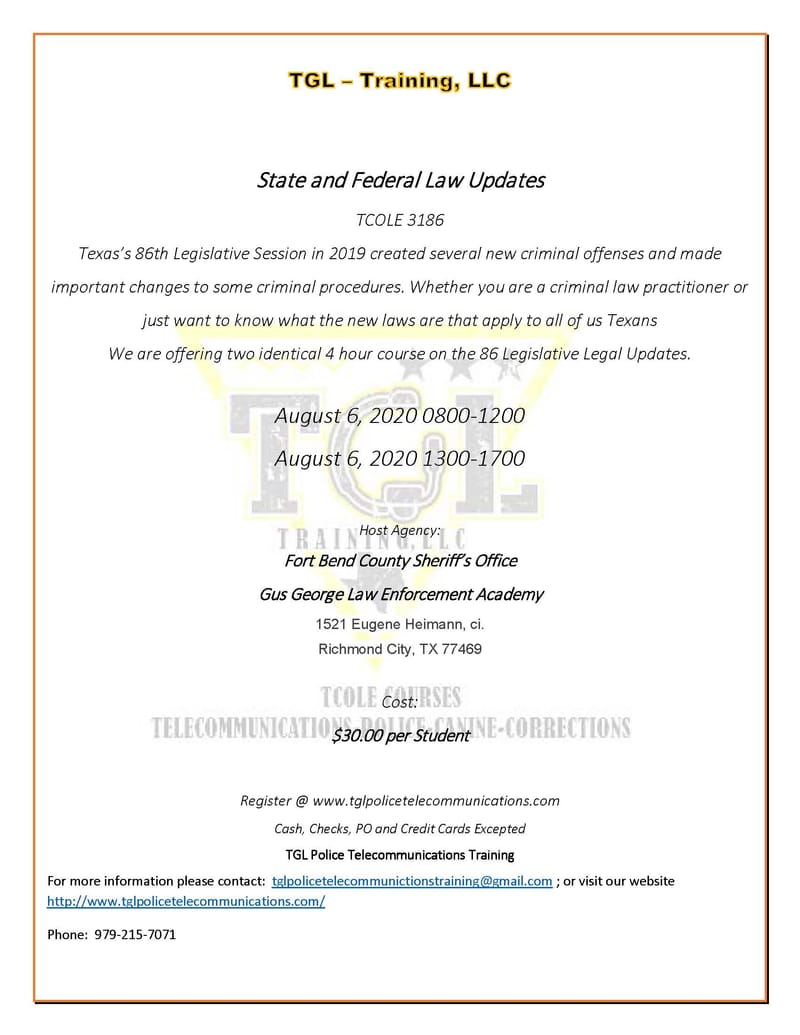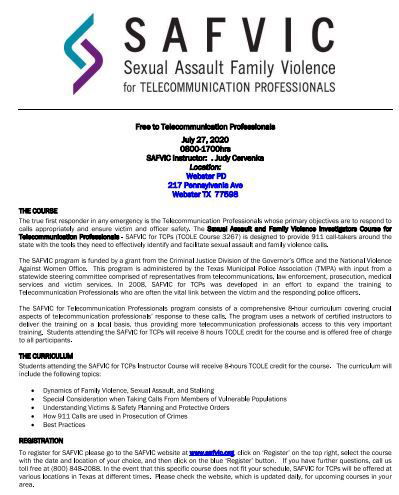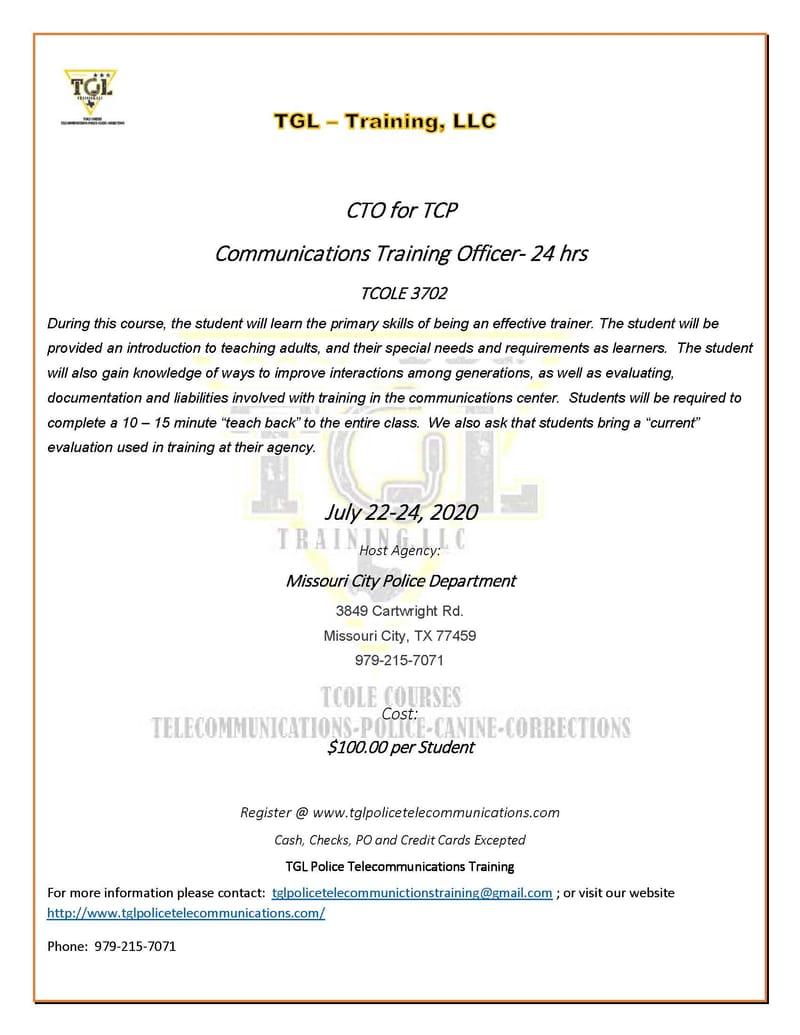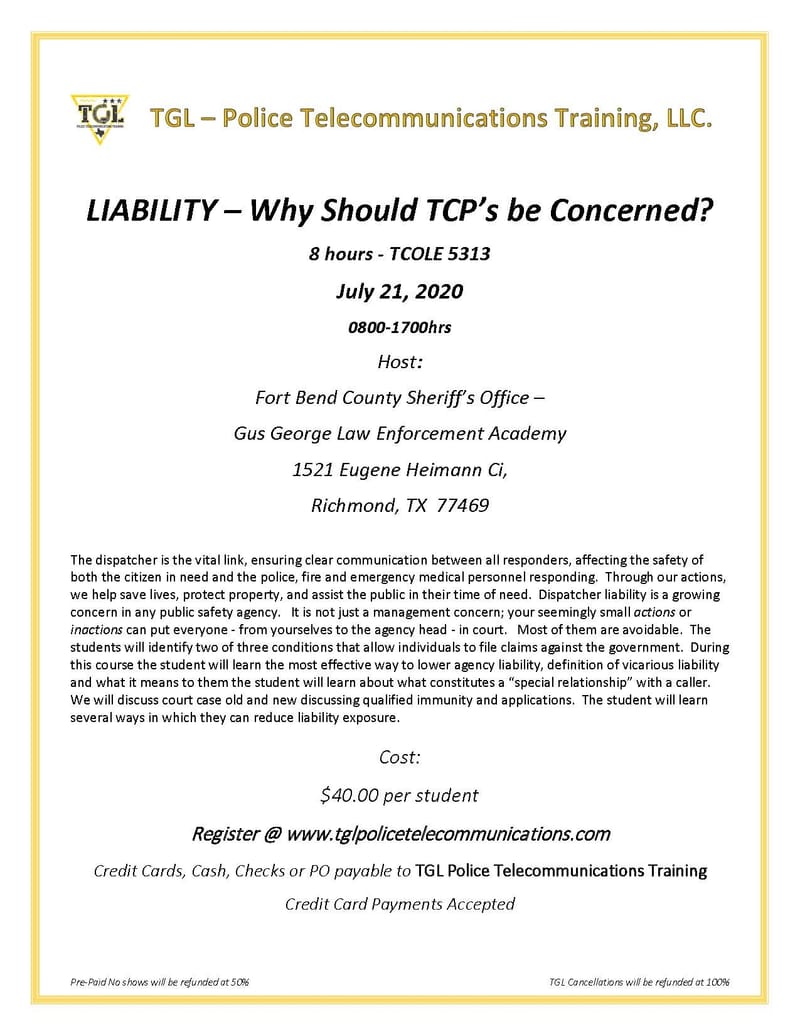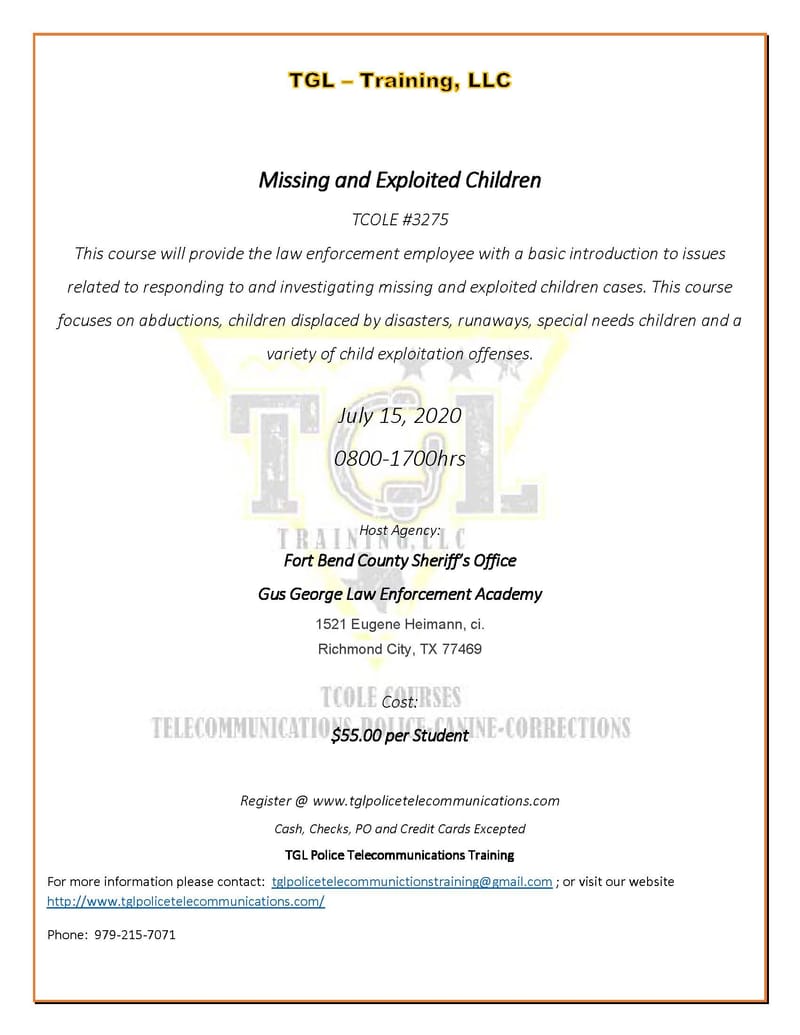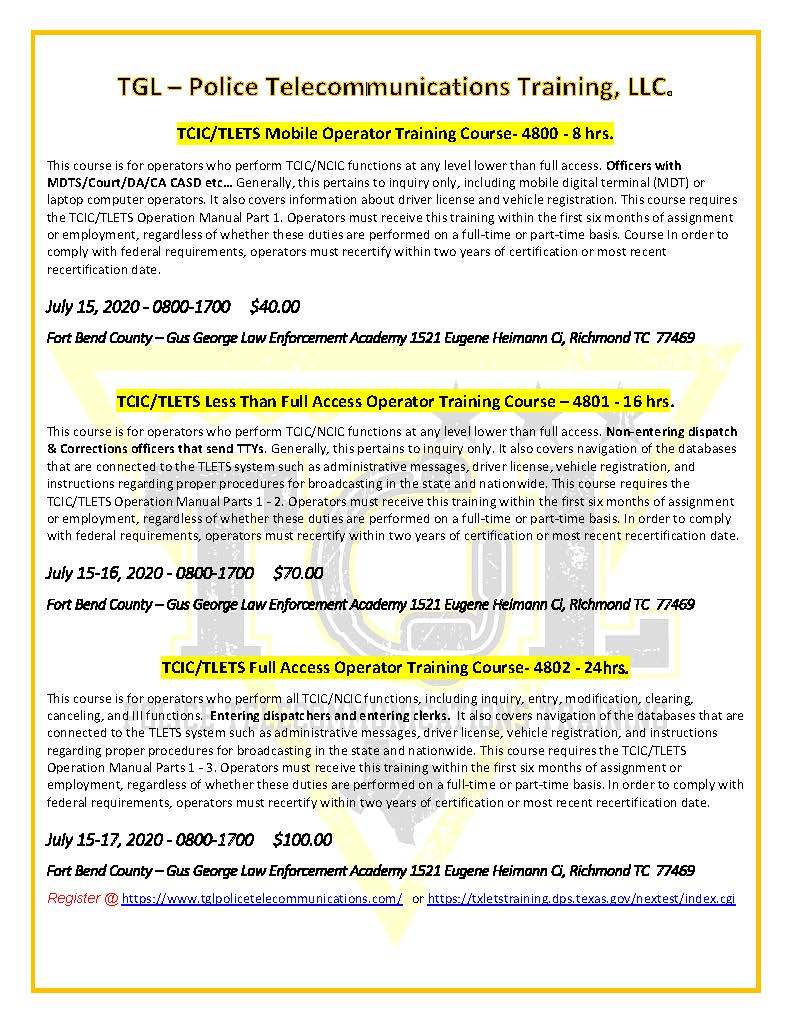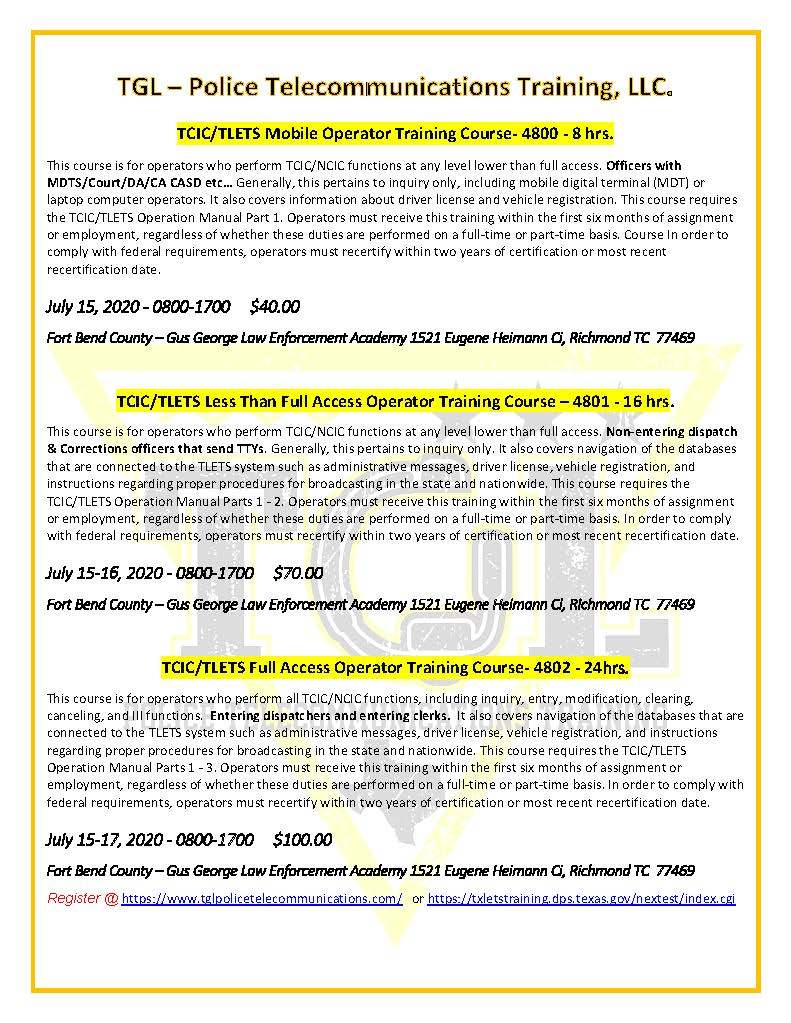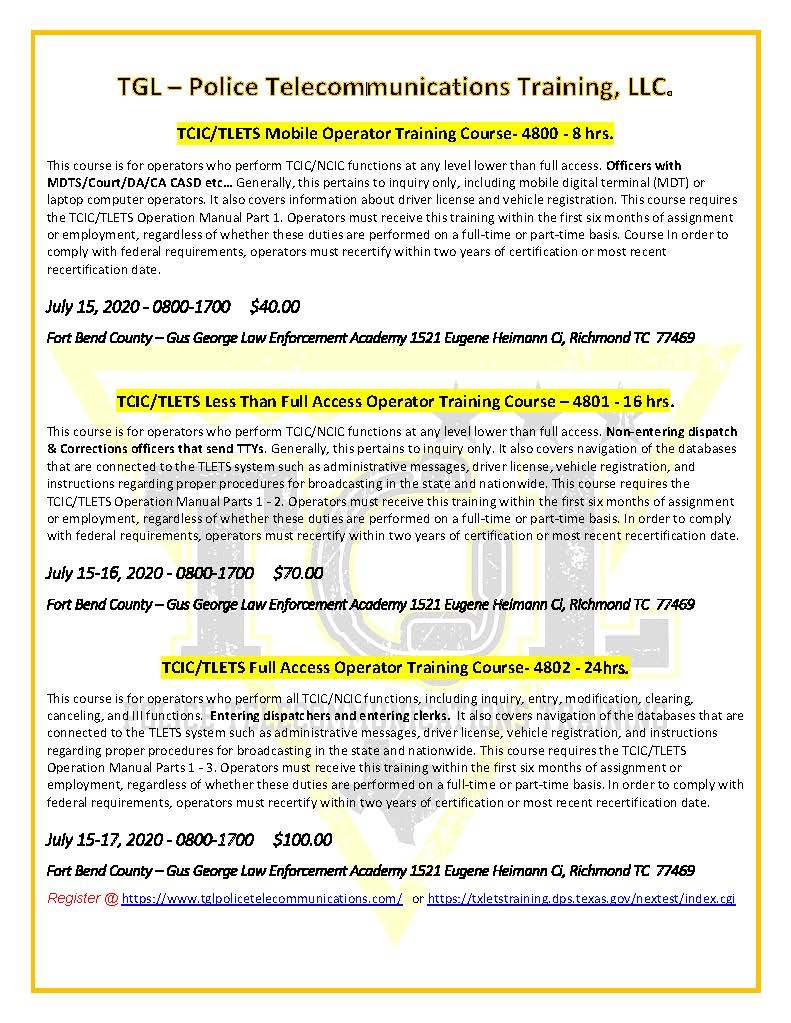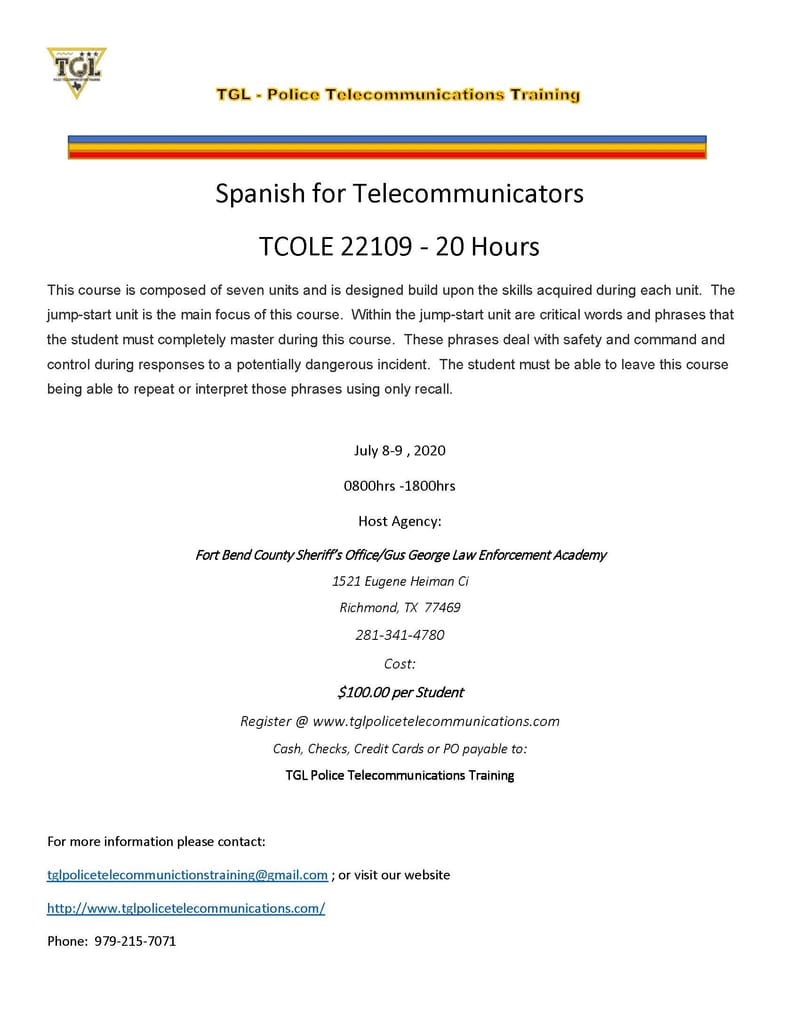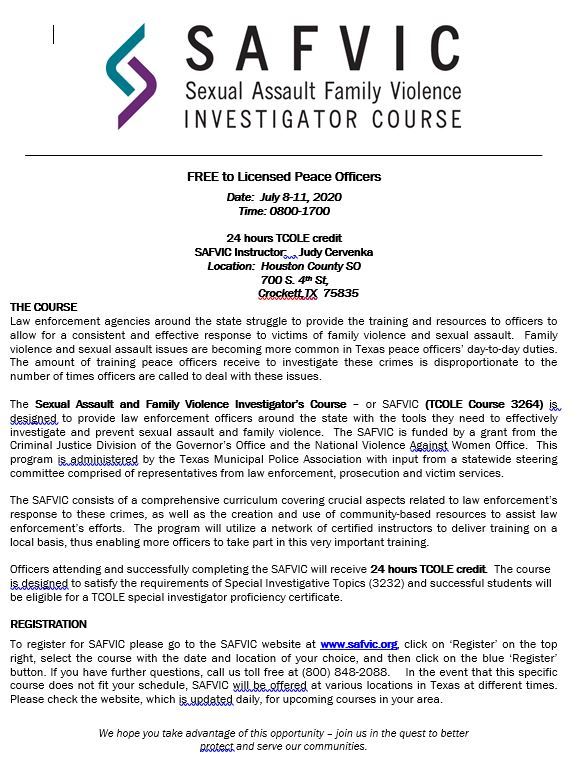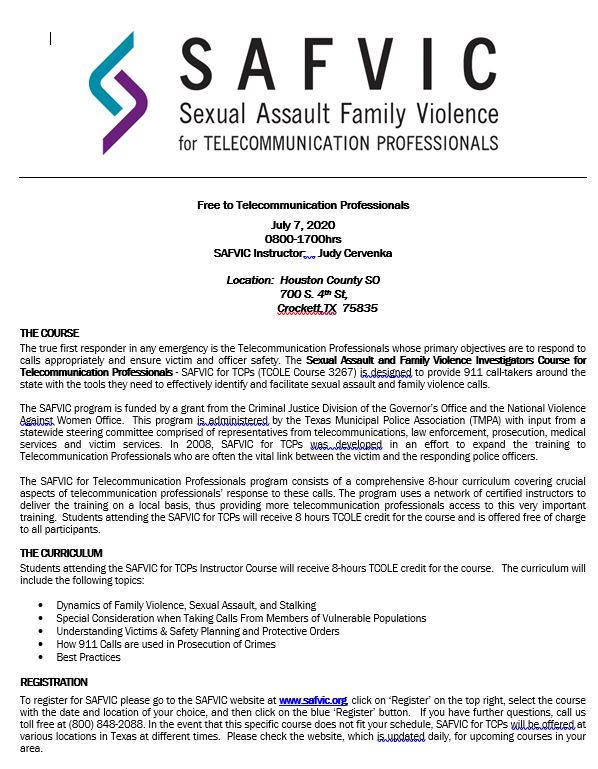Up Coming Training
This course teaches instructors how to provide supervised field training for new recruits in any law enforcement discipline. The goal is to transition the recruit from a classroom setting to an actual hands-on assignment. The course includes training in instructional techniques, coaching and evaluation, remedial training and record keeping. The course is designed to provide training guidance and training aspects to future Field Training Officers in the area of law enforcement, including peace officers, jailers, telecommunication operators, correction officers, public service officers, etc. This course also introduces and teaches the student the History and Purpose of Field Training, Training Methodologies and Techniques, Counseling, the Evaluation Process, and the importance of Documentation. Each student must demonstrate (evaluated at the end of the course) the basic knowledge required to effectively apply all applications of the training.
The applications will be available by the end of June. email Tracy.Edwards@victoriacollege.edu or call she will create a prospects lists and reach out to you when the applications are ready. Students will have to pass a Basic TCO entrance exam.
No Class FRIDAY THRU SUNDAY. CLASS WILL BE MONDAY THRU THURSDAY 0800-1800 Please read the entire description and rules for the course. Pre-requisite each student must hold a valid nationally recognized CPR certification. (Bring copy) The Basic Telecommunicator Licensing Course is designed to provide the new telecommunicator with an understanding of the emergency communications environment, and the core competencies in both emergency and non-emergency required by the commission for licensing. The course consists of 80 hours of curriculum including ten objectives as set forth by the commission. Upon passing the curriculum the student will be eligible to site for the Telecommunicator Licensing exam. DOLCE must be completed and emailed prior to the first day of class. Copy and past the below URL address in you search bar, for the DOLCE. Academy number 15700, Gus George Law Enforcement Academy. https://www.tcole.texas.gov/document/declaration-licensing-course-enrollment-eligibility_12.3.2019.pdf
Students must have their DPS user name prior to attendance. Please verify their user profile with course they are registered. This course is for operators who perform TCIC/NCIC functions at any level lower than full access. Generally, this pertains to inquiry only. It also covers navigation of the databases that are connected to the TLETS system such as administrative messages, driver license, vehicle registration, and instructions regarding proper procedures for broadcasting in the state and nationwide.
Students must have their DPS user name prior to attendance. Please verify their user profile with course they are registered. TCIC/TLETS Mobile Operator Training Course (TCOLE #4800 - 8 hours): This course is for operators who perform TCIC/NCIC functions at any level lower than full access. Generally, this pertains to inquiry only, including mobile digital terminal (MDT) or laptop computer operators. It also covers information license and vehicle registration.
No Class on the Weekend dates. Please read the entire description and rules for the course. Pre-requisite each student must hold a valid nationally recognized CPR certification. (Bring copy) The Basic Telecommunicator Licensing Course is designed to provide the new telecommunicator with an understanding of the emergency communications environment, and the core competencies in both emergency and non-emergency required by the commission for licensing. The course consists of 80 hours of curriculum including ten objectives as set forth by the commission. Upon passing the curriculum the student will be eligible to site for the Telecommunicator Licensing exam. DOLCE must be completed and emailed prior to the first day of class. Copy and past the below URL address in you search bar, for the DOLCE. Academy number 15700, Gus George Law Enforcement Academy. https://www.tcole.texas.gov/document/declaration-licensing-course-enrollment-eligibility_12.3.2019.pdf
Students must have their DPS user name prior to attendance. Please verify their user profile with course they are registered. This course is for operators who perform all TCIC/NCIC functions, including inquiry, entry, modification, clearing, canceling, and III functions. It also covers navigation of the databases that are connected to the TLETS system such as administrative messages, driver license, vehicle registration, and instructions regarding proper procedures for broadcasting in the state and nationwide. This course requires the TCIC/TLETS Operation Manual Parts 1 - 3. Operators must receive this training within the first six months of assignment or employment, regardless of whether these duties are performed on a full-time or part-time basis. In order to comply with federal requirements, operators must recertify within two years of certification or most recent recertification date. Please have your DPS user name, your agency will have submitted an user request form to DPS.
Students must have their DPS user name prior to attendance. Please verify their user profile with course they are registered. This course is for operators who perform TCIC/NCIC functions at any level lower than full access. Generally, this pertains to inquiry only. It also covers navigation of the databases that are connected to the TLETS system such as administrative messages, driver license, vehicle registration, and instructions regarding proper procedures for broadcasting in the state and nationwide. This course requires the TCIC/TLETS Operation Manual Parts 1 - 2. Operators must receive this training within the first six months of assignment or employment, regardless of whether these duties are performed on a full-time or part-time basis. In order to comply with federal requirements, operators must recertify within two years of certification or most recent recertification date. Please have your DPS user name, your agency will have submitted an user request form to DPS.
Students must have their DPS user name prior to attendance. Please verify their user profile with course they are registered. TCIC/TLETS Mobile Operator Training Course (TCOLE #4800 - 8 hours): This course is for operators who perform TCIC/NCIC functions at any level lower than full access. Generally, this pertains to inquiry only, including mobile digital terminal (MDT) or laptop computer operators. It also covers information about driver license and vehicle registration. This course requires the TCIC/TLETS Operation Manual Part 1. Operators must receive this training within the first six months of assignment or employment, regardless of whether these duties are performed on a full-time or part-time basis. Course In order to comply with federal requirements, operators must recertify within two years of certification or most recent recertification date. Please have your DPS user name, your agency will have submitted an user request form to DPS.
No Class on the Weekend dates. Please read the entire description and rules for the course. Pre-requisite each student must hold a valid nationally recognized CPR certification. (Bring copy) The Basic Telecommunicator Licensing Course is designed to provide the new telecommunicator with an understanding of the emergency communications environment, and the core competencies in both emergency and non-emergency required by the commission for licensing. The course consists of 80 hours of curriculum including ten objectives as set forth by the commission. Upon passing the curriculum the student will be eligible to site for the Telecommunicator Licensing exam. DOLCE must be completed and emailed prior to the first day of class. https://www.tcole.texas.gov/document/declaration-licensing-course-enrollment-eligibility_12.3.2019.pdf
No Class on the Weekend dates. Please read the entire description and rules for the course. Pre-requisite each student must hold a valid nationally recognized CPR certification. (Bring copy) The Basic Telecommunicator Licensing Course is designed to provide the new telecommunicator with an understanding of the emergency communications environment, and the core competencies in both emergency and non-emergency required by the commission for licensing. The course consists of 80 hours of curriculum including ten objectives as set forth by the commission. Upon passing the curriculum the student will be eligible to site for the Telecommunicator Licensing exam. DOLCE must be completed and emailed prior to the first day of class. https://www.tcole.texas.gov/document/declaration-licensing-course-enrollment-eligibility_12.3.2019.pdf
Students must have their DPS user name prior to attendance. Please verify their user profile with course they are registered. TCIC/TLETS Mobile Operator Training Course (TCOLE #4800 - 8 hours): This course is for operators who perform TCIC/NCIC functions at any level lower than full access. Generally, this pertains to inquiry only, including mobile digital terminal (MDT) or laptop computer operators. It also covers information about driver license and vehicle registration. This course requires the TCIC/TLETS Operation Manual Part 1. Operators must receive this training within the first six months of assignment or employment, regardless of whether these duties are performed on a full-time or part-time basis. Course In order to comply with federal requirements, operators must recertify within two years of certification or most recent recertification date. Please have your DPS user name, your agency will have submitted an user request form to DPS.
Students must have their DPS user name prior to attendance. Please verify their user profile with course they are registered. This course is for operators who perform TCIC/NCIC functions at any level lower than full access. Generally, this pertains to inquiry only. It also covers navigation of the databases that are connected to the TLETS system such as administrative messages, driver license, vehicle registration, and instructions regarding proper procedures for broadcasting in the state and nationwide. This course requires the TCIC/TLETS Operation Manual Parts 1 - 2. Operators must receive this training within the first six months of assignment or employment, regardless of whether these duties are performed on a full-time or part-time basis. In order to comply with federal requirements, operators must recertify within two years of certification or most recent recertification date. Please have your DPS user name, your agency will have submitted an user request form to DPS.
Students must have their DPS user name prior to attendance. Please verify their user profile with course they are registered. This course is for operators who perform all TCIC/NCIC functions, including inquiry, entry, modification, clearing, canceling, and III functions. It also covers navigation of the databases that are connected to the TLETS system such as administrative messages, driver license, vehicle registration, and instructions regarding proper procedures for broadcasting in the state and nationwide. This course requires the TCIC/TLETS Operation Manual Parts 1 - 3. Operators must receive this training within the first six months of assignment or employment, regardless of whether these duties are performed on a full-time or part-time basis. In order to comply with federal requirements, operators must recertify within two years of certification or most recent recertification date. Please have your DPS user name, your agency will have submitted an user request form to DPS.
No Class on the Weekend dates. Please read the entire description and rules for the course. Pre-requisite each student must hold a valid nationally recognized CPR certification. (Bring copy) The Basic Telecommunicator Licensing Course is designed to provide the new telecommunicator with an understanding of the emergency communications environment, and the core competencies in both emergency and non-emergency required by the commission for licensing. The course consists of 80 hours of curriculum including ten objectives as set forth by the commission. Upon passing the curriculum the student will be eligible to site for the Telecommunicator Licensing exam. Please contact me for an application or follow the link below' L1, L2, L3 and background screening must be provided. The Victoria College Law Enforcement Academy has adopted the National Dispatcher Selection Test, which is a valid, job-related test designed specifically for telecommunicator use, which measures these basic skills: Reading Comprehension, Listening, Problem Solving, Prioritizing, and Multitasking. A passing score of 70% will be required to be accepted. Completion of this test is required. DOLCE are not accepted by this Training Academy. https://drive.google.com/file/d/1ojCCrk1-HFhKW4eBUETSAprdQXi1so8u/view?usp=drive_link
Please read the entire description and rules for the course. Pre-requisite each student must hold a valid nationally recognized CPR certification. (Bring copy) The Basic Telecommunicator Licensing Course is designed to provide the new telecommunicator with an understanding of the emergency communications environment, and the core competencies in both emergency and non-emergency required by the commission for licensing. The course consists of 80 hours of curriculum including ten objectives as set forth by the commission. Upon passing the curriculum the student will be eligible to site for the Telecommunicator Licensing exam. Hyperlinks to mandatory documents must be filled out and emailed to tglpolicetelecommunications@gmail.com prior to acceptance into the course. The Document may also be found on the TCOLE website via this hyperlink: https://www.tcole.texas.gov//sites/default/files/FormsAppsPubs/ATP%2015.003%20Declaration%20of%20Licensing%20Course%20Enrollment%20Eligibility%2012.3.2019.pdf https://www.tcole.texas.gov//sites/default/files/FormsAppsPubs/Agency%20Audit%20Checklist.pdf
Please read the entire description and rules for the course. Pre-requisite each student must hold a valid nationally recognized CPR certification. (Bring copy) The Basic Telecommunicator Licensing Course is designed to provide the new telecommunicator with an understanding of the emergency communications environment, and the core competencies in both emergency and non-emergency required by the commission for licensing. The course consists of 80 hours of curriculum including ten objectives as set forth by the commission. Upon passing the curriculum the student will be eligible to site for the Telecommunicator Licensing exam. Hyperlinks to mandatory documents must be filled out and emailed to tglpolicetelecommunications@gmail.com prior to acceptance into the course. The Document may also be found on the TCOLE website via this hyperlink: https://www.tcole.texas.gov//sites/default/files/FormsAppsPubs/ATP%2015.003%20Declaration%20of%20Licensing%20Course%20Enrollment%20Eligibility%2012.3.2019.pdf https://www.tcole.texas.gov//sites/default/files/FormsAppsPubs/Agency%20Audit%20Checklist.pdf
Pre payment Required. Instructor Elias J. Rivera, M.S., C.C.S.I. LIMITED REGISTRATION EACH STUDENT NEEDS TO PROVIDE Small (3”x5”) white latent lift cards. Large (5 ½”x8½”) white latent lift cards. Fiberglass fingerprint brushes. Black latent print powder. 08 Crime Scene Investigation 40Hrs TCOLE 2106 The learning objectives are the minimum required content of the Intermediate Crime Scene Search Course. This course is a required course to obtain the Intermediate proficiency certification.
During this course, the student will learn the primary skills of being an effective trainer. The student will be provided an introduction to teaching adults, and their special needs and requirements as learners. The student will also gain knowledge of ways to improve interactions among generations, as well as evaluating, documentation and liabilities involved with training in the communications center. Students will be required to complete a 10 – 15 minute “teach back” to the entire class. We also ask that students bring a “current” evaluation used in training at their agency.
Students must have their DPS user name prior to attendance. Please verify their user profile with course they are registered. This course is for operators who perform TCIC/NCIC functions at any level lower than full access. Generally, this pertains to inquiry only. It also covers navigation of the databases that are connected to the TLETS system such as administrative messages, driver license, vehicle registration, and instructions regarding proper procedures for broadcasting in the state and nationwide. This course requires the TCIC/TLETS Operation Manual Parts 1 - 2. Operators must receive this training within the first six months of assignment or employment, regardless of whether these duties are performed on a full-time or part-time basis. In order to comply with federal requirements, operators must recertify within two years of certification or most recent recertification date. Please have your DPS user name, your agency will have submitted an user request form to DPS.
Students must have their DPS user name prior to attendance. Please verify their user profile with course they are registered. TCIC/TLETS Mobile Operator Training Course (TCOLE #4800 - 8 hours): This course is for operators who perform TCIC/NCIC functions at any level lower than full access. Generally, this pertains to inquiry only, including mobile digital terminal (MDT) or laptop computer operators. It also covers information about driver license and vehicle registration. This course requires the TCIC/TLETS Operation Manual Part 1. Operators must receive this training within the first six months of assignment or employment, regardless of whether these duties are performed on a full-time or part-time basis. Course In order to comply with federal requirements, operators must recertify within two years of certification or most recent recertification date. Please have your DPS user name, your agency will have submitted an user request form to DPS.
Students must have their DPS user name prior to attendance. Please verify their user profile with course they are registered. This course is for operators who perform all TCIC/NCIC functions, including inquiry, entry, modification, clearing, canceling, and III functions. It also covers navigation of the databases that are connected to the TLETS system such as administrative messages, driver license, vehicle registration, and instructions regarding proper procedures for broadcasting in the state and nationwide. This course requires the TCIC/TLETS Operation Manual Parts 1 - 3. Operators must receive this training within the first six months of assignment or employment, regardless of whether these duties are performed on a full-time or part-time basis. In order to comply with federal requirements, operators must recertify within two years of certification or most recent recertification date. Please have your DPS user name, your agency will have submitted an user request form to DPS.
Please read the entire description and rules for the course. Pre-requisite each student must hold a valid nationally recognized CPR certification. The Basic Telecommunicator Licensing Course is designed to provide the new telecommunicator with an understanding of the emergency communications environment, and the core competencies in both emergency and non-emergency required by the commission for licensing. The course consists of 80 hours of curriculum including ten objectives as set forth by the commission. Upon passing the curriculum the student will be eligible to site for the Telecommunicator Licensing exam. Hyperlinks to mandatory documents must be filled out and emailed to tglpolicetelecommunications@gmail.com prior to acceptance into the course. The Documents may also be found on the TCOLE website via this hyperlink: https://www.tcole.texas.gov//sites/default/files/FormsAppsPubs/ATP%2015.003%20Declaration%20of%20Licensing%20Course%20Enrollment%20Eligibility%2012.3.2019.pdf https://www.tcole.texas.gov//sites/default/files/FormsAppsPubs/Agency%20Audit%20Checklist.pdf
This is an open enrollment class please contact Tracy Edwards • (361) 573-3291 ext. 3208 • Tracy.Edwards@VictoriaCollege.edu for registration. The Basic Telecommunicator Licensing Course is designed to provide the new telecommunicator with an understanding of the emergency communications environment, and the core competencies in both emergency and non-emergency required by the commission for licensing. The course consists of 80 hours of curriculum including ten objectives as set forth by the commission. Upon passing the curriculum the student will be eligible to site for the Telecommunicator Licensing exam.
"911 telecommunicators are the counselor to a woman in need, faithful advisor to a man with nowhere to turn, and crime-stopping vigilante, all in a day’s work." While moments like these can mark high points in one’s 911 career, there’s also a dark side to the caregiver role. Being compassionate and empathetic are not without their own additional costs, and this weight can get heavy over the course of a career.
Pre payment Required. Law enforcement is being called upon to respond to individuals in serious mental health crises. It is necessary for law enforcement personnel to understand mental illness, and the tactics and techniques that have been proven to work most effectively when responding to individuals in these situations. These tactics and techniques are different than those routinely taught to officers to manage conflict. Generally, the underlying elements behind mental illness-related behavior is usually not criminal or malicious. Utilizing the information from this course, and implementing effective strategies can help keep the officer safe, keep the public safe, and greatly reduce civil liability.
During this course, the student will learn the primary skills of being an effective trainer. The student will be provided an introduction to teaching adults, and their special needs and requirements as learners. The student will also gain knowledge of ways to improve interactions among generations, as well as evaluating, documentation and liabilities involved with training in the communications center. Students will be required to complete a 10 – 15 minute “teach back” to the entire class. We also ask that students bring a “current” evaluation used in training at their agency.
This course is composed of seven units and is designed build upon the skills acquired during each unit. The jump-start unit is the main focus of this course. Within the jump-start unit are critical words and phrases that the student must completely master during this course. These phrases deal with safety and command and control during responses to a potentially dangerous incident. The student must be able to leave this course being able to repeat or interpret those phrases using only recall.
Pre payment Required. Instructor Elias J. Rivera, M.S., C.C.S.I. LIMITED REGISTRATION EACH STUDENT NEEDS TO PROVIDE Small (3”x5”) white latent lift cards. Large (5 ½”x8½”) white latent lift cards. Fiberglass fingerprint brushes. Black latent print powder. 08 Crime Scene Investigation 40Hrs TCOLE 2106 The learning objectives are the minimum required content of the Intermediate Crime Scene Search Course. This course is a required course to obtain the Intermediate proficiency certification.
Students must have their DPS user name prior to attendance. Please verify their user profile with course they are registered. This course is for operators who perform all TCIC/NCIC functions, including inquiry, entry, modification, clearing, canceling, and III functions. It also covers navigation of the databases that are connected to the TLETS system such as administrative messages, driver license, vehicle registration, and instructions regarding proper procedures for broadcasting in the state and nationwide. This course requires the TCIC/TLETS Operation Manual Parts 1 - 3. Operators must receive this training within the first six months of assignment or employment, regardless of whether these duties are performed on a full-time or part-time basis. In order to comply with federal requirements, operators must recertify within two years of certification or most recent recertification date. Please have your DPS user name, your agency will have submitted an user request form to DPS.
Students must have their DPS user name prior to attendance. Please verify their user profile with course they are registered. TCIC/TLETS Mobile Operator Training Course (TCOLE #4800 - 8 hours): This course is for operators who perform TCIC/NCIC functions at any level lower than full access. Generally, this pertains to inquiry only, including mobile digital terminal (MDT) or laptop computer operators. It also covers information about driver license and vehicle registration. This course requires the TCIC/TLETS Operation Manual Part 1. Operators must receive this training within the first six months of assignment or employment, regardless of whether these duties are performed on a full-time or part-time basis. Course In order to comply with federal requirements, operators must recertify within two years of certification or most recent recertification date. Please have your DPS user name, your agency will have submitted an user request form to DPS.
Students must have their DPS user name prior to attendance. Please verify their user profile with course they are registered. This course is for operators who perform TCIC/NCIC functions at any level lower than full access. Generally, this pertains to inquiry only. It also covers navigation of the databases that are connected to the TLETS system such as administrative messages, driver license, vehicle registration, and instructions regarding proper procedures for broadcasting in the state and nationwide. This course requires the TCIC/TLETS Operation Manual Parts 1 - 2. Operators must receive this training within the first six months of assignment or employment, regardless of whether these duties are performed on a full-time or part-time basis. In order to comply with federal requirements, operators must recertify within two years of certification or most recent recertification date. Please have your DPS user name, your agency will have submitted an user request form to DPS.
Please read the entire description and rules for the course. Pre-requisite each student must hold a valid nationally recognized CPR certification. The Basic Telecommunicator Licensing Course is designed to provide the new telecommunicator with an understanding of the emergency communications environment, and the core competencies in both emergency and non-emergency required by the commission for licensing. The course consists of 80 hours of curriculum including ten objectives as set forth by the commission. Upon passing the curriculum the student will be eligible to site for the Telecommunicator Licensing exam. Hyperlinks to mandatory documents must be filled out and emailed to tglpolicetelecommunications@gmail.com prior to acceptance into the course. The Documents may also be found on the TCOLE website via this hyperlink: http://www.tcole.texas.gov/sites/default/files/FormsAppsPubs/ATP%2015.003%20Declaration%20of%20Licensing%20Course%20Enrollment%20Eligibility%2012.3.2019.pdf http://www.tcole.texas.gov/sites/default/files/FormsAppsPubs/AGF%2003.001%20Law%20Enforcement%20Agency%20Audit%20Checklist%204.30.2018.pdf
Pre payment Required. Law enforcement is being called upon to respond to individuals in serious mental health crises. It is necessary for law enforcement personnel to understand mental illness, and the tactics and techniques that have been proven to work most effectively when responding to individuals in these situations. These tactics and techniques are different than those routinely taught to officers to manage conflict. Generally, the underlying elements behind mental illness-related behavior is usually not criminal or malicious. Utilizing the information from this course, and implementing effective strategies can help keep the officer safe, keep the public safe, and greatly reduce civil liability.
During this course, the student will learn the primary skills of being an effective trainer. The student will be provided an introduction to teaching adults, and their special needs and requirements as learners. The student will also gain knowledge of ways to improve interactions among generations, as well as evaluating, documentation and liabilities involved with training in the communications center. Students will be required to complete a 10 – 15 minute “teach back” to the entire class. We also ask that students bring a “current” evaluation used in training at their agency.
During this course, the student will learn the primary skills of being an effective trainer. The student will be provided an introduction to teaching adults, and their special needs and requirements as learners. The student will also gain knowledge of ways to improve interactions among generations, as well as evaluating, documentation and liabilities involved with training in the communications center. Students will be required to complete a 10 – 15 minute “teach back” to the entire class. We also ask that students bring a “current” evaluation used in training at their agency.
Students must have their DPS user name prior to attendance. Please verify their user profile with course they are registered. TCIC/TLETS Mobile Operator Training Course (TCOLE #4800 - 8 hours): This course is for operators who perform TCIC/NCIC functions at any level lower than full access. Generally, this pertains to inquiry only, including mobile digital terminal (MDT) or laptop computer operators. It also covers information about driver license and vehicle registration. This course requires the TCIC/TLETS Operation Manual Part 1. Operators must receive this training within the first six months of assignment or employment, regardless of whether these duties are performed on a full-time or part-time basis. Course In order to comply with federal requirements, operators must recertify within two years of certification or most recent recertification date. Please have your DPS user name, your agency will have submitted an user request form to DPS.
PER TCOLE IRG Students must be licensed telecommunicators. This excludes temporary telecommunicators. The student will need to take hands on CPR before taking the 1080, the CPR course must be reported to TCOLE. The completion of the 1080 will meet the requirements of 786 for their first cycle. (1080 has the 786 built into the curriculum.) This course is designed to meet the legislative mandate in HB 786 passed by the 87th Texas Legislature that amends Texas Occupations Code Chapter 1701. Cardiac Emergency Communication is designed to teach all telecommunicators how to identify when cardiopulmonary resuscitation (CPR) is needed and how to talk a caller through the process. In order to do this, a telecommunicator must first be certified in CPR training. This course does not certify a telecommunicator in CPR. Cardiac Emergency Communication meets the legislative mandate and continuing education requirements to ensure all telecommunicators are trained in responding to a caller in Out-of-Hospital Cardiac Arrest (OHCA).
PER TCOLE IRG Students must be licensed telecommunicators. This excludes temporary telecommunicators. The student will need to take hands on CPR before taking the 1080, the CPR course must be reported to TCOLE. The completion of the 1080 will meet the requirements of 786 for their first cycle. (1080 has the 786 built into the curriculum.) This course is designed to meet the legislative mandate in HB 786 passed by the 87th Texas Legislature that amends Texas Occupations Code Chapter 1701. Cardiac Emergency Communication is designed to teach all telecommunicators how to identify when cardiopulmonary resuscitation (CPR) is needed and how to talk a caller through the process. In order to do this, a telecommunicator must first be certified in CPR training. This course does not certify a telecommunicator in CPR. Cardiac Emergency Communication meets the legislative mandate and continuing education requirements to ensure all telecommunicators are trained in responding to a caller in Out-of-Hospital Cardiac Arrest (OHCA).
Students must have their DPS user name prior to attendance. Please verify their user profile with course they are registered. TCIC/TLETS Mobile Operator Training Course (TCOLE #4800 - 8 hours): This course is for operators who perform TCIC/NCIC functions at any level lower than full access. Generally, this pertains to inquiry only, including mobile digital terminal (MDT) or laptop computer operators. It also covers information about driver license and vehicle registration. This course requires the TCIC/TLETS Operation Manual Part 1. Operators must receive this training within the first six months of assignment or employment, regardless of whether these duties are performed on a full-time or part-time basis. Course In order to comply with federal requirements, operators must recertify within two years of certification or most recent recertification date. Please have your DPS user name, your agency will have submitted an user request form to DPS.
Students must have their DPS user name prior to attendance. Please verify their user profile with course they are registered. TCIC/TLETS Mobile Operator Training Course (TCOLE #4800 - 8 hours): This course is for operators who perform TCIC/NCIC functions at any level lower than full access. Generally, this pertains to inquiry only, including mobile digital terminal (MDT) or laptop computer operators. It also covers information about driver license and vehicle registration. This course requires the TCIC/TLETS Operation Manual Part 1. Operators must receive this training within the first six months of assignment or employment, regardless of whether these duties are performed on a full-time or part-time basis. Course In order to comply with federal requirements, operators must recertify within two years of certification or most recent recertification date. Please have your DPS user name, your agency will have submitted an user request form to DPS.
Students must have their DPS user name prior to attendance. Please verify their user profile with course they are registered. This course is for operators who perform TCIC/NCIC functions at any level lower than full access. Generally, this pertains to inquiry only. It also covers navigation of the databases that are connected to the TLETS system such as administrative messages, driver license, vehicle registration, and instructions regarding proper procedures for broadcasting in the state and nationwide. This course requires the TCIC/TLETS Operation Manual Parts 1 - 2. Operators must receive this training within the first six months of assignment or employment, regardless of whether these duties are performed on a full-time or part-time basis. In order to comply with federal requirements, operators must recertify within two years of certification or most recent recertification date. Please have your DPS user name, your agency will have submitted an user request form to DPS.
Students must have their DPS user name prior to attendance. Please verify their user profile with course they are registered. This course is for operators who perform all TCIC/NCIC functions, including inquiry, entry, modification, clearing, canceling, and III functions. It also covers navigation of the databases that are connected to the TLETS system such as administrative messages, driver license, vehicle registration, and instructions regarding proper procedures for broadcasting in the state and nationwide. This course requires the TCIC/TLETS Operation Manual Parts 1 - 3. Operators must receive this training within the first six months of assignment or employment, regardless of whether these duties are performed on a full-time or part-time basis. In order to comply with federal requirements, operators must recertify within two years of certification or most recent recertification date. Please have your DPS user name, your agency will have submitted an user request form to DPS.
Pre payment Required. Instructor Elias J. Rivera, M.S., C.C.S.I. LIMITED REGISTRATION EACH STUDENT NEEDS TO PROVIDE Small (3”x5”) white latent lift cards. Large (5 ½”x8½”) white latent lift cards. Fiberglass fingerprint brushes. Black latent print powder. 08 Crime Scene Investigation 40Hrs TCOLE 2106 The learning objectives are the minimum required content of the Intermediate Crime Scene Search Course. This course is a required course to obtain the Intermediate proficiency certification.
Attire will be agency uniform or business casual throughout the entire week. As part of the course, you will be required to complete two formal presentations which will require the development of a course file for each. These course files will include your instructor biography, your lesson plan, and your PowerPoint/Keynote presentation. Class will start promptly at 8am each day, so we ask that you be in your seat, ready to go at that time Please ensure you bring a laptop with PowerPoint/Keynote capabilities. Feel free to contact Frank Muniz with any questions: (713) 306-3391
Students must have their DPS user name prior to attendance. Please verify their user profile with course they are registered. This course is for operators who perform all TCIC/NCIC functions, including inquiry, entry, modification, clearing, canceling, and III functions. It also covers navigation of the databases that are connected to the TLETS system such as administrative messages, driver license, vehicle registration, and instructions regarding proper procedures for broadcasting in the state and nationwide. This course requires the TCIC/TLETS Operation Manual Parts 1 - 3. Operators must receive this training within the first six months of assignment or employment, regardless of whether these duties are performed on a full-time or part-time basis. In order to comply with federal requirements, operators must recertify within two years of certification or most recent recertification date. Please have your DPS user name, your agency will have submitted an user request form to DPS.
Students must have their DPS user name prior to attendance. Please verify their user profile with course they are registered. TCIC/TLETS Mobile Operator Training Course (TCOLE #4800 - 8 hours): This course is for operators who perform TCIC/NCIC functions at any level lower than full access. Generally, this pertains to inquiry only, including mobile digital terminal (MDT) or laptop computer operators. It also covers information about driver license and vehicle registration. This course requires the TCIC/TLETS Operation Manual Part 1. Operators must receive this training within the first six months of assignment or employment, regardless of whether these duties are performed on a full-time or part-time basis. Course In order to comply with federal requirements, operators must recertify within two years of certification or most recent recertification date. Please have your DPS user name, your agency will have submitted an user request form to DPS.
Students must have their DPS user name prior to attendance. Please verify their user profile with course they are registered. This course is for operators who perform TCIC/NCIC functions at any level lower than full access. Generally, this pertains to inquiry only. It also covers navigation of the databases that are connected to the TLETS system such as administrative messages, driver license, vehicle registration, and instructions regarding proper procedures for broadcasting in the state and nationwide. This course requires the TCIC/TLETS Operation Manual Parts 1 - 2. Operators must receive this training within the first six months of assignment or employment, regardless of whether these duties are performed on a full-time or part-time basis. In order to comply with federal requirements, operators must recertify within two years of certification or most recent recertification date. Please have your DPS user name, your agency will have submitted an user request form to DPS.
Law enforcement Officers are in daily contact will all types of people. Considering that nearly 10% of the US population has some sort of hearing loss, it is reasonable to assume that some of those contacts would be with individuals who are deaf or hard of hearing, especially with the baby boomers reaching their senior years. According to the Americans with Disabilities Act (ADA), people who are deaf or hard of hearing should be given the same services provided to the other 90% of the population. They may not be excluded or segregated from services. This course will be co-presented with a subject matter expert from the deaf and hard of hearing community. This course is a required course to be completed no later than the second anniversary of the date the officer is licensed or the date an officer applies for an intermediate proficiency certificate, whichever date is earlier.
The course will help the new supervisor make the transition from a co-working peer to a supervisory position. We will talk about mistakes made by new managers, guidelines for transitioning from line worker to supervisor. The class will discuss rationales for fulfilling the position and general guidelines for supervising former peers. We will delve into effective ways to deal with different personalities including generation gaps. Characteristics of effective leaders, leadership styles and being approachable. The class will cover some counseling session and behaviors as well as other aspects of being an effective supervisor.
PER TCOLE IRG Students must be licensed telecommunicators. This excludes temporary telecommunicators This course is designed to meet the legislative mandate in HB 786 passed by the 87th Texas Legislature that amends Texas Occupations Code Chapter 1701. Cardiac Emergency Communication is designed to teach all telecommunicators how to identify when cardiopulmonary resuscitation (CPR) is needed and how to talk a caller through the process. In order to do this, a telecommunicator must first be certified in CPR training. This course does not certify a telecommunicator in CPR. Cardiac Emergency Communication meets the legislative mandate and continuing education requirements to ensure all telecommunicators are trained in responding to a caller in Out-of-Hospital Cardiac Arrest (OHCA).
PER TCOLE IRG Students must be licensed telecommunicators. This excludes temporary telecommunicators. The student will need to take hands on CPR before taking the 1080, the CPR course must be reported to TCOLE. The completion of the 1080 will meet the requirements of 786 for their first cycle. (1080 has the 786 built into the curriculum.) The student will need to take hands on CPR before taking the 1080, the CPR course must be reported to TCOLE. The completion of the 1080 will meet the requirements of 786 for their first cycle. (1080 has the 786 built into the curriculum.) This course is designed to meet the legislative mandate in HB 786 passed by the 87th Texas Legislature that amends Texas Occupations Code Chapter 1701. Cardiac Emergency Communication is designed to teach all telecommunicators how to identify when cardiopulmonary resuscitation (CPR) is needed and how to talk a caller through the process. In order to do this, a telecommunicator must first be certified in CPR training. This course does not certify a telecommunicator in CPR. Cardiac Emergency Communication meets the legislative mandate and continuing education requirements to ensure all telecommunicators are trained in responding to a caller in Out-of-Hospital Cardiac Arrest (OHCA).
Law enforcement Officers are in daily contact will all types of people. Considering that nearly 10% of the US population has some sort of hearing loss, it is reasonable to assume that some of those contacts would be with individuals who are deaf or hard of hearing, especially with the baby boomers reaching their senior years. According to the Americans with Disabilities Act (ADA), people who are deaf or hard of hearing should be given the same services provided to the other 90% of the population. They may not be excluded or segregated from services. This course will be co-presented with a subject matter expert from the deaf and hard of hearing community. This course is a required course to be completed no later than the second anniversary of the date the officer is licensed or the date an officer applies for an intermediate proficiency certificate, whichever date is earlier.
The dispatcher is the vital link, ensuring clear communication between all responders, affecting the safety of both the citizen in need and the police, fire and emergency medical personnel responding. Through our actions, we help save lives, protect property, and assist the public in their time of need. Dispatcher liability is a growing concern in any public safety agency. It is not just a management concern; your seemingly small actions or inactions can put everyone - from yourselves to the agency head - in court. Most of them are avoidable. The students will identify two of three conditions that allow individuals to file claims against the government. During this course the student will learn the most effective way to lower agency liability, definition of vicarious liability and what it means to them the student will learn about what constitutes a “special relationship” with a caller. We will discuss court case old and new discussing qualified immunity and applications. The student will learn several ways in which they can reduce liability exposure.
Please read the entire description and rules for the course. Pre-requisite each student must hold a valid nationally recognized CPR certification. The Basic Telecommunicator Licensing Course is designed to provide the new telecommunicator with an understanding of the emergency communications environment, and the core competencies in both emergency and non-emergency required by the commission for licensing. The course consists of 80 hours of curriculum including ten objectives as set forth by the commission. Upon passing the curriculum the student will be eligible to site for the Telecommunicator Licensing exam. Hyperlinks to mandatory documents must be filled out and emailed to tglpolicetelecommunications@gmail.com prior to acceptance into the course. The Documents may also be found on the TCOLE website via this hyperlink: http://www.tcole.texas.gov/sites/default/files/FormsAppsPubs/ATP%2015.003%20Declaration%20of%20Licensing%20Course%20Enrollment%20Eligibility%2012.3.2019.pdf http://www.tcole.texas.gov/sites/default/files/FormsAppsPubs/AGF%2003.001%20Law%20Enforcement%20Agency%20Audit%20Checklist%204.30.2018.pdf
Students must have their DPS user name prior to attendance. Please verify their user profile with course they are registered. TCIC/TLETS Mobile Operator Training Course (TCOLE #4800 - 8 hours): This course is for operators who perform TCIC/NCIC functions at any level lower than full access. Generally, this pertains to inquiry only, including mobile digital terminal (MDT) or laptop computer operators. It also covers information about driver license and vehicle registration. This course requires the TCIC/TLETS Operation Manual Part 1. Operators must receive this training within the first six months of assignment or employment, regardless of whether these duties are performed on a full-time or part-time basis. Course In order to comply with federal requirements, operators must recertify within two years of certification or most recent recertification date. Please have your DPS user name, your agency will have submitted an user request form to DPS.
Students must have their DPS user name prior to attendance. Please verify their user profile with course they are registered. This course is for operators who perform all TCIC/NCIC functions, including inquiry, entry, modification, clearing, canceling, and III functions. It also covers navigation of the databases that are connected to the TLETS system such as administrative messages, driver license, vehicle registration, and instructions regarding proper procedures for broadcasting in the state and nationwide. This course requires the TCIC/TLETS Operation Manual Parts 1 - 3. Operators must receive this training within the first six months of assignment or employment, regardless of whether these duties are performed on a full-time or part-time basis. In order to comply with federal requirements, operators must recertify within two years of certification or most recent recertification date. Please have your DPS user name, your agency will have submitted an user request form to DPS.
Students must have their DPS user name prior to attendance. Please verify their user profile with course they are registered. This course is for operators who perform TCIC/NCIC functions at any level lower than full access. Generally, this pertains to inquiry only. It also covers navigation of the databases that are connected to the TLETS system such as administrative messages, driver license, vehicle registration, and instructions regarding proper procedures for broadcasting in the state and nationwide. This course requires the TCIC/TLETS Operation Manual Parts 1 - 2. Operators must receive this training within the first six months of assignment or employment, regardless of whether these duties are performed on a full-time or part-time basis. In order to comply with federal requirements, operators must recertify within two years of certification or most recent recertification date. Please have your DPS user name, your agency will have submitted an user request form to DPS.
This course is designed to meet the legislative mandate in HB 786 passed by the 87th Texas Legislature that amends Texas Occupations Code Chapter 1701. Cardiac Emergency Communication is designed to teach all telecommunicators how to identify when cardiopulmonary resuscitation (CPR) is needed and how to talk a caller through the process. In order to do this, a telecommunicator must first be certified in CPR training. This course does not certify a telecommunicator in CPR. Cardiac Emergency Communication meets the legislative mandate and continuing education requirements to ensure all telecommunicators are trained in responding to a caller in Out-of-Hospital Cardiac Arrest (OHCA).
This course is designed to meet the legislative mandate in HB 786 passed by the 87th Texas Legislature that amends Texas Occupations Code Chapter 1701. Cardiac Emergency Communication is designed to teach all telecommunicators how to identify when cardiopulmonary resuscitation (CPR) is needed and how to talk a caller through the process. In order to do this, a telecommunicator must first be certified in CPR training. This course does not certify a telecommunicator in CPR. Cardiac Emergency Communication meets the legislative mandate and continuing education requirements to ensure all telecommunicators are trained in responding to a caller in Out-of-Hospital Cardiac Arrest (OHCA).
During this course, the student will learn the primary skills of being an effective trainer. The student will be provided an introduction to teaching adults, and their special needs and requirements as learners. The student will also gain knowledge of ways to improve interactions among generations, as well as evaluating, documentation and liabilities involved with training in the communications center. Students will be required to complete a 10 – 15 minute “teach back” to the entire class. We also ask that students bring a “current” evaluation used in training at their agency.
Please read the entire description and rules for the course. Pre-requisite each student must hold a valid nationally recognized CPR certification. The Basic Telecommunicator Licensing Course is designed to provide the new telecommunicator with an understanding of the emergency communications environment, and the core competencies in both emergency and non-emergency required by the commission for licensing. The course consists of 80 hours of curriculum including ten objectives as set forth by the commission. Upon passing the curriculum the student will be eligible to site for the Telecommunicator Licensing exam. Hyperlinks to mandatory documents must be filled out and emailed to tglpolicetelecommunications@gmail.com prior to acceptance into the course. The Documents may also be found on the TCOLE website via this hyperlink: http://www.tcole.texas.gov/sites/default/files/FormsAppsPubs/ATP%2015.003%20Declaration%20of%20Licensing%20Course%20Enrollment%20Eligibility%2012.3.2019.pdf http://www.tcole.texas.gov/sites/default/files/FormsAppsPubs/AGF%2003.001%20Law%20Enforcement%20Agency%20Audit%20Checklist%204.30.2018.pdf
Officers successfully completing the SAFVIC will receive 24 hours of credit from TCOLE (Course Reporting Number 3264). The course is designed to satisfy the requirements of TCOLE’s Special Investigative Topics (Course Reporting Number 3232) and successful students will be eligible for a TCOLE Sexual Assault/Family Violence Investigator Certificate.
Pre payment Required. Instructor Elias J. Rivera, M.S., C.C.S.I. LIMITED REGISTRATION EACH STUDENT NEEDS TO PROVIDE Small (3”x5”) white latent lift cards. Large (5 ½”x8½”) white latent lift cards. Fiberglass fingerprint brushes. Black latent print powder. 08 Crime Scene Investigation 40Hrs TCOLE 2106 The learning objectives are the minimum required content of the Intermediate Crime Scene Search Course. This course is a required course to obtain the Intermediate proficiency certification.
PrePayment Required Instructor: Elias J. Rivera, M.S., C.C.S.I. EACH STUDENT NEEDS TO PROVIDE Small (3”x5”) white latent lift cards. Large (5 ½”x8½”) white latent lift cards. Fiberglass fingerprint brushes. Black latent print powder. 08 Crime Scene Investigation 40Hrs TCOLE 2106 The learning objectives are the minimum required content of the Intermediate Crime Scene Search Course. This course is a required course to obtain the Intermediate proficiency certification.
Officers successfully completing the SAFVIC will receive 24 hours of credit from TCOLE (Course Reporting Number 3264). The course is designed to satisfy the requirements of TCOLE’s Special Investigative Topics (Course Reporting Number 3232) and successful students will be eligible for a TCOLE Sexual Assault/Family Violence Investigator Certificate.
TCIC/TLETS Mobile Operator Training Course (TCOLE #4800 - 8 hours): This course is for operators who perform TCIC/NCIC functions at any level lower than full access. Generally, this pertains to inquiry only, including mobile digital terminal (MDT) or laptop computer operators. It also covers information about driver license and vehicle registration. This course requires the TCIC/TLETS Operation Manual Part 1. Operators must receive this training within the first six months of assignment or employment, regardless of whether these duties are performed on a full-time or part-time basis. Course In order to comply with federal requirements, operators must recertify within two years of certification or most recent recertification date. Please have your DPS user name, your agency will have submitted an user request form to DPS.
This course is for operators who perform all TCIC/NCIC functions, including inquiry, entry, modification, clearing, canceling, and III functions. It also covers navigation of the databases that are connected to the TLETS system such as administrative messages, driver license, vehicle registration, and instructions regarding proper procedures for broadcasting in the state and nationwide. This course requires the TCIC/TLETS Operation Manual Parts 1 - 3. Operators must receive this training within the first six months of assignment or employment, regardless of whether these duties are performed on a full-time or part-time basis. In order to comply with federal requirements, operators must recertify within two years of certification or most recent recertification date. Please have your DPS user name, your agency will have submitted an user request form to DPS.
This course is for operators who perform TCIC/NCIC functions at any level lower than full access. Generally, this pertains to inquiry only. It also covers navigation of the databases that are connected to the TLETS system such as administrative messages, driver license, vehicle registration, and instructions regarding proper procedures for broadcasting in the state and nationwide. This course requires the TCIC/TLETS Operation Manual Parts 1 - 2. Operators must receive this training within the first six months of assignment or employment, regardless of whether these duties are performed on a full-time or part-time basis. In order to comply with federal requirements, operators must recertify within two years of certification or most recent recertification date. Please have your DPS user name, your agency will have submitted an user request form to DPS.
Please read the entire description and rules for the course. Pre-requisite each student must hold a valid nationally recognized CPR certification. The Basic Telecommunicator Licensing Course is designed to provide the new telecommunicator with an understanding of the emergency communications environment, and the core competencies in both emergency and non-emergency required by the commission for licensing. The course consists of 80 hours of curriculum including ten objectives as set forth by the commission. Upon passing the curriculum the student will be eligible to site for the Telecommunicator Licensing exam. Students will need to make an appointment to take the licensing test at one of the following locations: Victoria College 2200 E. Red River, Victoria TX 77901. Contact Donna Rodriguez @361-572-6480 Wharton Junior College 911 E Boling Highway, Wharton TX 77488. Contact Timothy Guin @979-532-6575 GGLEA 1521 Eugene Heiman Ci, Richmond TX, 77469. Contact Donna Silewicz @281-341-4780 Hyperlinks to mandatory documents must be filled out and emailed to tglpolicetelecommunications@gmail.com prior to acceptance into the course. The Documents may also be found on the TCOLE website via this hyperlink: http://www.tcole.texas.gov/sites/default/files/FormsAppsPubs/ATP%2015.003%20Declaration%20of%20Licensing%20Course%20Enrollment%20Eligibility%2012.3.2019.pdf http://www.tcole.texas.gov/sites/default/files/FormsAppsPubs/AGF%2003.001%20Law%20Enforcement%20Agency%20Audit%20Checklist%204.30.2018.pdf
The dispatcher is the vital link, ensuring clear communication between all responders, affecting the safety of both the citizen in need and the police, fire and emergency medical personnel responding. Through our actions, we help save lives, protect property, and assist the public in their time of need. Dispatcher liability is a growing concern in any public safety agency. It is not just a management concern; your seemingly small actions or inactions can put everyone - from yourselves to the agency head - in court. Most of them are avoidable. The students will identify two of three conditions that allow individuals to file claims against the government. During this course the student will learn the most effective way to lower agency liability, definition of vicarious liability and what it means to them the student will learn about what constitutes a “special relationship” with a caller. We will discuss court case old and new discussing qualified immunity and applications. The student will learn several ways in which they can reduce liability exposure.
Law enforcement Officers are in daily contact will all types of people. Considering that nearly 10% of the US population has some sort of hearing loss, it is reasonable to assume that some of those contacts would be with individuals who are deaf or hard of hearing, especially with the baby boomers reaching their senior years. According to the Americans with Disabilities Act (ADA), people who are deaf or hard of hearing should be given the same services provided to the other 90% of the population. They may not be excluded or segregated from services. This course will be co-presented with a subject matter expert from the deaf and hard of hearing community. This course is a required course to be completed no later than the second anniversary of the date the officer is licensed or the date an officer applies for an intermediate proficiency certificate, whichever date is earlier.
Law enforcement Officers are in daily contact will all types of people. Considering that nearly 10% of the US population has some sort of hearing loss, it is reasonable to assume that some of those contacts would be with individuals who are deaf or hard of hearing, especially with the baby boomers reaching their senior years. According to the Americans with Disabilities Act (ADA), people who are deaf or hard of hearing should be given the same services provided to the other 90% of the population. They may not be excluded or segregated from services. This course will be co-presented with a subject matter expert from the deaf and hard of hearing community. This course is a required course to be completed no later than the second anniversary of the date the officer is licensed or the date an officer applies for an intermediate proficiency certificate, whichever date is earlier.
The course will help the new supervisor make the transition from a co-working peer to a supervisory position. We will talk about mistakes made by new managers, guidelines for transitioning from line worker to supervisor. The class will discuss rationales for fulfilling the position and general guidelines for supervising former peers. We will delve into effective ways to deal with different personalities including generation gaps. Characteristics of effective leaders, leadership styles and being approachable. The class will cover some counseling session and behaviors as well as other aspects of being an effective supervisor.
The Sexual Assault and Family Violence Investigator’s Course – or SAFVIC (TCOLE Course 3264) is designed to provide law enforcement officers around the state with the tools they need to effectively investigate and prevent sexual assault and family violence. The SAFVIC is funded by a grant from the Criminal Justice Division of the Governor’s Office and the National Violence Against Women Office. This program is administered by the Texas Municipal Police Association with input from a statewide steering committee comprised of representatives from law enforcement, prosecution and victim services. Register @ http://register.safvic.org/schedule/list.asp
Please read the entire description and rules for the course. The Basic Telecommunicator Licensing Course is designed to provide the new telecommunicator with an understanding of the emergency communications environment, and the core competencies in both emergency and non-emergency required by the commission for licensing. The course consists of 80 hours of curriculum including ten objectives as set forth by the commission. Upon passing the curriculum the student will be eligible to site for the Telecommunicator Licensing exam. Hyperlinks to mandatory documents must be filled out and emailed to tglpolicetelecommunications@gmail.com prior to acceptance into the course. The Documents may also be found on the TCOLE website via this hyperlink: http://www.tcole.texas.gov/sites/default/files/FormsAppsPubs/ATP%2015.003%20Declaration%20of%20Licensing%20Course%20Enrollment%20Eligibility%2012.3.2019.pdf http://www.tcole.texas.gov/sites/default/files/FormsAppsPubs/AGF%2003.001%20Law%20Enforcement%20Agency%20Audit%20Checklist%204.30.2018.pdf
Law enforcement Officers are in daily contact will all types of people. Considering that nearly 10% of the US population has some sort of hearing loss, it is reasonable to assume that some of those contacts would be with individuals who are deaf or hard of hearing, especially with the baby boomers reaching their senior years. According to the Americans with Disabilities Act (ADA), people who are deaf or hard of hearing should be given the same services provided to the other 90% of the population. They may not be excluded or segregated from services. This course will be co-presented with a subject matter expert from the deaf and hard of hearing community. This course is a required course to be completed no later than the second anniversary of the date the officer is licensed or the date an officer applies for an intermediate proficiency certificate, whichever date is earlier.
Law enforcement Officers are in daily contact will all types of people. Considering that nearly 10% of the US population has some sort of hearing loss, it is reasonable to assume that some of those contacts would be with individuals who are deaf or hard of hearing, especially with the baby boomers reaching their senior years. According to the Americans with Disabilities Act (ADA), people who are deaf or hard of hearing should be given the same services provided to the other 90% of the population. They may not be excluded or segregated from services. This course will be co-presented with a subject matter expert from the deaf and hard of hearing community. This course is a required course to be completed no later than the second anniversary of the date the officer is licensed or the date an officer applies for an intermediate proficiency certificate, whichever date is earlier.
TCIC/TLETS Mobile Operator Training Course (TCOLE #4800 - 8 hours): This course is for operators who perform TCIC/NCIC functions at any level lower than full access. Generally, this pertains to inquiry only, including mobile digital terminal (MDT) or laptop computer operators. It also covers information about driver license and vehicle registration. This course requires the TCIC/TLETS Operation Manual Part 1. Operators must receive this training within the first six months of assignment or employment, regardless of whether these duties are performed on a full-time or part-time basis. Course In order to comply with federal requirements, operators must recertify within two years of certification or most recent recertification date. Please have your DPS user name, your agency will have submitted an user request form to DPS.
This course is for operators who perform all TCIC/NCIC functions, including inquiry, entry, modification, clearing, canceling, and III functions. It also covers navigation of the databases that are connected to the TLETS system such as administrative messages, driver license, vehicle registration, and instructions regarding proper procedures for broadcasting in the state and nationwide. This course requires the TCIC/TLETS Operation Manual Parts 1 - 3. Operators must receive this training within the first six months of assignment or employment, regardless of whether these duties are performed on a full-time or part-time basis. In order to comply with federal requirements, operators must recertify within two years of certification or most recent recertification date. Please have your DPS user name, your agency will have submitted an user request form to DPS.
This course is for operators who perform TCIC/NCIC functions at any level lower than full access. Generally, this pertains to inquiry only. It also covers navigation of the databases that are connected to the TLETS system such as administrative messages, driver license, vehicle registration, and instructions regarding proper procedures for broadcasting in the state and nationwide. This course requires the TCIC/TLETS Operation Manual Parts 1 - 2. Operators must receive this training within the first six months of assignment or employment, regardless of whether these duties are performed on a full-time or part-time basis. In order to comply with federal requirements, operators must recertify within two years of certification or most recent recertification date. Please have your DPS user name, your agency will have submitted an user request form to DPS.
THE COURSE The true first responder in any emergency is the Telecommunication Professionals whose primary objectives are to respond to calls appropriately and ensure victim and officer safety. The Sexual Assault and Family Violence Investigators Course for Telecommunication Professionals - SAFVIC for TCPs (TCOLE Course 3267) is designed to provide 911 call-takers around the state with the tools they need to effectively identify and facilitate sexual assault and family violence calls. Instructor Judy Cervenka
"911 telecommunicators are the counselor to a woman in need, faithful advisor to a man with nowhere to turn, and crime-stopping vigilante, all in a day’s work." While moments like these can mark high points in one’s 911 career, there’s also a dark side to the caregiver role. Being compassionate and empathetic are not without their own additional costs, and this weight can get heavy over the course of a career.
Please read the entire description and rules for the course. The Basic Telecommunicator Licensing Course is designed to provide the new telecommunicator with an understanding of the emergency communications environment, and the core competencies in both emergency and non-emergency required by the commission for licensing. The course consists of 80 hours of curriculum including ten objectives as set forth by the commission. Upon passing the curriculum the student will be eligible to site for the Telecommunicator Licensing exam. Hyperlinks to mandatory documents must be filled out and emailed to tglpolicetelecommunications@gmail.com prior to acceptance into the course. The Documents may also be found on the TCOLE website via this hyperlink: http://www.tcole.texas.gov/sites/default/files/FormsAppsPubs/ATP%2015.003%20Declaration%20of%20Licensing%20Course%20Enrollment%20Eligibility%2012.3.2019.pdf http://www.tcole.texas.gov/sites/default/files/FormsAppsPubs/AGF%2003.001%20Law%20Enforcement%20Agency%20Audit%20Checklist%204.30.2018.pdf
1. The student will define the term active shooter. 2. The student shall recite the difference between a hostage vs baraicaded event 3. Students will list places where active shooter events occur. 4. The student will identify characteristics of an active shooter. 5. The student shall recite the 5 phases of a active shooter.
Meets the TCOLE mandate of 3812 TTY for Telecommunicators. Which states that telecommunicators must have TTY training within 6 months of certificate advancement. This class is co-taught with a subject matter expert from the deaf and hard of hearing community when available.
Meets the TCOLE mandate of 3812 TTY for Telecommunicators. Which states that telecommunicators must have TTY training within 6 months of certificate advancement. This class is co-taught with a subject matter expert from the deaf and hard of hearing community when available.
1. The student will define the term active shooter. 2. The student shall recite the difference between a hostage vs baraicaded event 3. Students will list places where active shooter events occur. 4. The student will identify characteristics of an active shooter. 5. The student shall recite the 5 phases of a active shooter.
During this course, the student will learn the primary skills of being an effective trainer. The student will be provided an introduction to teaching adults, and their special needs and requirements as learners. The student will also gain knowledge of ways to improve interactions among generations, as well as evaluating, documentation and liabilities involved with training in the communications center. Students will be required to complete a 10 – 15 minute “teach back” to the entire class. We also ask that students bring a “current” evaluation used in training at their agency.
This course is composed of seven units and is designed build upon the skills acquired during each unit. The jump-start unit is the main focus of this course. Within the jump-start unit are critical words and phrases that the student must completely master during this course. These phrases deal with safety and command and control during responses to a potentially dangerous incident. The student must be able to leave this course being able to repeat or interpret those phrases using only recall.
This course is for operators who perform all TCIC/NCIC functions, including inquiry, entry, modification, clearing, canceling, and III functions. It also covers navigation of the databases that are connected to the TLETS system such as administrative messages, driver license, vehicle registration, and instructions regarding proper procedures for broadcasting in the state and nationwide. This course requires the TCIC/TLETS Operation Manual Parts 1 - 3. Operators must receive this training within the first six months of assignment or employment, regardless of whether these duties are performed on a full-time or part-time basis. In order to comply with federal requirements, operators must recertify within two years of certification or most recent recertification date. Please have your DPS user name, your agency will have submitted an user request form to DPS.
TCIC/TLETS Mobile Operator Training Course (TCOLE #4800 - 8 hours): This course is for operators who perform TCIC/NCIC functions at any level lower than full access. Generally, this pertains to inquiry only, including mobile digital terminal (MDT) or laptop computer operators. It also covers information about driver license and vehicle registration. This course requires the TCIC/TLETS Operation Manual Part 1. Operators must receive this training within the first six months of assignment or employment, regardless of whether these duties are performed on a full-time or part-time basis. Course In order to comply with federal requirements, operators must recertify within two years of certification or most recent recertification date. Please have your DPS user name, your agency will have submitted an user request form to DPS.
This course is for operators who perform TCIC/NCIC functions at any level lower than full access. Generally, this pertains to inquiry only. It also covers navigation of the databases that are connected to the TLETS system such as administrative messages, driver license, vehicle registration, and instructions regarding proper procedures for broadcasting in the state and nationwide. This course requires the TCIC/TLETS Operation Manual Parts 1 - 2. Operators must receive this training within the first six months of assignment or employment, regardless of whether these duties are performed on a full-time or part-time basis. In order to comply with federal requirements, operators must recertify within two years of certification or most recent recertification date. Please have your DPS user name, your agency will have submitted an user request form to DPS.
Law enforcement Officers are in daily contact will all types of people. Considering that nearly 10% of the US population has some sort of hearing loss, it is reasonable to assume that some of those contacts would be with individuals who are deaf or hard of hearing, especially with the baby boomers reaching their senior years. According to the Americans with Disabilities Act (ADA), people who are deaf or hard of hearing should be given the same services provided to the other 90% of the population. They may not be excluded or segregated from services. This course will be co-presented with a subject matter expert from the deaf and hard of hearing community. This course is a required course to be completed no later than the second anniversary of the date the officer is licensed or the date an officer applies for an intermediate proficiency certificate, whichever date is earlier.
Law enforcement Officers are in daily contact will all types of people. Considering that nearly 10% of the US population has some sort of hearing loss, it is reasonable to assume that some of those contacts would be with individuals who are deaf or hard of hearing, especially with the baby boomers reaching their senior years. According to the Americans with Disabilities Act (ADA), people who are deaf or hard of hearing should be given the same services provided to the other 90% of the population. They may not be excluded or segregated from services. This course will be co-presented with a subject matter expert from the deaf and hard of hearing community. This course is a required course to be completed no later than the second anniversary of the date the officer is licensed or the date an officer applies for an intermediate proficiency certificate, whichever date is earlier.
1. The student will define the term active shooter. 2. The student shall recite the difference between a hostage vs baraicaded event 3. Students will list places where active shooter events occur. 4. The student will identify characteristics of an active shooter. 5. The student shall recite the 5 phases of a active shooter.
The Basic Telecommunicator Licensing Course is designed to provide the new telecommunicator with an understanding of the emergency communications environment, and the core competencies in both emergency and non-emergency required by the commission for licensing. The course consists of 80 hours of curriculum including ten objectives as set forth by the commission. Upon passing the curriculum the student will be eligible to site for the Telecommunicator Licensing exam. Hyperlinks to mandatory documents must be filled out and emailed to tglpolicetelecommunications@gmail.com prior to acceptance into the course. The Documents may also be found on the TCOLE website via this hyperlink: http://www.tcole.texas.gov/sites/default/files/FormsAppsPubs/ATP%2015.003%20Declaration%20of%20Licensing%20Course%20Enrollment%20Eligibility%2012.3.2019.pdf http://www.tcole.texas.gov/sites/default/files/FormsAppsPubs/AGF%2003.001%20Law%20Enforcement%20Agency%20Audit%20Checklist%204.30.2018.pdf
During this course, the student will learn the primary skills of being an effective trainer. The student will be provided an introduction to teaching adults, and their special needs and requirements as learners. The student will also gain knowledge of ways to improve interactions among generations, as well as evaluating, documentation and liabilities involved with training in the communications center. Students will be required to complete a 10 – 15 minute “teach back” to the entire class. We also ask that students bring a “current” evaluation used in training at their agency.
1. The student will define the term active shooter. 2. The student shall recite the difference between a hostage vs baraicaded event 3. Students will list places where active shooter events occur. 4. The student will identify characteristics of an active shooter. 5. The student shall recite the 5 phases of a active shooter.
1. The student will define the term active shooter. 2. The student shall recite the difference between a hostage vs baraicaded event 3. Students will list places where active shooter events occur. 4. The student will identify characteristics of an active shooter. 5. The student shall recite the 5 phases of a active shooter.
This 8 hour course will emphasize what TCOs, and their supervisors, should expect with the unique trauma exposures within a 911 call center. Emergency call-takers engage in the most critical of moments that prompt a call to 911.
This course is for operators who perform TCIC/NCIC functions at any level lower than full access. Generally, this pertains to inquiry only. It also covers navigation of the databases that are connected to the TLETS system such as administrative messages, driver license, vehicle registration, and instructions regarding proper procedures for broadcasting in the state and nationwide. This course requires the TCIC/TLETS Operation Manual Parts 1 - 2. Operators must receive this training within the first six months of assignment or employment, regardless of whether these duties are performed on a full-time or part-time basis. In order to comply with federal requirements, operators must recertify within two years of certification or most recent recertification date.
TCIC/TLETS Mobile Operator Training Course (TCOLE #4800 - 8 hours): This course is for operators who perform TCIC/NCIC functions at any level lower than full access. Generally, this pertains to inquiry only, including mobile digital terminal (MDT) or laptop computer operators. It also covers information about driver license and vehicle registration. This course requires the TCIC/TLETS Operation Manual Part 1. Operators must receive this training within the first six months of assignment or employment, regardless of whether these duties are performed on a full-time or part-time basis. Course In order to comply with federal requirements, operators must recertify within two years of certification or most recent recertification date.
This course is for operators who perform all TCIC/NCIC functions, including inquiry, entry, modification, clearing, canceling, and III functions. It also covers navigation of the databases that are connected to the TLETS system such as administrative messages, driver license, vehicle registration, and instructions regarding proper procedures for broadcasting in the state and nationwide. This course requires the TCIC/TLETS Operation Manual Parts 1 - 3. Operators must receive this training within the first six months of assignment or employment, regardless of whether these duties are performed on a full-time or part-time basis. In order to comply with federal requirements, operators must recertify within two years of certification or most recent recertification date.
During this course the student will learn some coping techniques when presenting with different types of personalities. They will be provided with information on generations in workplace dynamics. The trainee will leave with an understanding about themselves and how their personalities may affect the dynamics of the workplace. The information obtained in this class will help the student better understand personalities and ways to cope with peers in the workplace dynamics.
TCIC/TLETS Mobile Operator Training Course (TCOLE #4800 - 8 hours): This course is for operators who perform TCIC/NCIC functions at any level lower than full access. Generally, this pertains to inquiry only, including mobile digital terminal (MDT) or laptop computer operators. It also covers information about driver license and vehicle registration. This course requires the TCIC/TLETS Operation Manual Part 1. Operators must receive this training within the first six months of assignment or employment, regardless of whether these duties are performed on a full-time or part-time basis. Course In order to comply with federal requirements, operators must recertify within two years of certification or most recent recertification date.
During this course the student will learn some coping techniques when presenting with different types of personalities. They will be provided with information on generations in workplace dynamics. The trainee will leave with an understanding about themselves and how their personalities may affect the dynamics of the workplace. The information obtained in this class will help the student better understand personalities and ways to cope with peers in the workplace dynamics.
THE COURSE The true first responder in any emergency is the Telecommunication Professionals whose primary objectives are to respond to calls appropriately and ensure victim and officer safety. The Sexual Assault and Family Violence Investigators Course for Telecommunication Professionals - SAFVIC for TCPs (TCOLE Course 3267) is designed to provide 911 call-takers around the state with the tools they need to effectively identify and facilitate sexual assault and family violence calls. Instructor Judy Cervenka
THE COURSE The true first responder in any emergency is the Telecommunication Professionals whose primary objectives are to respond to calls appropriately and ensure victim and officer safety. The Sexual Assault and Family Violence Investigators Course for Telecommunication Professionals - SAFVIC for TCPs (TCOLE Course 3267) is designed to provide 911 call-takers around the state with the tools they need to effectively identify and facilitate sexual assault and family violence calls. Instructor Judy Cervenka
This 8 hour course will emphasize what TCOs, and their supervisors, should expect with the unique trauma exposures within a 911 call center. Emergency call-takers engage in the most critical of moments that prompt a call to 911.
THE COURSE The true first responder in any emergency is the Telecommunication Professionals whose primary objectives are to respond to calls appropriately and ensure victim and officer safety. The Sexual Assault and Family Violence Investigators Course for Telecommunication Professionals - SAFVIC for TCPs (TCOLE Course 3267) is designed to provide 911 call-takers around the state with the tools they need to effectively identify and facilitate sexual assault and family violence calls. Instructor Judy Cervenka
During this course the student will learn some coping techniques when presenting with different types of personalities. They will be provided with information on generations in workplace dynamics. The trainee will leave with an understanding about themselves and how their personalities may affect the dynamics of the workplace. The information obtained in this class will help the student better understand personalities and ways to cope with peers in the workplace dynamics.
TCIC/TLETS Mobile Operator Training Course (TCOLE #4800 - 8 hours): This course is for operators who perform TCIC/NCIC functions at any level lower than full access. Generally, this pertains to inquiry only, including mobile digital terminal (MDT) or laptop computer operators. It also covers information about driver license and vehicle registration. This course requires the TCIC/TLETS Operation Manual Part 1. Operators must receive this training within the first six months of assignment or employment, regardless of whether these duties are performed on a full-time or part-time basis. Course In order to comply with federal requirements, operators must recertify within two years of certification or most recent recertification date.
This course is for operators who perform all TCIC/NCIC functions, including inquiry, entry, modification, clearing, canceling, and III functions. It also covers navigation of the databases that are connected to the TLETS system such as administrative messages, driver license, vehicle registration, and instructions regarding proper procedures for broadcasting in the state and nationwide. This course requires the TCIC/TLETS Operation Manual Parts 1 - 3. Operators must receive this training within the first six months of assignment or employment, regardless of whether these duties are performed on a full-time or part-time basis. In order to comply with federal requirements, operators must recertify within two years of certification or most recent recertification date.
This course is for operators who perform TCIC/NCIC functions at any level lower than full access. Generally, this pertains to inquiry only. It also covers navigation of the databases that are connected to the TLETS system such as administrative messages, driver license, vehicle registration, and instructions regarding proper procedures for broadcasting in the state and nationwide. This course requires the TCIC/TLETS Operation Manual Parts 1 - 2. Operators must receive this training within the first six months of assignment or employment, regardless of whether these duties are performed on a full-time or part-time basis. In order to comply with federal requirements, operators must recertify within two years of certification or most recent recertification date.
THE COURSE The true first responder in any emergency is the Telecommunication Professionals whose primary objectives are to respond to calls appropriately and ensure victim and officer safety. The Sexual Assault and Family Violence Investigators Course for Telecommunication Professionals - SAFVIC for TCPs (TCOLE Course 3267) is designed to provide 911 call-takers around the state with the tools they need to effectively identify and facilitate sexual assault and family violence calls. Instructor Judy Cervenka
You will learn terminology used during a hostage situation. After this course, you will be able to discuss the principles of negotiation, hostage situations and the rule of reciprocity. You will become familiar with the barriers to effective communication and the importance of establishing a bond and trust with the hostage taker while gaining knowledge of listening skills and verbal tactics used in dealing with different types of hostages
The Sexual Assault and Family Violence Investigator’s Course – or SAFVIC (TCOLE Course 3264) is designed to provide law enforcement officers around the state with the tools they need to effectively investigate and prevent sexual assault and family violence. The SAFVIC is funded by a grant from the Criminal Justice Division of the Governor’s Office and the National Violence Against Women Office. This program is administered by the Texas Municipal Police Association with input from a statewide steering committee comprised of representatives from law enforcement, prosecution and victim services. Register @ http://register.safvic.org/schedule/list.asp
Suicide calls can be one of the most traumatic calls that a TCP can take during their career. The TCP will leave this class with knowledge of what brings a caller to the point of suicide and with the confidence that they can give the caller the best and proper response, as each call dictates. The information obtained in this class help you to understand your role in a plea for help. You will gain knowledge on effectively gathering critical information from callers who are contemplating suicide. You will learn how you can provide comfort and resources to the caller,
This course is composed of seven units and is designed build upon the skills acquired during each unit. The jump-start unit is the main focus of this course. Within the jump-start unit are critical words and phrases that the student must completely master during this course. These phrases deal with safety and command and control during responses to a potentially dangerous incident. The student must be able to leave this course being able to repeat or interpret those phrases using only recall.
The information obtained in this class will educate you of the magnitude of the Active Shooter Events and the importance of the telecommunicators’ effectiveness in gathering detailed information. You will learn the definition of an active shooter while gaining knowledge of what on scene responders roles are in an active shooter event. You will learn the difference between hostage and barricaded events, also learning places where active shooter events occur while gaining knowledge of specific events that lead to need for active shooter training. You will learn strategies in describing a scene at an active shooter incident and as well as what information needs to be disseminated to first responders and victims.
During this course, the student will learn the primary skills of being an effective trainer. The student will be provided an introduction to teaching adults, and their special needs and requirements as learners. The student will also gain knowledge of ways to improve interactions among generations, as well as evaluating, documentation and liabilities involved with training in the communications center. Students will be required to complete a 10 – 15 minute “teach back” to the entire class. We also ask that students bring a “current” evaluation used in training at their agency.
Meets the TCOLE mandate of 3812 TTY for Telecommunicators. Which states that telecommunicators must have TTY training within 6 months of certificate advancement. This class is co-taught with a subject matter expert from the deaf and hard of hearing community when available.
Must be completed not later than the second anniversary of the date the officer is licensed and as a requirement for an intermediate or advanced proficiency certificate issued after January 1, 2016.
Law enforcement Officers are in daily contact will all types of people. Considering that nearly 10% of the US population has some sort of hearing loss, it is reasonable to assume that some of those contacts would be with individuals who are deaf or hard of hearing, especially with the baby boomers reaching their senior years. According to the Americans with Disabilities Act (ADA), people who are deaf or hard of hearing should be given the same services provided to the other 90% of the population. They may not be excluded or segregated from services. This course will be co-presented with a subject matter expert from the deaf and hard of hearing community. This course is a required course to be completed no later than the second anniversary of the date the officer is licensed or the date an officer applies for an intermediate proficiency certificate, whichever date is earlier.
Target Population: Peace Officers, Jailers, Telecommunicators, and Law Enforcement Personnel. The learning objectives are the minimum required content of the Traumatic and Acquired Brain Injury course.
Target Population: Peace Officers, Jailers, Telecommunicators, and Law Enforcement Personnel. The learning objectives are the minimum required content of the Traumatic and Acquired Brain Injury course.
THE COURSE The true first responder in any emergency is the Telecommunication Professionals whose primary objectives are to respond to calls appropriately and ensure victim and officer safety. The Sexual Assault and Family Violence Investigators Course for Telecommunication Professionals - SAFVIC for TCPs (TCOLE Course 3267) is designed to provide 911 call-takers around the state with the tools they need to effectively identify and facilitate sexual assault and family violence calls. Instructor Judy Cervenka
Law enforcement Officers are in daily contact will all types of people. Considering that nearly 10% of the US population has some sort of hearing loss, it is reasonable to assume that some of those contacts would be with individuals who are deaf or hard of hearing, especially with the baby boomers reaching their senior years. According to the Americans with Disabilities Act (ADA), people who are deaf or hard of hearing should be given the same services provided to the other 90% of the population. They may not be excluded or segregated from services. This course will be co-presented with a subject matter expert from the deaf and hard of hearing community. This course is a required course to be completed no later than the second anniversary of the date the officer is licensed or the date an officer applies for an intermediate proficiency certificate, whichever date is earlier.
Law enforcement Officers are in daily contact will all types of people. Considering that nearly 10% of the US population has some sort of hearing loss, it is reasonable to assume that some of those contacts would be with individuals who are deaf or hard of hearing, especially with the baby boomers reaching their senior years. According to the Americans with Disabilities Act (ADA), people who are deaf or hard of hearing should be given the same services provided to the other 90% of the population. They may not be excluded or segregated from services. This course will be co-presented with a subject matter expert from the deaf and hard of hearing community. This course is a required course to be completed no later than the second anniversary of the date the officer is licensed or the date an officer applies for an intermediate proficiency certificate, whichever date is earlier.
THE COURSE The true first responder in any emergency is the Telecommunication Professionals whose primary objectives are to respond to calls appropriately and ensure victim and officer safety. The Sexual Assault and Family Violence Investigators Course for Telecommunication Professionals - SAFVIC for TCPs (TCOLE Course 3267) is designed to provide 911 call-takers around the state with the tools they need to effectively identify and facilitate sexual assault and family violence calls. Instructor Judy Cervenka
Must be completed not later than the second anniversary of the date the officer is licensed and as a requirement for an intermediate or advanced proficiency certificate issued after January 1, 2016.
The Sexual Assault and Family Violence Investigator’s Course – or SAFVIC (TCOLE Course 3264) is designed to provide law enforcement officers around the state with the tools they need to effectively investigate and prevent sexual assault and family violence. The SAFVIC is funded by a grant from the Criminal Justice Division of the Governor’s Office and the National Violence Against Women Office. This program is administered by the Texas Municipal Police Association with input from a statewide steering committee comprised of representatives from law enforcement, prosecution and victim services. Register @ http://register.safvic.org/schedule/list.asp
THE COURSE The true first responder in any emergency is the Telecommunication Professionals whose primary objectives are to respond to calls appropriately and ensure victim and officer safety. The Sexual Assault and Family Violence Investigators Course for Telecommunication Professionals - SAFVIC for TCPs (TCOLE Course 3267) is designed to provide 911 call-takers around the state with the tools they need to effectively identify and facilitate sexual assault and family violence calls. Instructor Judy Cervenka
1. The student will define the term active shooter. 2. The student shall recite the difference between a hostage vs baraicaded event 3. Students will list places where active shooter events occur. 4. The student will identify characteristics of an active shooter. 5. The student shall recite the 5 phases of a active shooter.
TCIC/TLETS Mobile Operator Training Course (TCOLE #4800 - 8 hours): This course is for operators who perform TCIC/NCIC functions at any level lower than full access. Generally, this pertains to inquiry only, including mobile digital terminal (MDT) or laptop computer operators. It also covers information about driver license and vehicle registration. This course requires the TCIC/TLETS Operation Manual Part 1. Operators must receive this training within the first six months of assignment or employment, regardless of whether these duties are performed on a full-time or part-time basis. Course In order to comply with federal requirements, operators must recertify within two years of certification or most recent recertification date.
This course is for operators who perform TCIC/NCIC functions at any level lower than full access. Generally, this pertains to inquiry only. It also covers navigation of the databases that are connected to the TLETS system such as administrative messages, driver license, vehicle registration, and instructions regarding proper procedures for broadcasting in the state and nationwide. This course requires the TCIC/TLETS Operation Manual Parts 1 - 2. Operators must receive this training within the first six months of assignment or employment, regardless of whether these duties are performed on a full-time or part-time basis. In order to comply with federal requirements, operators must recertify within two years of certification or most recent recertification date.
This course is for operators who perform all TCIC/NCIC functions, including inquiry, entry, modification, clearing, canceling, and III functions. It also covers navigation of the databases that are connected to the TLETS system such as administrative messages, driver license, vehicle registration, and instructions regarding proper procedures for broadcasting in the state and nationwide. This course requires the TCIC/TLETS Operation Manual Parts 1 - 3. Operators must receive this training within the first six months of assignment or employment, regardless of whether these duties are performed on a full-time or part-time basis. In order to comply with federal requirements, operators must recertify within two years of certification or most recent recertification date.
You will learn terminology used during a hostage situation. After this course, you will be able to discuss the principles of negotiation, hostage situations and the rule of reciprocity. You will become familiar with the barriers to effective communication and the importance of establishing a bond and trust with the hostage taker while gaining knowledge of listening skills and verbal tactics used in dealing with different types of hostages
Law enforcement Officers are in daily contact will all types of people. Considering that nearly 10% of the US population has some sort of hearing loss, it is reasonable to assume that some of those contacts would be with individuals who are deaf or hard of hearing, especially with the baby boomers reaching their senior years. According to the Americans with Disabilities Act (ADA), people who are deaf or hard of hearing should be given the same services provided to the other 90% of the population. They may not be excluded or segregated from services. This course will be co-presented with a subject matter expert from the deaf and hard of hearing community. This course is a required course to be completed no later than the second anniversary of the date the officer is licensed or the date an officer applies for an intermediate proficiency certificate, whichever date is earlier.
Law enforcement Officers are in daily contact will all types of people. Considering that nearly 10% of the US population has some sort of hearing loss, it is reasonable to assume that some of those contacts would be with individuals who are deaf or hard of hearing, especially with the baby boomers reaching their senior years. According to the Americans with Disabilities Act (ADA), people who are deaf or hard of hearing should be given the same services provided to the other 90% of the population. They may not be excluded or segregated from services. This course will be co-presented with a subject matter expert from the deaf and hard of hearing community. This course is a required course to be completed no later than the second anniversary of the date the officer is licensed or the date an officer applies for an intermediate proficiency certificate, whichever date is earlier.
Suicide calls can be one of the most traumatic calls that a TCP can take during their career. The TCP will leave this class with knowledge of what brings a caller to the point of suicide and with the confidence that they can give the caller the best and proper response, as each call dictates. The information obtained in this class help you to understand your role in a plea for help. You will gain knowledge on effectively gathering critical information from callers who are contemplating suicide. You will learn how you can provide comfort and resources to the caller,
TCIC/TLETS Mobile Operator Training Course (TCOLE #4800 - 8 hours): This course is for operators who perform TCIC/NCIC functions at any level lower than full access. Generally, this pertains to inquiry only, including mobile digital terminal (MDT) or laptop computer operators. It also covers information about driver license and vehicle registration. This course requires the TCIC/TLETS Operation Manual Part 1. Operators must receive this training within the first six months of assignment or employment, regardless of whether these duties are performed on a full-time or part-time basis. Course In order to comply with federal requirements, operators must recertify within two years of certification or most recent recertification date.
This course is for operators who perform TCIC/NCIC functions at any level lower than full access. Generally, this pertains to inquiry only. It also covers navigation of the databases that are connected to the TLETS system such as administrative messages, driver license, vehicle registration, and instructions regarding proper procedures for broadcasting in the state and nationwide. This course requires the TCIC/TLETS Operation Manual Parts 1 - 2. Operators must receive this training within the first six months of assignment or employment, regardless of whether these duties are performed on a full-time or part-time basis. In order to comply with federal requirements, operators must recertify within two years of certification or most recent recertification date.
This course is for operators who perform all TCIC/NCIC functions, including inquiry, entry, modification, clearing, canceling, and III functions. It also covers navigation of the databases that are connected to the TLETS system such as administrative messages, driver license, vehicle registration, and instructions regarding proper procedures for broadcasting in the state and nationwide. This course requires the TCIC/TLETS Operation Manual Parts 1 - 3. Operators must receive this training within the first six months of assignment or employment, regardless of whether these duties are performed on a full-time or part-time basis. In order to comply with federal requirements, operators must recertify within two years of certification or most recent recertification date.
The dispatcher is the vital link, ensuring clear communication between all responders, affecting the safety of both the citizen in need and the police, fire and emergency medical personnel responding. Through our actions, we help save lives, protect property, and assist the public in their time of need. Dispatcher liability is a growing concern in any public safety agency. It is not just a management concern; your seemingly small actions or inactions can put everyone - from yourselves to the agency head - in court. Most of them are avoidable. The students will identify two of three conditions that allow individuals to file claims against the government. During this course the student will learn the most effective way to lower agency liability, definition of vicarious liability and what it means to them the student will learn about what constitutes a “special relationship” with a caller. We will discuss court case old and new discussing qualified immunity and applications. The student will learn several ways in which they can reduce liability exposure.
Reports of missing, abducted and sexually exploited children are among the most difficult, challenging and emotionally charged cases public safety communications and law enforcement agencies handle; with the information provided the student will become confident in their response to the public during one of these cases. Given the profound impact telecommunications personnel have upon these cases, we must train and prepare them with not only the ‘how’ – procedures and checklists - but also the ‘why’ - the realities of what happens to children in these cases and how quickly and accurately they must carry out their work. When we cover both the ‘how’ and the ‘why’ in preparing our telecommunicators, the result is more dedication and commitment to effectively handling these types of cases.
THE COURSE The true first responder in any emergency is the Telecommunication Professionals whose primary objectives are to respond to calls appropriately and ensure victim and officer safety. The Sexual Assault and Family Violence Investigators Course for Telecommunication Professionals - SAFVIC for TCPs (TCOLE Course 3267) is designed to provide 911 call-takers around the state with the tools they need to effectively identify and facilitate sexual assault and family violence calls. Instructor Judy Cervenka
The Sexual Assault and Family Violence Investigator’s Course – or SAFVIC (TCOLE Course 3264) is designed to provide law enforcement officers around the state with the tools they need to effectively investigate and prevent sexual assault and family violence. The SAFVIC is funded by a grant from the Criminal Justice Division of the Governor’s Office and the National Violence Against Women Office. This program is administered by the Texas Municipal Police Association with input from a statewide steering committee comprised of representatives from law enforcement, prosecution and victim services. Register @ http://register.safvic.org/schedule/list.asp
During this course the student will learn some coping techniques when presenting with different types of personalities. They will be provided with information on generations in workplace dynamics. The trainee will leave with an understanding about themselves and how their personalities may affect the dynamics of the workplace. The information obtained in this class will help the student better understand personalities and ways to cope with peers in the workplace dynamics.
During this course, the student will learn the primary skills of being an effective trainer. The student will be provided an introduction to teaching adults, and their special needs and requirements as learners. The student will also gain knowledge of ways to improve interactions among generations, as well as evaluating, documentation and liabilities involved with training in the communications center. Students will be required to complete a 10 – 15 minute “teach back” to the entire class. We also ask that students bring a “current” evaluation used in training at their agency.
The information obtained in this class will educate you on some coping techniques when in a stressful situation. You will learn some methods of dealing with work related stress as a telecommunicator. You will learn the definition of compassion fatigue and ways of dealing with it. We will discuss healthier life style options to help improve stress as a teclecommunicator.
TCIC/TLETS Mobile Operator Training Course (TCOLE #4800 - 8 hours): This course is for operators who perform TCIC/NCIC functions at any level lower than full access. Generally, this pertains to inquiry only, including mobile digital terminal (MDT) or laptop computer operators. It also covers information about driver license and vehicle registration. This course requires the TCIC/TLETS Operation Manual Part 1. Operators must receive this training within the first six months of assignment or employment, regardless of whether these duties are performed on a full-time or part-time basis. Course In order to comply with federal requirements, operators must recertify within two years of certification or most recent recertification date.
This course is for operators who perform TCIC/NCIC functions at any level lower than full access. Generally, this pertains to inquiry only. It also covers navigation of the databases that are connected to the TLETS system such as administrative messages, driver license, vehicle registration, and instructions regarding proper procedures for broadcasting in the state and nationwide. This course requires the TCIC/TLETS Operation Manual Parts 1 - 2. Operators must receive this training within the first six months of assignment or employment, regardless of whether these duties are performed on a full-time or part-time basis. In order to comply with federal requirements, operators must recertify within two years of certification or most recent recertification date.
This course is for operators who perform all TCIC/NCIC functions, including inquiry, entry, modification, clearing, canceling, and III functions. It also covers navigation of the databases that are connected to the TLETS system such as administrative messages, driver license, vehicle registration, and instructions regarding proper procedures for broadcasting in the state and nationwide. This course requires the TCIC/TLETS Operation Manual Parts 1 - 3. Operators must receive this training within the first six months of assignment or employment, regardless of whether these duties are performed on a full-time or part-time basis. In order to comply with federal requirements, operators must recertify within two years of certification or most recent recertification date.
During this course the student twill learn some coping techniques when presented with different types of personalities. The student will be provided with information on generations in the workplace dynamics. The student will leave with an understanding about themselves and how their personalities affect the dynamics of the work place
This is course designed to enhance your knowledge and expectations of quality customer service. Customer service in a 911 communications system is paramount.
This course will provide the law enforcement employee with a basic introduction to issues related to responding to and investigating missing and exploited children cases. This course focuses on abductions, children displaced by disasters, runaways, special needs children and a variety of child exploitation offenses.
This course is composed of seven units and is designed build upon the skills acquired during each unit. The jump-start unit is the main focus of this course. Within the jump-start unit are critical words and phrases that the student must completely master during this course. These phrases deal with safety and command and control during responses to a potentially dangerous incident. The student must be able to leave this course being able to repeat or interpret those phrases using only recall.
The Sexual Assault and Family Violence Investigator’s Course – or SAFVIC (TCOLE Course 3264) is designed to provide law enforcement officers around the state with the tools they need to effectively investigate and prevent sexual assault and family violence. The SAFVIC is funded by a grant from the Criminal Justice Division of the Governor’s Office and the National Violence Against Women Office. This program is administered by the Texas Municipal Police Association with input from a statewide steering committee comprised of representatives from law enforcement, prosecution and victim services. Register @ http://register.safvic.org/schedule/list.asp
Texas’s 86th Legislative Session in 2019 created several new criminal offenses and made important changes to some criminal procedures. Whether you are a criminal law practitioner or just want to know what the new laws are that apply to all of us Texans
The information obtained in this class will educate you of the magnitude of the Active Shooter Events and the importance of the telecommunicators’ effectiveness in gathering detailed information.
Texas’s 86th Legislative Session in 2019 created several new criminal offenses and made important changes to some criminal procedures. Whether you are a criminal law practitioner or just want to know what the new laws are that apply to all of us Texans
This course will provide the law enforcement employee with a basic understanding of autism and provide useful techniques when encountering autistic individuals in the course of duty. This course design will help all individuals in law enforcement and first responders communicate better with autistic individuals while improving the likelihood of a successful response through recognition, understanding, and implementation of proven techniques.
Must be completed not later than the second anniversary of the date the officer is licensed and as a requirement for an intermediate or advanced proficiency certificate issued after January 1, 2016.
Must be completed not later than the second anniversary of the date the officer is licensed and as a requirement for an intermediate or advanced proficiency certificate issued after January 1, 2016.
This course will be co-presented with a subject matter expert from the deaf and hard of hearing community. This course is a required course to be completed no later than the second anniversary of the date the officer is licensed or the date an officer applies for an intermediate proficiency certificate, whichever date is earlier.
This course is a required course to be completed no later than the second anniversary of the date the officer is licensed or the date an officer applies for an intermediate proficiency certificate, whichever date is earlier.
THE COURSE The true first responder in any emergency is the Telecommunication Professionals whose primary objectives are to respond to calls appropriately and ensure victim and officer safety. The Sexual Assault and Family Violence Investigators Course for Telecommunication Professionals - SAFVIC for TCPs (TCOLE Course 3267) is designed to provide 911 call-takers around the state with the tools they need to effectively identify and facilitate sexual assault and family violence calls. Instructor Judy Cervenka
THE COURSE The true first responder in any emergency is the Telecommunication Professionals whose primary objectives are to respond to calls appropriately and ensure victim and officer safety. The Sexual Assault and Family Violence Investigators Course for Telecommunication Professionals - SAFVIC for TCPs (TCOLE Course 3267) is designed to provide 911 call-takers around the state with the tools they need to effectively identify and facilitate sexual assault and family violence calls. Instructor Judy Cervenka
The students shall explain why Ethics is important in LE and will be able to identify sources of Ethics. The student shall be able to list the core values of LE as well as identify some LE ethical issues. They will be able to list some misconceptions about ethics. The student will be able to characterize LE deviance and LE Corruption and will be able to list the 9 steps of developing a survival mindset.
The additional images/documents must be filled out and emailed to tglpolicetelecommunications@gmail.com prior to acceptance into the course. The Documents may also be found on the TCOLE website via this hyperlink: http://www.tcole.texas.gov/sites/default/files/FormsAppsPubs/ATP%2015.003%20Declaration%20of%20Licensing%20Course%20Enrollment%20Eligibility%2012.3.2019.pdf http://www.tcole.texas.gov/sites/default/files/FormsAppsPubs/AGF%2003.001%20Law%20Enforcement%20Agency%20Audit%20Checklist%204.30.2018.pdf
You will learn terminology used during a hostage situation. After this course, you will be able to discuss the principles of negotiation, hostage situations and the rule of reciprocity. You will become familiar with the barriers to effective communication and the importance of establishing a bond and trust with the hostage taker while gaining knowledge of listening skills and verbal tactics used in dealing with different types of hostage
You will learn terminology used during a hostage situation. After this course, you will be able to discuss the principles of negotiation, hostage situations and the rule of reciprocity. You will become familiar with the barriers to effective communication and the importance of establishing a bond and trust with the hostage taker while gaining knowledge of listening skills and verbal tactics used in dealing with different types of hostage
The Sexual Assault and Family Violence Investigator’s Course – or SAFVIC (TCOLE Course 3264) is designed to provide law enforcement officers around the state with the tools they need to effectively investigate and prevent sexual assault and family violence. The SAFVIC is funded by a grant from the Criminal Justice Division of the Governor’s Office and the National Violence Against Women Office. This program is administered by the Texas Municipal Police Association with input from a statewide steering committee comprised of representatives from law enforcement, prosecution and victim services. Register @ http://register.safvic.org/schedule/list.asp
TCIC/TLETS Mobile Operator Training Course (TCOLE #4800 - 8 hours): This course is for operators who perform TCIC/NCIC functions at any level lower than full access. Generally, this pertains to inquiry only, including mobile digital terminal (MDT) or laptop computer operators. It also covers information about driver license and vehicle registration. This course requires the TCIC/TLETS Operation Manual Part 1. Operators must receive this training within the first six months of assignment or employment, regardless of whether these duties are performed on a full-time or part-time basis. Course In order to comply with federal requirements, operators must recertify within two years of certification or most recent recertification date.
This course is a required course to be completed no later than the second anniversary of the date the officer is licensed or the date an officer applies for an intermediate proficiency certificate, whichever date is earlier.
This course will be co-presented with a subject matter expert from the deaf and hard of hearing community This course is a required course to be completed no later than the second anniversary of the date the officer is licensed or the date an officer applies for an intermediate proficiency certificate, whichever date is earlier.
Texas’s 86th Legislative Session in 2019 created several new criminal offenses and made important changes to some criminal procedures. Whether you are a criminal law practitioner or just want to know what the new laws are that apply to all of us Texans
The information obtained in this class will educate you of the magnitude of the Active Shooter Events and the importance of the telecommunicators’ effectiveness in gathering detailed information.
During this course the student twill learn some coping techniques when presented with different types of personalities. The student will be provided with information on generations in the workplace dynamics. The student will leave with an understanding about themselves and how their personalities affect the dynamics of the work place
Texas’s 86th Legislative Session in 2019 created several new criminal offenses and made important changes to some criminal procedures. Whether you are a criminal law practitioner or just want to know what the new laws are that apply to all of us Texans
THE COURSE The true first responder in any emergency is the Telecommunication Professionals whose primary objectives are to respond to calls appropriately and ensure victim and officer safety. The Sexual Assault and Family Violence Investigators Course for Telecommunication Professionals - SAFVIC for TCPs (TCOLE Course 3267) is designed to provide 911 call-takers around the state with the tools they need to effectively identify and facilitate sexual assault and family violence calls. Instructor Judy Cervenka
During this course, the student will learn the primary skills of being an effective trainer. The student will be provided an introduction to teaching adults, and their special needs and requirements as learners. The student will also gain knowledge of ways to improve interactions among generations, as well as evaluating, documentation and liabilities involved with training in the communications center. Students will be required to complete a 10 – 15 minute “teach back” to the entire class. We also ask that students bring a “current” evaluation used in training at their agency.
The dispatcher is the vital link, ensuring clear communication between all responders, affecting the safety of both the citizen in need and the police, fire and emergency medical personnel responding. Through our actions, we help save lives, protect property, and assist the public in their time of need. Dispatcher liability is a growing concern in any public safety agency. It is not just a management concern; your seemingly small actions or inactions can put everyone - from yourselves to the agency head - in court. Most of them are avoidable. The students will identify two of three conditions that allow individuals to file claims against the government. During this course the student will learn the most effective way to lower agency liability, definition of vicarious liability and what it means to them the student will learn about what constitutes a “special relationship” with a caller. We will discuss court case old and new discussing qualified immunity and applications. The student will learn several ways in which they can reduce liability exposure.
This course will provide the law enforcement employee with a basic introduction to issues related to responding to and investigating missing and exploited children cases. This course focuses on abductions, children displaced by disasters, runaways, special needs children and a variety of child exploitation offenses.
This course is for operators who perform all TCIC/NCIC functions, including inquiry, entry, modification, clearing, canceling, and III functions. It also covers navigation of the databases that are connected to the TLETS system such as administrative messages, driver license, vehicle registration, and instructions regarding proper procedures for broadcasting in the state and nationwide. This course requires the TCIC/TLETS Operation Manual Parts 1 - 3. Operators must receive this training within the first six months of assignment or employment, regardless of whether these duties are performed on a full-time or part-time basis. In order to comply with federal requirements, operators must recertify within two years of certification or most recent recertification date.
This course is for operators who perform TCIC/NCIC functions at any level lower than full access. Generally, this pertains to inquiry only. It also covers navigation of the databases that are connected to the TLETS system such as administrative messages, driver license, vehicle registration, and instructions regarding proper procedures for broadcasting in the state and nationwide. This course requires the TCIC/TLETS Operation Manual Parts 1 - 2. Operators must receive this training within the first six months of assignment or employment, regardless of whether these duties are performed on a full-time or part-time basis. In order to comply with federal requirements, operators must recertify within two years of certification or most recent recertification date.
TCIC/TLETS Mobile Operator Training Course (TCOLE #4800 - 8 hours): This course is for operators who perform TCIC/NCIC functions at any level lower than full access. Generally, this pertains to inquiry only, including mobile digital terminal (MDT) or laptop computer operators. It also covers information about driver license and vehicle registration. This course requires the TCIC/TLETS Operation Manual Part 1. Operators must receive this training within the first six months of assignment or employment, regardless of whether these duties are performed on a full-time or part-time basis. Course In order to comply with federal requirements, operators must recertify within two years of certification or most recent recertification date.
This course is composed of seven units and is designed build upon the skills acquired during each unit. The jump-start unit is the main focus of this course. Within the jump-start unit are critical words and phrases that the student must completely master during this course. These phrases deal with safety and command and control during responses to a potentially dangerous incident. The student must be able to leave this course being able to repeat or interpret those phrases using only recall.
The Sexual Assault and Family Violence Investigator’s Course – or SAFVIC (TCOLE Course 3264) is designed to provide law enforcement officers around the state with the tools they need to effectively investigate and prevent sexual assault and family violence. The SAFVIC is funded by a grant from the Criminal Justice Division of the Governor’s Office and the National Violence Against Women Office. This program is administered by the Texas Municipal Police Association with input from a statewide steering committee comprised of representatives from law enforcement, prosecution and victim services. Register @ http://register.safvic.org/schedule/list.asp
THE COURSE The true first responder in any emergency is the Telecommunication Professionals whose primary objectives are to respond to calls appropriately and ensure victim and officer safety. The Sexual Assault and Family Violence Investigators Course for Telecommunication Professionals - SAFVIC for TCPs (TCOLE Course 3267) is designed to provide 911 call-takers around the state with the tools they need to effectively identify and facilitate sexual assault and family violence calls. Instructor Judy Cervenka
THE COURSE The true first responder in any emergency is the Telecommunication Professionals whose primary objectives are to respond to calls appropriately and ensure victim and officer safety. The Sexual Assault and Family Violence Investigators Course for Telecommunication Professionals - SAFVIC for TCPs (TCOLE Course 3267) is designed to provide 911 call-takers around the state with the tools they need to effectively identify and facilitate sexual assault and family violence calls. Instructor Judy Cervenka
